The Matrix Reloaded: Philosophical Analysis
VerifiedAdded on 2020/05/11
|39
|9559
|51
AI Summary
This assignment delves into a critical analysis of the film 'The Matrix Reloaded'. It requires students to examine and discuss the film's complex philosophical ideas, focusing on concepts such as the nature of reality, simulated existence, the human condition, free will, and determinism. Students are expected to draw upon relevant theoretical perspectives and scholarly sources to support their arguments.
Contribute Materials
Your contribution can guide someone’s learning journey. Share your
documents today.
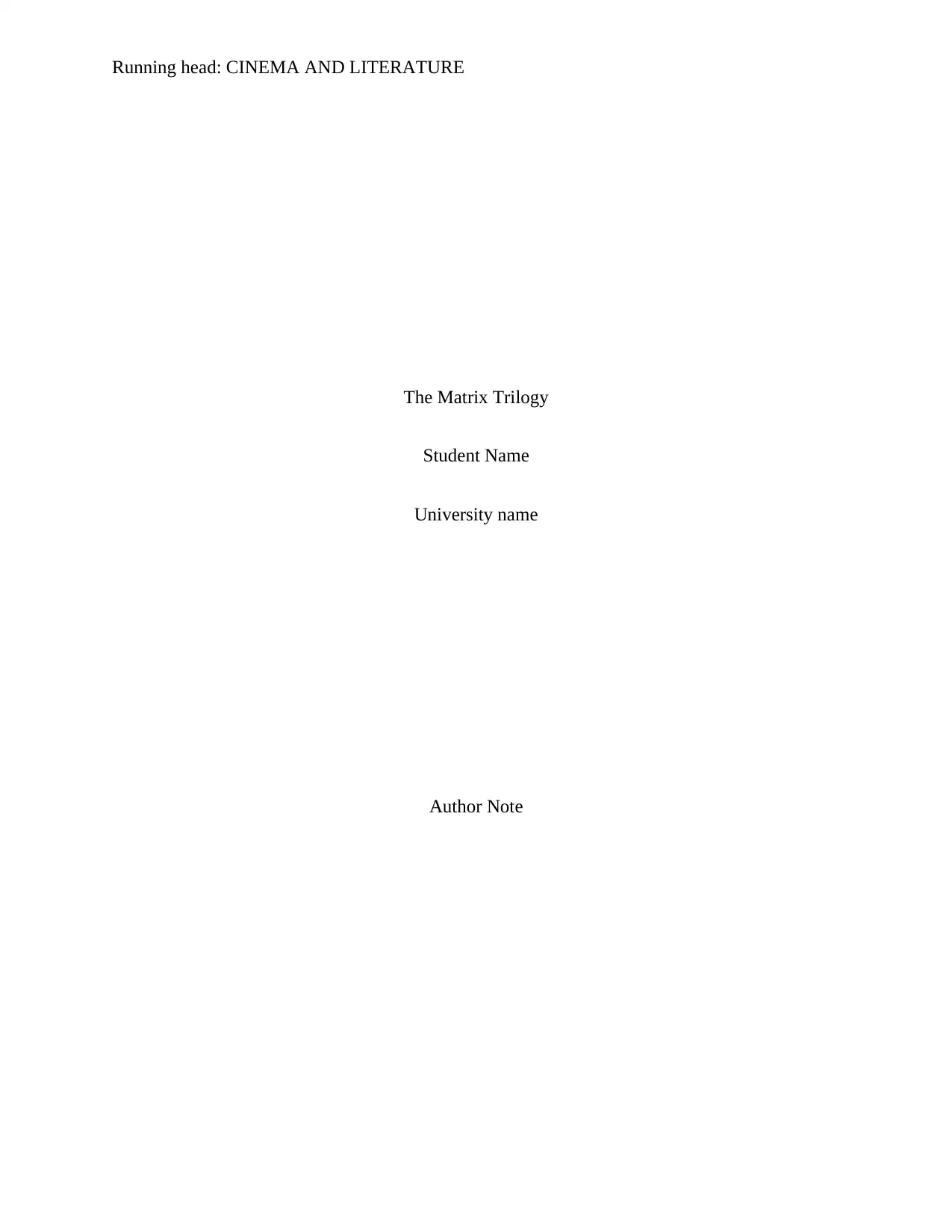
Running head: CINEMA AND LITERATURE
The Matrix Trilogy
Student Name
University name
Author Note
The Matrix Trilogy
Student Name
University name
Author Note
Secure Best Marks with AI Grader
Need help grading? Try our AI Grader for instant feedback on your assignments.
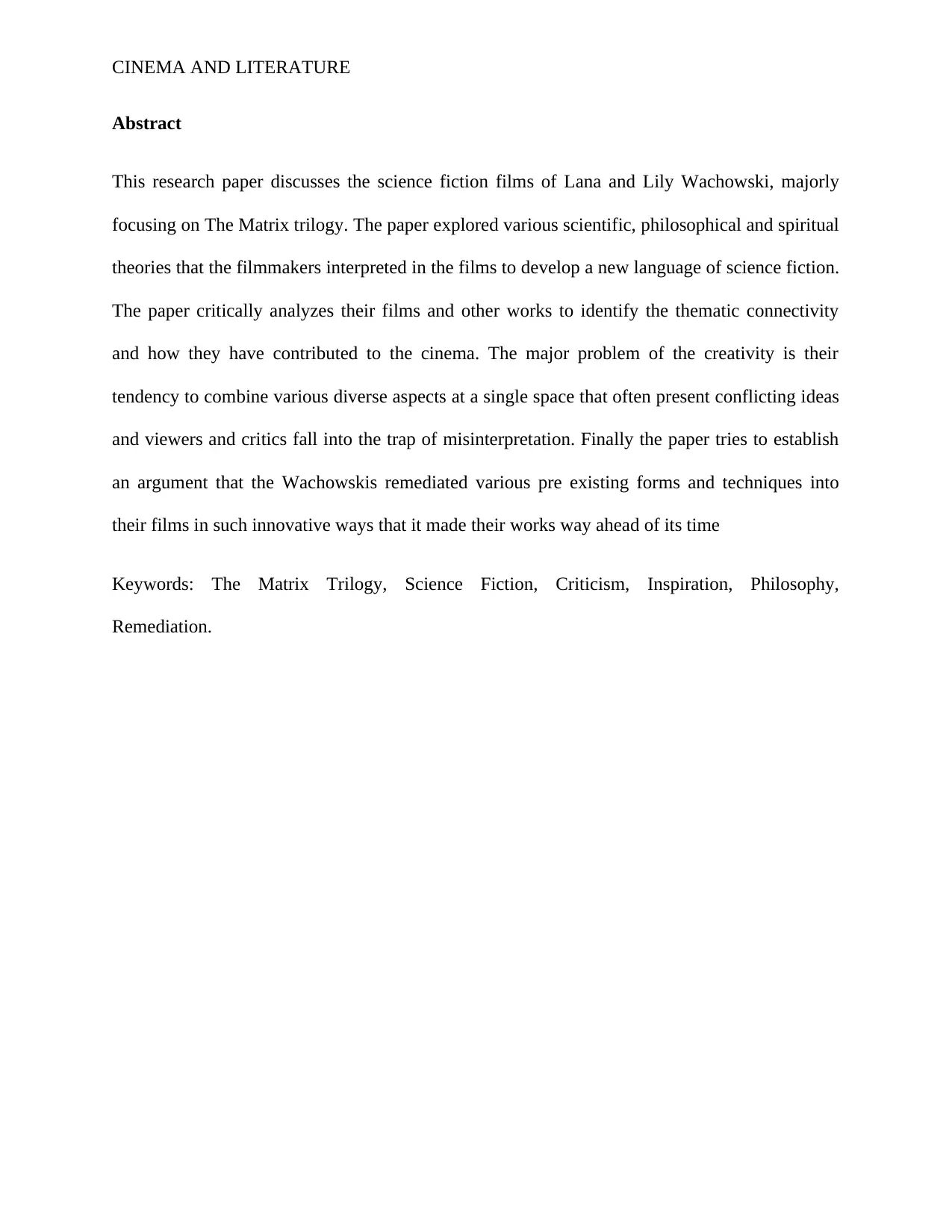
CINEMA AND LITERATURE
Abstract
This research paper discusses the science fiction films of Lana and Lily Wachowski, majorly
focusing on The Matrix trilogy. The paper explored various scientific, philosophical and spiritual
theories that the filmmakers interpreted in the films to develop a new language of science fiction.
The paper critically analyzes their films and other works to identify the thematic connectivity
and how they have contributed to the cinema. The major problem of the creativity is their
tendency to combine various diverse aspects at a single space that often present conflicting ideas
and viewers and critics fall into the trap of misinterpretation. Finally the paper tries to establish
an argument that the Wachowskis remediated various pre existing forms and techniques into
their films in such innovative ways that it made their works way ahead of its time
Keywords: The Matrix Trilogy, Science Fiction, Criticism, Inspiration, Philosophy,
Remediation.
Abstract
This research paper discusses the science fiction films of Lana and Lily Wachowski, majorly
focusing on The Matrix trilogy. The paper explored various scientific, philosophical and spiritual
theories that the filmmakers interpreted in the films to develop a new language of science fiction.
The paper critically analyzes their films and other works to identify the thematic connectivity
and how they have contributed to the cinema. The major problem of the creativity is their
tendency to combine various diverse aspects at a single space that often present conflicting ideas
and viewers and critics fall into the trap of misinterpretation. Finally the paper tries to establish
an argument that the Wachowskis remediated various pre existing forms and techniques into
their films in such innovative ways that it made their works way ahead of its time
Keywords: The Matrix Trilogy, Science Fiction, Criticism, Inspiration, Philosophy,
Remediation.
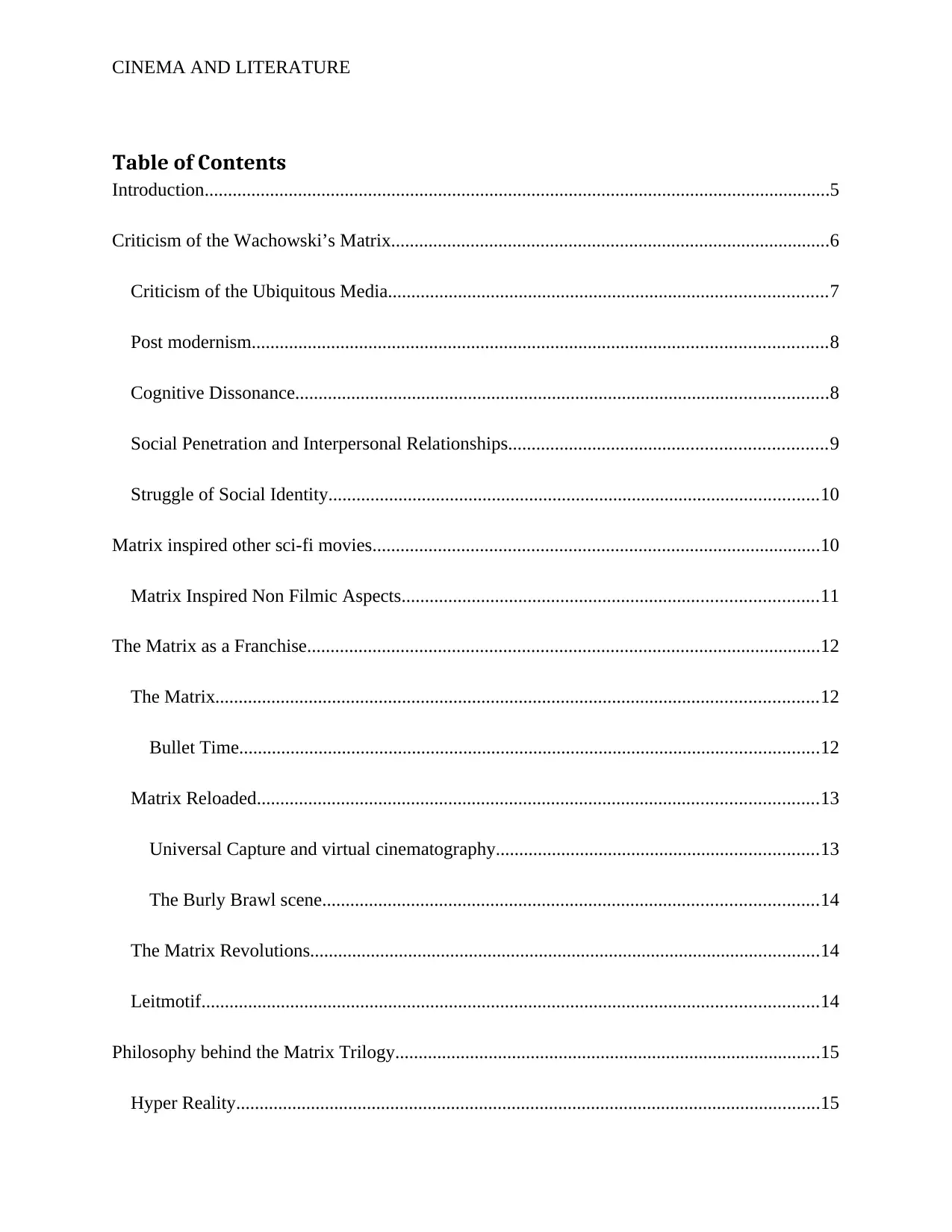
CINEMA AND LITERATURE
Table of Contents
Introduction......................................................................................................................................5
Criticism of the Wachowski’s Matrix..............................................................................................6
Criticism of the Ubiquitous Media..............................................................................................7
Post modernism...........................................................................................................................8
Cognitive Dissonance..................................................................................................................8
Social Penetration and Interpersonal Relationships....................................................................9
Struggle of Social Identity.........................................................................................................10
Matrix inspired other sci-fi movies................................................................................................10
Matrix Inspired Non Filmic Aspects.........................................................................................11
The Matrix as a Franchise..............................................................................................................12
The Matrix.................................................................................................................................12
Bullet Time............................................................................................................................12
Matrix Reloaded........................................................................................................................13
Universal Capture and virtual cinematography.....................................................................13
The Burly Brawl scene..........................................................................................................14
The Matrix Revolutions.............................................................................................................14
Leitmotif....................................................................................................................................14
Philosophy behind the Matrix Trilogy...........................................................................................15
Hyper Reality.............................................................................................................................15
Table of Contents
Introduction......................................................................................................................................5
Criticism of the Wachowski’s Matrix..............................................................................................6
Criticism of the Ubiquitous Media..............................................................................................7
Post modernism...........................................................................................................................8
Cognitive Dissonance..................................................................................................................8
Social Penetration and Interpersonal Relationships....................................................................9
Struggle of Social Identity.........................................................................................................10
Matrix inspired other sci-fi movies................................................................................................10
Matrix Inspired Non Filmic Aspects.........................................................................................11
The Matrix as a Franchise..............................................................................................................12
The Matrix.................................................................................................................................12
Bullet Time............................................................................................................................12
Matrix Reloaded........................................................................................................................13
Universal Capture and virtual cinematography.....................................................................13
The Burly Brawl scene..........................................................................................................14
The Matrix Revolutions.............................................................................................................14
Leitmotif....................................................................................................................................14
Philosophy behind the Matrix Trilogy...........................................................................................15
Hyper Reality.............................................................................................................................15
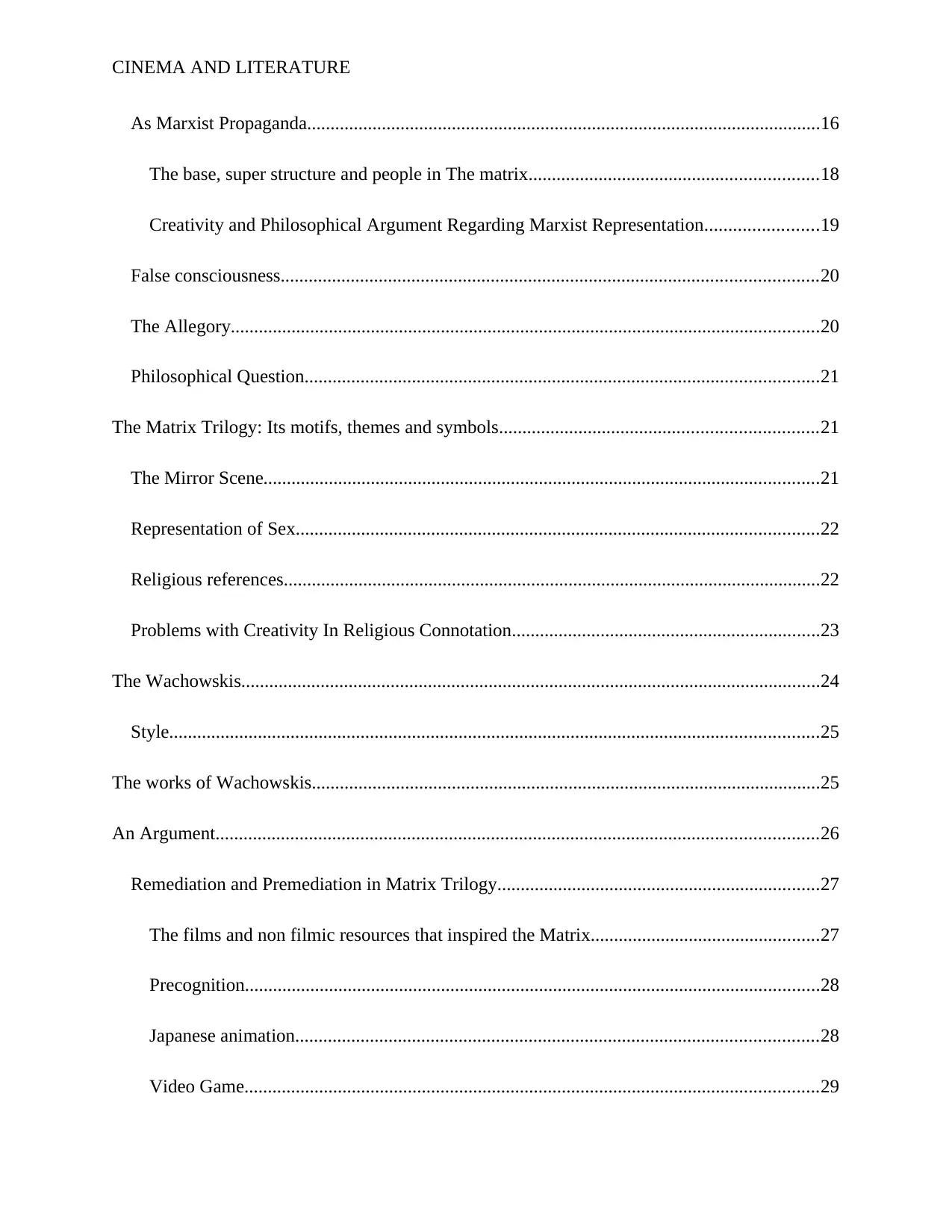
CINEMA AND LITERATURE
As Marxist Propaganda..............................................................................................................16
The base, super structure and people in The matrix..............................................................18
Creativity and Philosophical Argument Regarding Marxist Representation........................19
False consciousness...................................................................................................................20
The Allegory..............................................................................................................................20
Philosophical Question..............................................................................................................21
The Matrix Trilogy: Its motifs, themes and symbols....................................................................21
The Mirror Scene.......................................................................................................................21
Representation of Sex................................................................................................................22
Religious references...................................................................................................................22
Problems with Creativity In Religious Connotation..................................................................23
The Wachowskis............................................................................................................................24
Style...........................................................................................................................................25
The works of Wachowskis.............................................................................................................25
An Argument.................................................................................................................................26
Remediation and Premediation in Matrix Trilogy.....................................................................27
The films and non filmic resources that inspired the Matrix.................................................27
Precognition...........................................................................................................................28
Japanese animation................................................................................................................28
Video Game...........................................................................................................................29
As Marxist Propaganda..............................................................................................................16
The base, super structure and people in The matrix..............................................................18
Creativity and Philosophical Argument Regarding Marxist Representation........................19
False consciousness...................................................................................................................20
The Allegory..............................................................................................................................20
Philosophical Question..............................................................................................................21
The Matrix Trilogy: Its motifs, themes and symbols....................................................................21
The Mirror Scene.......................................................................................................................21
Representation of Sex................................................................................................................22
Religious references...................................................................................................................22
Problems with Creativity In Religious Connotation..................................................................23
The Wachowskis............................................................................................................................24
Style...........................................................................................................................................25
The works of Wachowskis.............................................................................................................25
An Argument.................................................................................................................................26
Remediation and Premediation in Matrix Trilogy.....................................................................27
The films and non filmic resources that inspired the Matrix.................................................27
Precognition...........................................................................................................................28
Japanese animation................................................................................................................28
Video Game...........................................................................................................................29
Paraphrase This Document
Need a fresh take? Get an instant paraphrase of this document with our AI Paraphraser
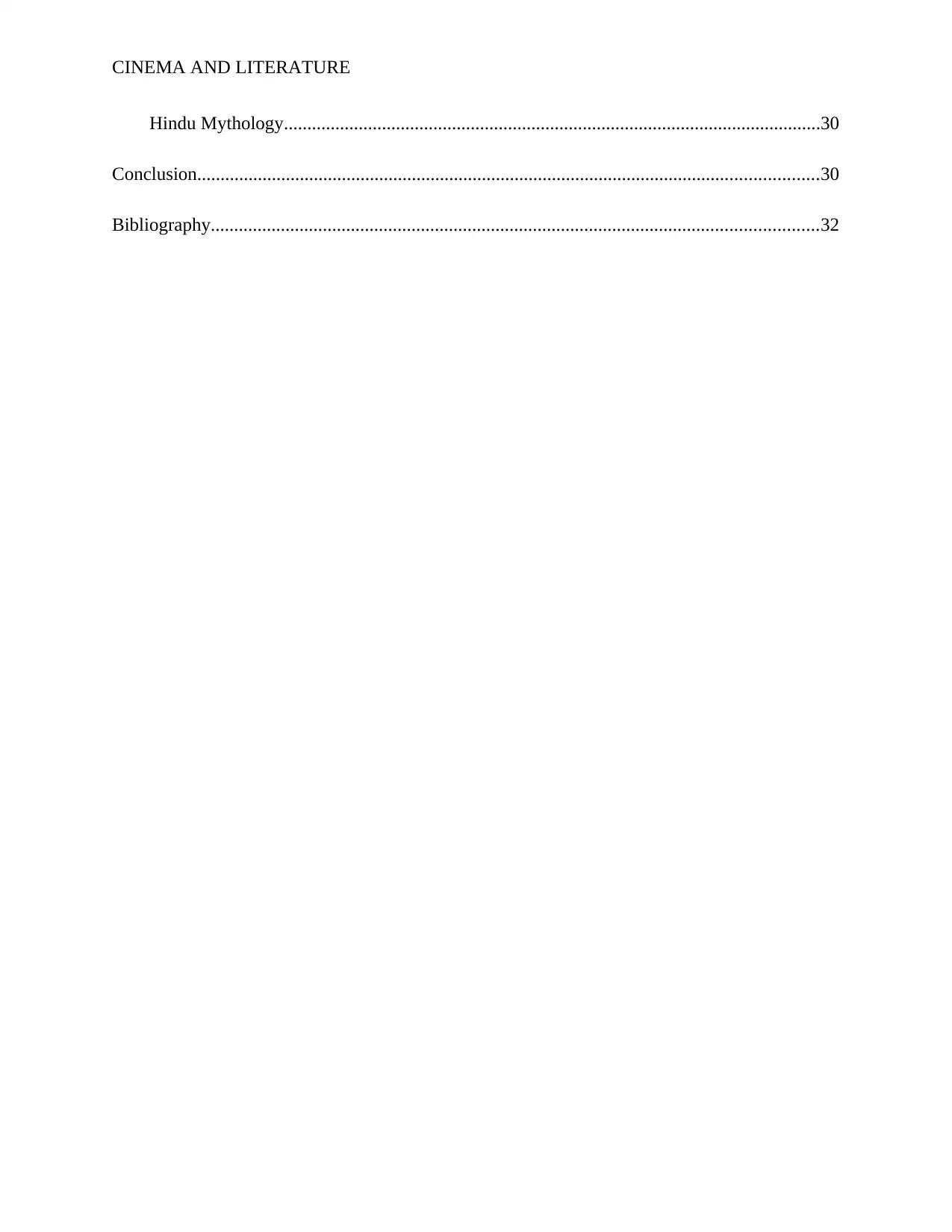
CINEMA AND LITERATURE
Hindu Mythology...................................................................................................................30
Conclusion.....................................................................................................................................30
Bibliography..................................................................................................................................32
Hindu Mythology...................................................................................................................30
Conclusion.....................................................................................................................................30
Bibliography..................................................................................................................................32
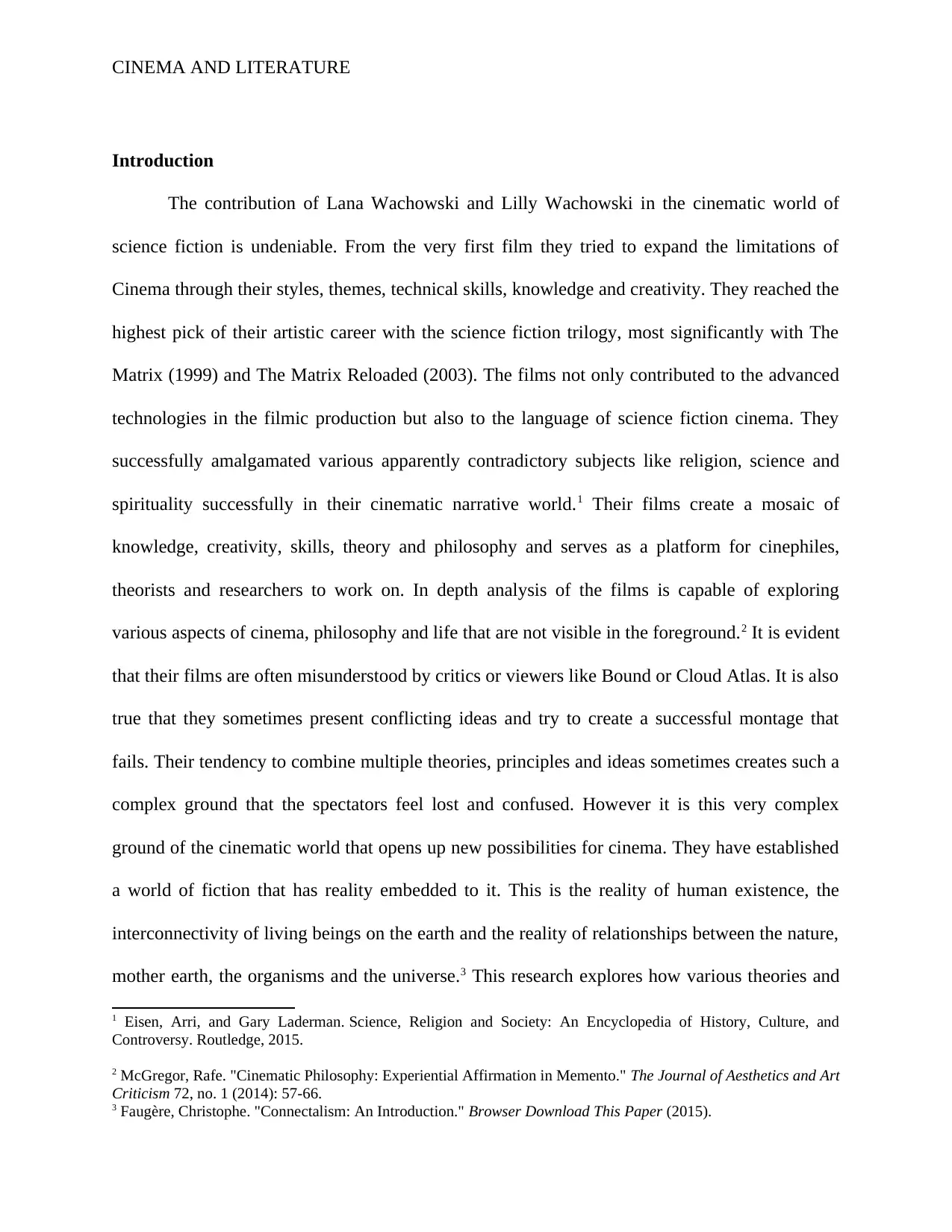
CINEMA AND LITERATURE
Introduction
The contribution of Lana Wachowski and Lilly Wachowski in the cinematic world of
science fiction is undeniable. From the very first film they tried to expand the limitations of
Cinema through their styles, themes, technical skills, knowledge and creativity. They reached the
highest pick of their artistic career with the science fiction trilogy, most significantly with The
Matrix (1999) and The Matrix Reloaded (2003). The films not only contributed to the advanced
technologies in the filmic production but also to the language of science fiction cinema. They
successfully amalgamated various apparently contradictory subjects like religion, science and
spirituality successfully in their cinematic narrative world.1 Their films create a mosaic of
knowledge, creativity, skills, theory and philosophy and serves as a platform for cinephiles,
theorists and researchers to work on. In depth analysis of the films is capable of exploring
various aspects of cinema, philosophy and life that are not visible in the foreground.2 It is evident
that their films are often misunderstood by critics or viewers like Bound or Cloud Atlas. It is also
true that they sometimes present conflicting ideas and try to create a successful montage that
fails. Their tendency to combine multiple theories, principles and ideas sometimes creates such a
complex ground that the spectators feel lost and confused. However it is this very complex
ground of the cinematic world that opens up new possibilities for cinema. They have established
a world of fiction that has reality embedded to it. This is the reality of human existence, the
interconnectivity of living beings on the earth and the reality of relationships between the nature,
mother earth, the organisms and the universe.3 This research explores how various theories and
1 Eisen, Arri, and Gary Laderman. Science, Religion and Society: An Encyclopedia of History, Culture, and
Controversy. Routledge, 2015.
2 McGregor, Rafe. "Cinematic Philosophy: Experiential Affirmation in Memento." The Journal of Aesthetics and Art
Criticism 72, no. 1 (2014): 57-66.
3 Faugère, Christophe. "Connectalism: An Introduction." Browser Download This Paper (2015).
Introduction
The contribution of Lana Wachowski and Lilly Wachowski in the cinematic world of
science fiction is undeniable. From the very first film they tried to expand the limitations of
Cinema through their styles, themes, technical skills, knowledge and creativity. They reached the
highest pick of their artistic career with the science fiction trilogy, most significantly with The
Matrix (1999) and The Matrix Reloaded (2003). The films not only contributed to the advanced
technologies in the filmic production but also to the language of science fiction cinema. They
successfully amalgamated various apparently contradictory subjects like religion, science and
spirituality successfully in their cinematic narrative world.1 Their films create a mosaic of
knowledge, creativity, skills, theory and philosophy and serves as a platform for cinephiles,
theorists and researchers to work on. In depth analysis of the films is capable of exploring
various aspects of cinema, philosophy and life that are not visible in the foreground.2 It is evident
that their films are often misunderstood by critics or viewers like Bound or Cloud Atlas. It is also
true that they sometimes present conflicting ideas and try to create a successful montage that
fails. Their tendency to combine multiple theories, principles and ideas sometimes creates such a
complex ground that the spectators feel lost and confused. However it is this very complex
ground of the cinematic world that opens up new possibilities for cinema. They have established
a world of fiction that has reality embedded to it. This is the reality of human existence, the
interconnectivity of living beings on the earth and the reality of relationships between the nature,
mother earth, the organisms and the universe.3 This research explores how various theories and
1 Eisen, Arri, and Gary Laderman. Science, Religion and Society: An Encyclopedia of History, Culture, and
Controversy. Routledge, 2015.
2 McGregor, Rafe. "Cinematic Philosophy: Experiential Affirmation in Memento." The Journal of Aesthetics and Art
Criticism 72, no. 1 (2014): 57-66.
3 Faugère, Christophe. "Connectalism: An Introduction." Browser Download This Paper (2015).
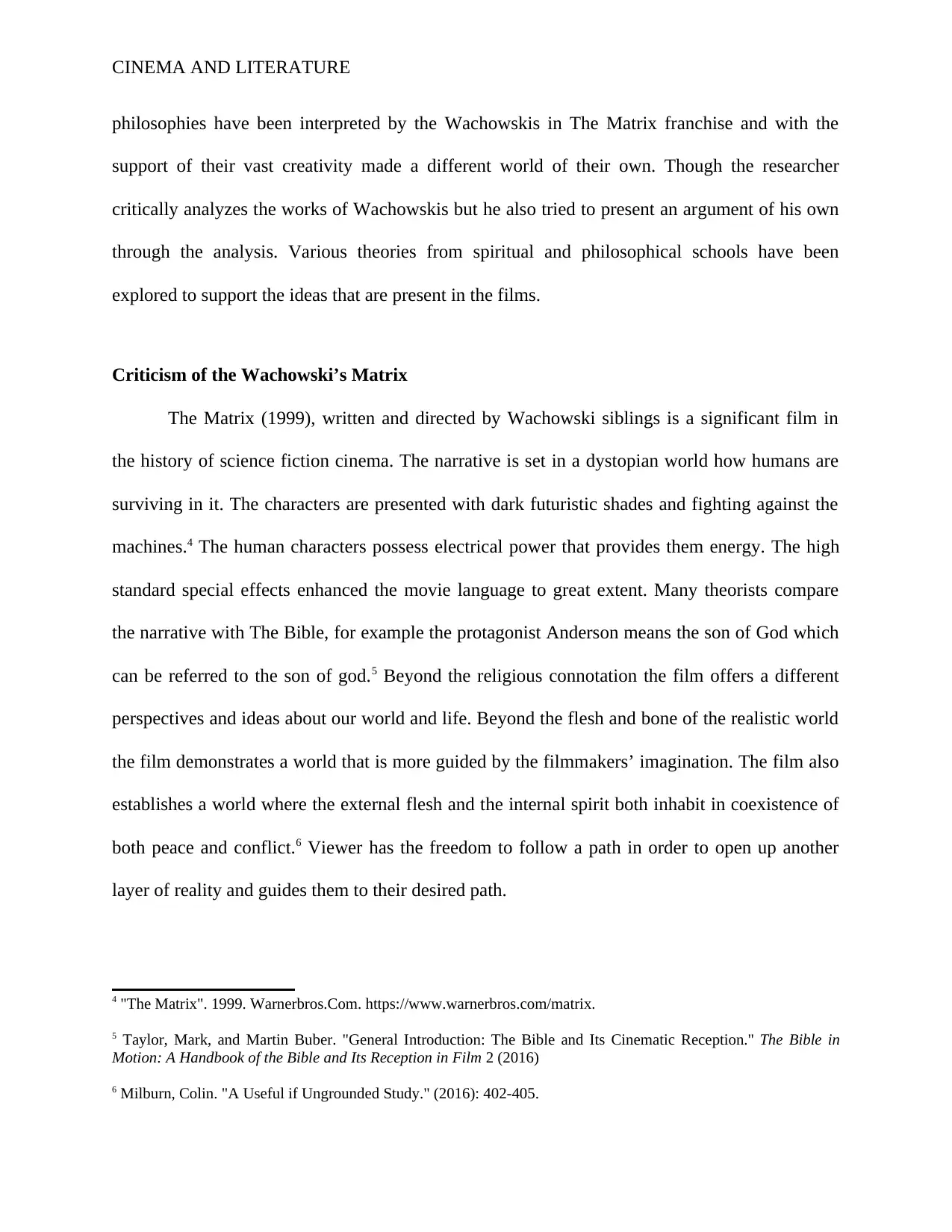
CINEMA AND LITERATURE
philosophies have been interpreted by the Wachowskis in The Matrix franchise and with the
support of their vast creativity made a different world of their own. Though the researcher
critically analyzes the works of Wachowskis but he also tried to present an argument of his own
through the analysis. Various theories from spiritual and philosophical schools have been
explored to support the ideas that are present in the films.
Criticism of the Wachowski’s Matrix
The Matrix (1999), written and directed by Wachowski siblings is a significant film in
the history of science fiction cinema. The narrative is set in a dystopian world how humans are
surviving in it. The characters are presented with dark futuristic shades and fighting against the
machines.4 The human characters possess electrical power that provides them energy. The high
standard special effects enhanced the movie language to great extent. Many theorists compare
the narrative with The Bible, for example the protagonist Anderson means the son of God which
can be referred to the son of god.5 Beyond the religious connotation the film offers a different
perspectives and ideas about our world and life. Beyond the flesh and bone of the realistic world
the film demonstrates a world that is more guided by the filmmakers’ imagination. The film also
establishes a world where the external flesh and the internal spirit both inhabit in coexistence of
both peace and conflict.6 Viewer has the freedom to follow a path in order to open up another
layer of reality and guides them to their desired path.
4 "The Matrix". 1999. Warnerbros.Com. https://www.warnerbros.com/matrix.
5 Taylor, Mark, and Martin Buber. "General Introduction: The Bible and Its Cinematic Reception." The Bible in
Motion: A Handbook of the Bible and Its Reception in Film 2 (2016)
6 Milburn, Colin. "A Useful if Ungrounded Study." (2016): 402-405.
philosophies have been interpreted by the Wachowskis in The Matrix franchise and with the
support of their vast creativity made a different world of their own. Though the researcher
critically analyzes the works of Wachowskis but he also tried to present an argument of his own
through the analysis. Various theories from spiritual and philosophical schools have been
explored to support the ideas that are present in the films.
Criticism of the Wachowski’s Matrix
The Matrix (1999), written and directed by Wachowski siblings is a significant film in
the history of science fiction cinema. The narrative is set in a dystopian world how humans are
surviving in it. The characters are presented with dark futuristic shades and fighting against the
machines.4 The human characters possess electrical power that provides them energy. The high
standard special effects enhanced the movie language to great extent. Many theorists compare
the narrative with The Bible, for example the protagonist Anderson means the son of God which
can be referred to the son of god.5 Beyond the religious connotation the film offers a different
perspectives and ideas about our world and life. Beyond the flesh and bone of the realistic world
the film demonstrates a world that is more guided by the filmmakers’ imagination. The film also
establishes a world where the external flesh and the internal spirit both inhabit in coexistence of
both peace and conflict.6 Viewer has the freedom to follow a path in order to open up another
layer of reality and guides them to their desired path.
4 "The Matrix". 1999. Warnerbros.Com. https://www.warnerbros.com/matrix.
5 Taylor, Mark, and Martin Buber. "General Introduction: The Bible and Its Cinematic Reception." The Bible in
Motion: A Handbook of the Bible and Its Reception in Film 2 (2016)
6 Milburn, Colin. "A Useful if Ungrounded Study." (2016): 402-405.
Secure Best Marks with AI Grader
Need help grading? Try our AI Grader for instant feedback on your assignments.
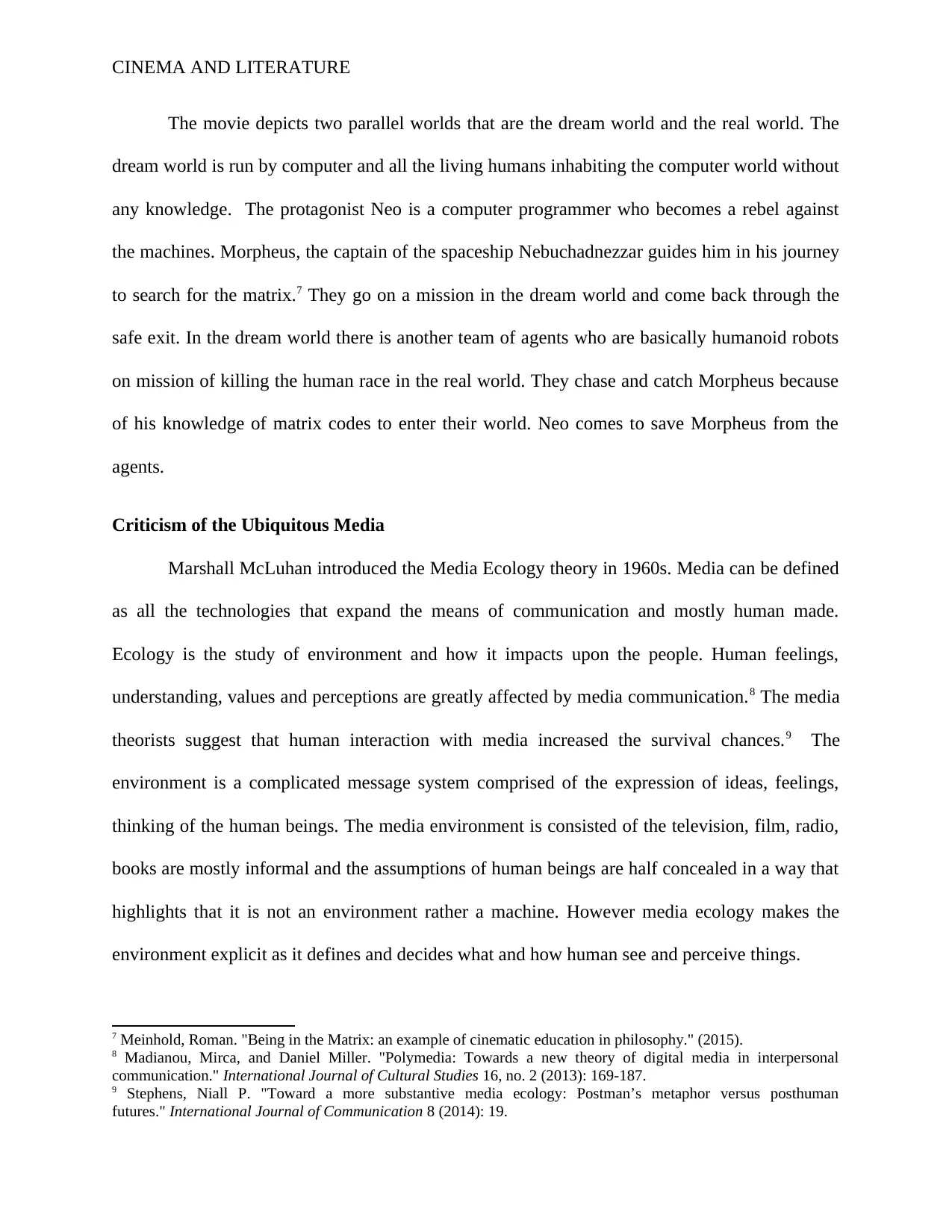
CINEMA AND LITERATURE
The movie depicts two parallel worlds that are the dream world and the real world. The
dream world is run by computer and all the living humans inhabiting the computer world without
any knowledge. The protagonist Neo is a computer programmer who becomes a rebel against
the machines. Morpheus, the captain of the spaceship Nebuchadnezzar guides him in his journey
to search for the matrix.7 They go on a mission in the dream world and come back through the
safe exit. In the dream world there is another team of agents who are basically humanoid robots
on mission of killing the human race in the real world. They chase and catch Morpheus because
of his knowledge of matrix codes to enter their world. Neo comes to save Morpheus from the
agents.
Criticism of the Ubiquitous Media
Marshall McLuhan introduced the Media Ecology theory in 1960s. Media can be defined
as all the technologies that expand the means of communication and mostly human made.
Ecology is the study of environment and how it impacts upon the people. Human feelings,
understanding, values and perceptions are greatly affected by media communication.8 The media
theorists suggest that human interaction with media increased the survival chances.9 The
environment is a complicated message system comprised of the expression of ideas, feelings,
thinking of the human beings. The media environment is consisted of the television, film, radio,
books are mostly informal and the assumptions of human beings are half concealed in a way that
highlights that it is not an environment rather a machine. However media ecology makes the
environment explicit as it defines and decides what and how human see and perceive things.
7 Meinhold, Roman. "Being in the Matrix: an example of cinematic education in philosophy." (2015).
8 Madianou, Mirca, and Daniel Miller. "Polymedia: Towards a new theory of digital media in interpersonal
communication." International Journal of Cultural Studies 16, no. 2 (2013): 169-187.
9 Stephens, Niall P. "Toward a more substantive media ecology: Postman’s metaphor versus posthuman
futures." International Journal of Communication 8 (2014): 19.
The movie depicts two parallel worlds that are the dream world and the real world. The
dream world is run by computer and all the living humans inhabiting the computer world without
any knowledge. The protagonist Neo is a computer programmer who becomes a rebel against
the machines. Morpheus, the captain of the spaceship Nebuchadnezzar guides him in his journey
to search for the matrix.7 They go on a mission in the dream world and come back through the
safe exit. In the dream world there is another team of agents who are basically humanoid robots
on mission of killing the human race in the real world. They chase and catch Morpheus because
of his knowledge of matrix codes to enter their world. Neo comes to save Morpheus from the
agents.
Criticism of the Ubiquitous Media
Marshall McLuhan introduced the Media Ecology theory in 1960s. Media can be defined
as all the technologies that expand the means of communication and mostly human made.
Ecology is the study of environment and how it impacts upon the people. Human feelings,
understanding, values and perceptions are greatly affected by media communication.8 The media
theorists suggest that human interaction with media increased the survival chances.9 The
environment is a complicated message system comprised of the expression of ideas, feelings,
thinking of the human beings. The media environment is consisted of the television, film, radio,
books are mostly informal and the assumptions of human beings are half concealed in a way that
highlights that it is not an environment rather a machine. However media ecology makes the
environment explicit as it defines and decides what and how human see and perceive things.
7 Meinhold, Roman. "Being in the Matrix: an example of cinematic education in philosophy." (2015).
8 Madianou, Mirca, and Daniel Miller. "Polymedia: Towards a new theory of digital media in interpersonal
communication." International Journal of Cultural Studies 16, no. 2 (2013): 169-187.
9 Stephens, Niall P. "Toward a more substantive media ecology: Postman’s metaphor versus posthuman
futures." International Journal of Communication 8 (2014): 19.
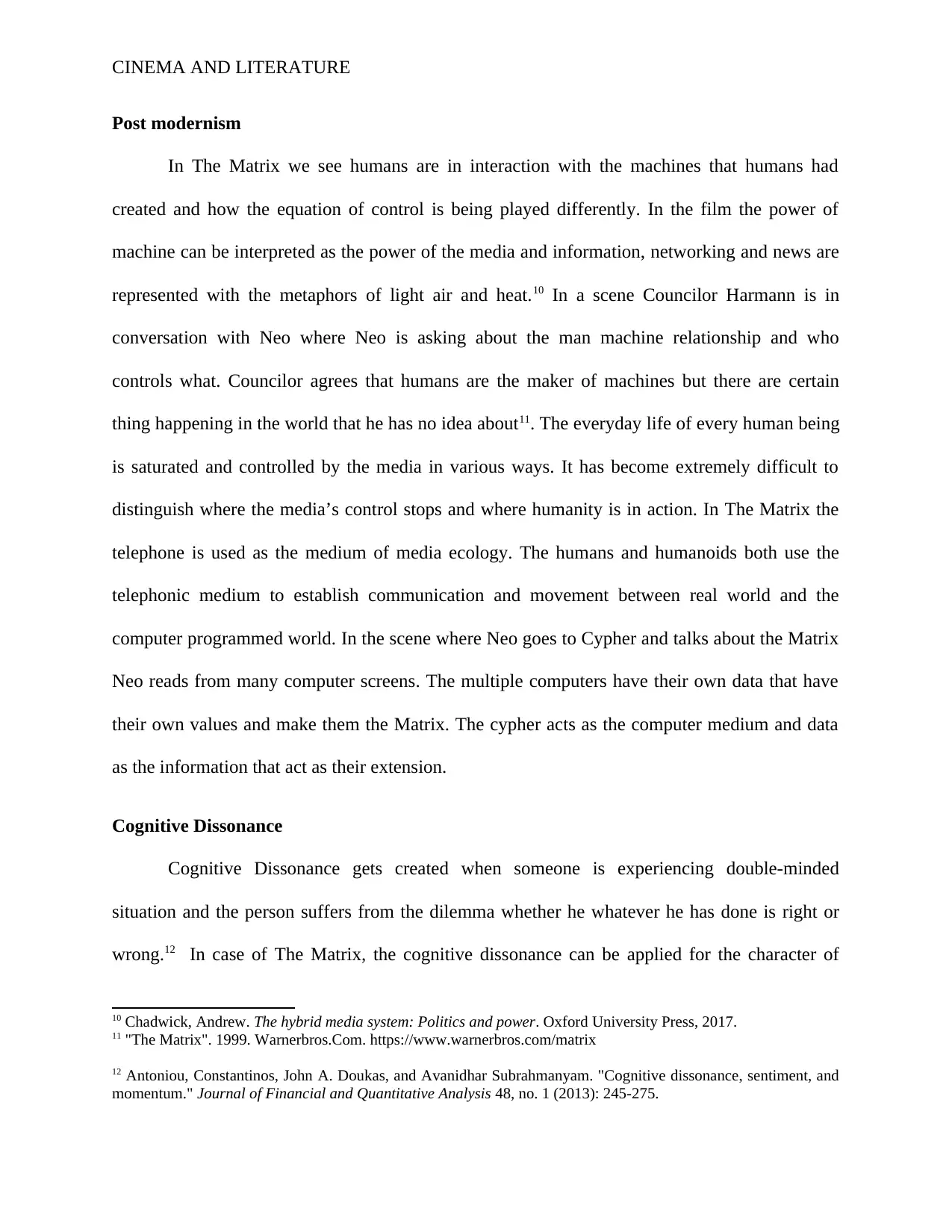
CINEMA AND LITERATURE
Post modernism
In The Matrix we see humans are in interaction with the machines that humans had
created and how the equation of control is being played differently. In the film the power of
machine can be interpreted as the power of the media and information, networking and news are
represented with the metaphors of light air and heat.10 In a scene Councilor Harmann is in
conversation with Neo where Neo is asking about the man machine relationship and who
controls what. Councilor agrees that humans are the maker of machines but there are certain
thing happening in the world that he has no idea about11. The everyday life of every human being
is saturated and controlled by the media in various ways. It has become extremely difficult to
distinguish where the media’s control stops and where humanity is in action. In The Matrix the
telephone is used as the medium of media ecology. The humans and humanoids both use the
telephonic medium to establish communication and movement between real world and the
computer programmed world. In the scene where Neo goes to Cypher and talks about the Matrix
Neo reads from many computer screens. The multiple computers have their own data that have
their own values and make them the Matrix. The cypher acts as the computer medium and data
as the information that act as their extension.
Cognitive Dissonance
Cognitive Dissonance gets created when someone is experiencing double-minded
situation and the person suffers from the dilemma whether he whatever he has done is right or
wrong.12 In case of The Matrix, the cognitive dissonance can be applied for the character of
10 Chadwick, Andrew. The hybrid media system: Politics and power. Oxford University Press, 2017.
11 "The Matrix". 1999. Warnerbros.Com. https://www.warnerbros.com/matrix
12 Antoniou, Constantinos, John A. Doukas, and Avanidhar Subrahmanyam. "Cognitive dissonance, sentiment, and
momentum." Journal of Financial and Quantitative Analysis 48, no. 1 (2013): 245-275.
Post modernism
In The Matrix we see humans are in interaction with the machines that humans had
created and how the equation of control is being played differently. In the film the power of
machine can be interpreted as the power of the media and information, networking and news are
represented with the metaphors of light air and heat.10 In a scene Councilor Harmann is in
conversation with Neo where Neo is asking about the man machine relationship and who
controls what. Councilor agrees that humans are the maker of machines but there are certain
thing happening in the world that he has no idea about11. The everyday life of every human being
is saturated and controlled by the media in various ways. It has become extremely difficult to
distinguish where the media’s control stops and where humanity is in action. In The Matrix the
telephone is used as the medium of media ecology. The humans and humanoids both use the
telephonic medium to establish communication and movement between real world and the
computer programmed world. In the scene where Neo goes to Cypher and talks about the Matrix
Neo reads from many computer screens. The multiple computers have their own data that have
their own values and make them the Matrix. The cypher acts as the computer medium and data
as the information that act as their extension.
Cognitive Dissonance
Cognitive Dissonance gets created when someone is experiencing double-minded
situation and the person suffers from the dilemma whether he whatever he has done is right or
wrong.12 In case of The Matrix, the cognitive dissonance can be applied for the character of
10 Chadwick, Andrew. The hybrid media system: Politics and power. Oxford University Press, 2017.
11 "The Matrix". 1999. Warnerbros.Com. https://www.warnerbros.com/matrix
12 Antoniou, Constantinos, John A. Doukas, and Avanidhar Subrahmanyam. "Cognitive dissonance, sentiment, and
momentum." Journal of Financial and Quantitative Analysis 48, no. 1 (2013): 245-275.
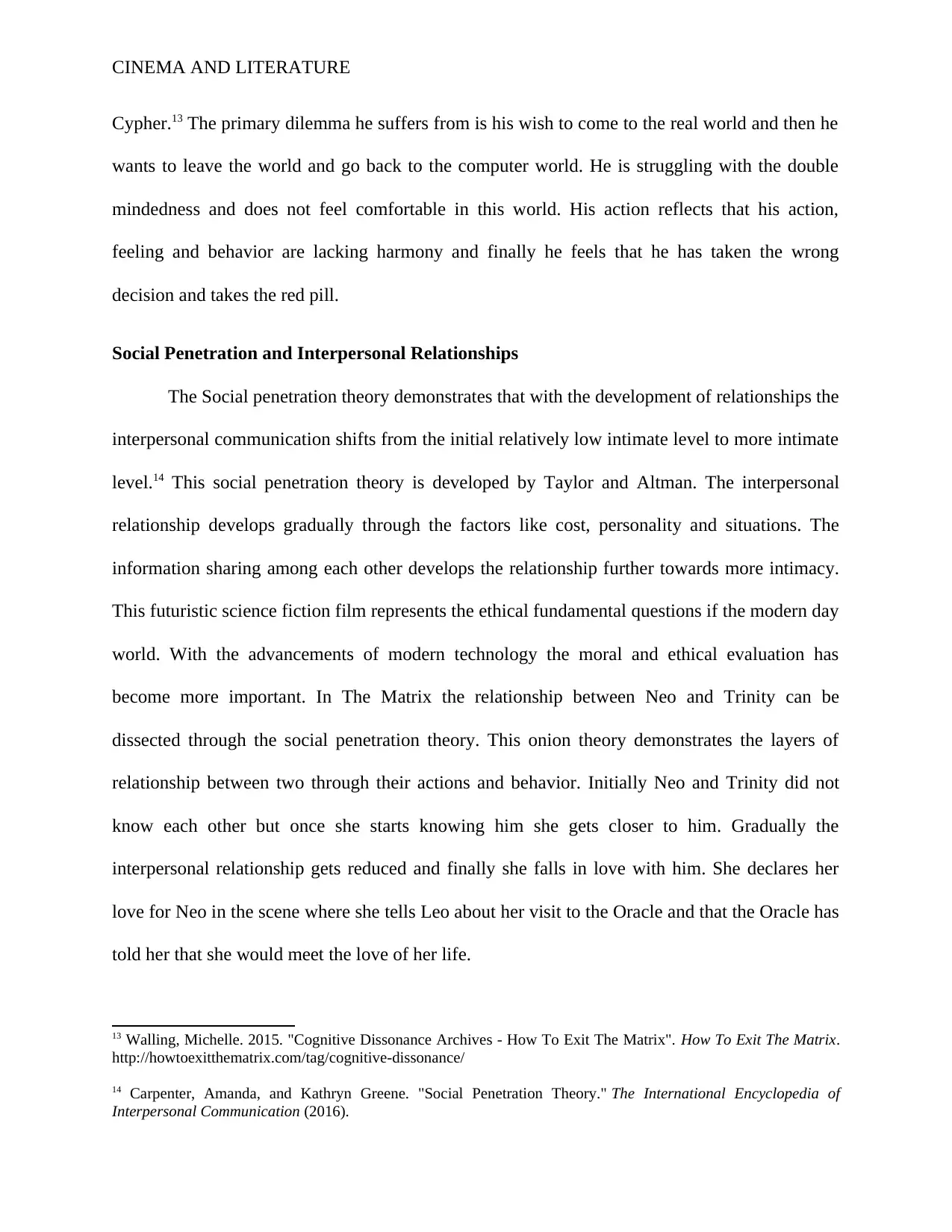
CINEMA AND LITERATURE
Cypher.13 The primary dilemma he suffers from is his wish to come to the real world and then he
wants to leave the world and go back to the computer world. He is struggling with the double
mindedness and does not feel comfortable in this world. His action reflects that his action,
feeling and behavior are lacking harmony and finally he feels that he has taken the wrong
decision and takes the red pill.
Social Penetration and Interpersonal Relationships
The Social penetration theory demonstrates that with the development of relationships the
interpersonal communication shifts from the initial relatively low intimate level to more intimate
level.14 This social penetration theory is developed by Taylor and Altman. The interpersonal
relationship develops gradually through the factors like cost, personality and situations. The
information sharing among each other develops the relationship further towards more intimacy.
This futuristic science fiction film represents the ethical fundamental questions if the modern day
world. With the advancements of modern technology the moral and ethical evaluation has
become more important. In The Matrix the relationship between Neo and Trinity can be
dissected through the social penetration theory. This onion theory demonstrates the layers of
relationship between two through their actions and behavior. Initially Neo and Trinity did not
know each other but once she starts knowing him she gets closer to him. Gradually the
interpersonal relationship gets reduced and finally she falls in love with him. She declares her
love for Neo in the scene where she tells Leo about her visit to the Oracle and that the Oracle has
told her that she would meet the love of her life.
13 Walling, Michelle. 2015. "Cognitive Dissonance Archives - How To Exit The Matrix". How To Exit The Matrix.
http://howtoexitthematrix.com/tag/cognitive-dissonance/
14 Carpenter, Amanda, and Kathryn Greene. "Social Penetration Theory." The International Encyclopedia of
Interpersonal Communication (2016).
Cypher.13 The primary dilemma he suffers from is his wish to come to the real world and then he
wants to leave the world and go back to the computer world. He is struggling with the double
mindedness and does not feel comfortable in this world. His action reflects that his action,
feeling and behavior are lacking harmony and finally he feels that he has taken the wrong
decision and takes the red pill.
Social Penetration and Interpersonal Relationships
The Social penetration theory demonstrates that with the development of relationships the
interpersonal communication shifts from the initial relatively low intimate level to more intimate
level.14 This social penetration theory is developed by Taylor and Altman. The interpersonal
relationship develops gradually through the factors like cost, personality and situations. The
information sharing among each other develops the relationship further towards more intimacy.
This futuristic science fiction film represents the ethical fundamental questions if the modern day
world. With the advancements of modern technology the moral and ethical evaluation has
become more important. In The Matrix the relationship between Neo and Trinity can be
dissected through the social penetration theory. This onion theory demonstrates the layers of
relationship between two through their actions and behavior. Initially Neo and Trinity did not
know each other but once she starts knowing him she gets closer to him. Gradually the
interpersonal relationship gets reduced and finally she falls in love with him. She declares her
love for Neo in the scene where she tells Leo about her visit to the Oracle and that the Oracle has
told her that she would meet the love of her life.
13 Walling, Michelle. 2015. "Cognitive Dissonance Archives - How To Exit The Matrix". How To Exit The Matrix.
http://howtoexitthematrix.com/tag/cognitive-dissonance/
14 Carpenter, Amanda, and Kathryn Greene. "Social Penetration Theory." The International Encyclopedia of
Interpersonal Communication (2016).
Paraphrase This Document
Need a fresh take? Get an instant paraphrase of this document with our AI Paraphraser
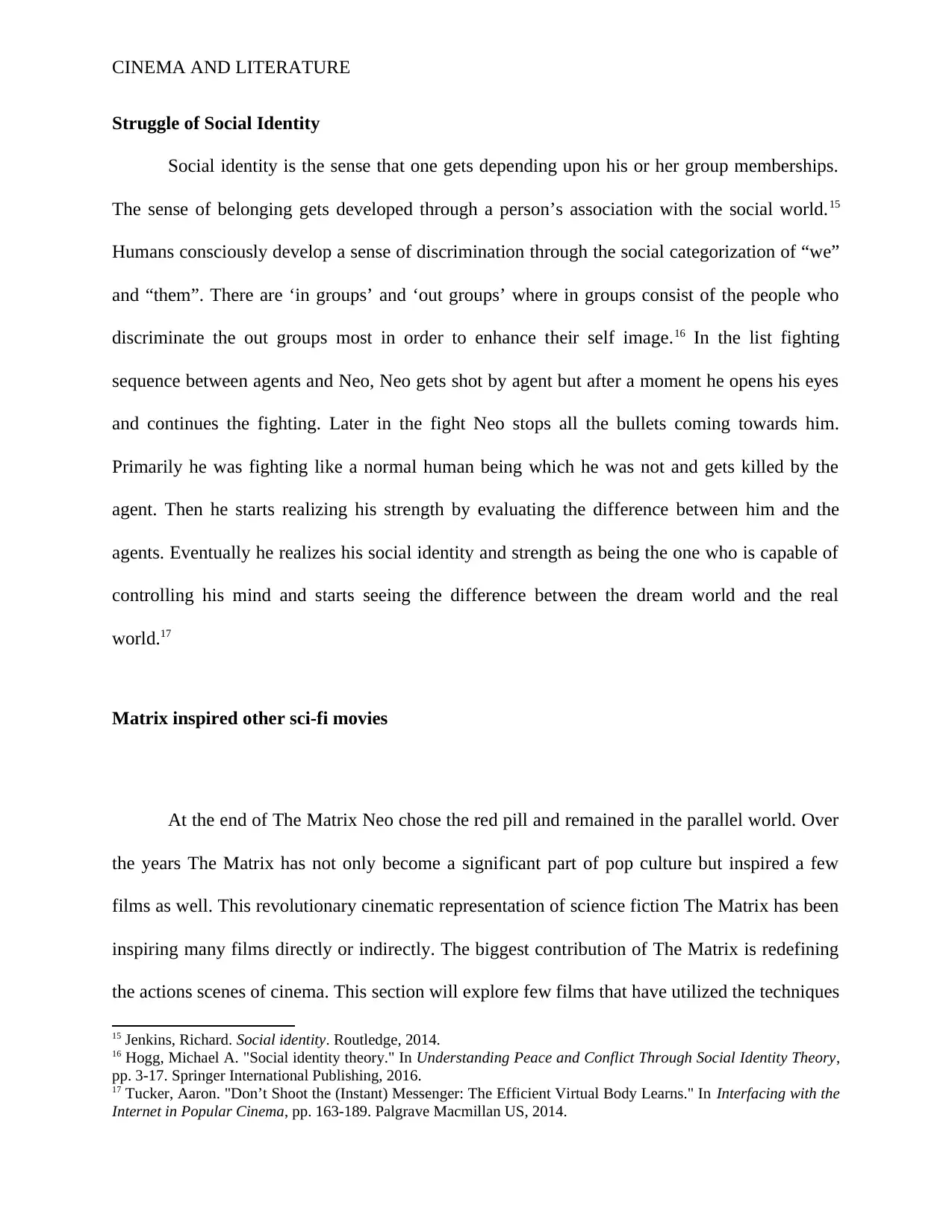
CINEMA AND LITERATURE
Struggle of Social Identity
Social identity is the sense that one gets depending upon his or her group memberships.
The sense of belonging gets developed through a person’s association with the social world.15
Humans consciously develop a sense of discrimination through the social categorization of “we”
and “them”. There are ‘in groups’ and ‘out groups’ where in groups consist of the people who
discriminate the out groups most in order to enhance their self image.16 In the list fighting
sequence between agents and Neo, Neo gets shot by agent but after a moment he opens his eyes
and continues the fighting. Later in the fight Neo stops all the bullets coming towards him.
Primarily he was fighting like a normal human being which he was not and gets killed by the
agent. Then he starts realizing his strength by evaluating the difference between him and the
agents. Eventually he realizes his social identity and strength as being the one who is capable of
controlling his mind and starts seeing the difference between the dream world and the real
world.17
Matrix inspired other sci-fi movies
At the end of The Matrix Neo chose the red pill and remained in the parallel world. Over
the years The Matrix has not only become a significant part of pop culture but inspired a few
films as well. This revolutionary cinematic representation of science fiction The Matrix has been
inspiring many films directly or indirectly. The biggest contribution of The Matrix is redefining
the actions scenes of cinema. This section will explore few films that have utilized the techniques
15 Jenkins, Richard. Social identity. Routledge, 2014.
16 Hogg, Michael A. "Social identity theory." In Understanding Peace and Conflict Through Social Identity Theory,
pp. 3-17. Springer International Publishing, 2016.
17 Tucker, Aaron. "Don’t Shoot the (Instant) Messenger: The Efficient Virtual Body Learns." In Interfacing with the
Internet in Popular Cinema, pp. 163-189. Palgrave Macmillan US, 2014.
Struggle of Social Identity
Social identity is the sense that one gets depending upon his or her group memberships.
The sense of belonging gets developed through a person’s association with the social world.15
Humans consciously develop a sense of discrimination through the social categorization of “we”
and “them”. There are ‘in groups’ and ‘out groups’ where in groups consist of the people who
discriminate the out groups most in order to enhance their self image.16 In the list fighting
sequence between agents and Neo, Neo gets shot by agent but after a moment he opens his eyes
and continues the fighting. Later in the fight Neo stops all the bullets coming towards him.
Primarily he was fighting like a normal human being which he was not and gets killed by the
agent. Then he starts realizing his strength by evaluating the difference between him and the
agents. Eventually he realizes his social identity and strength as being the one who is capable of
controlling his mind and starts seeing the difference between the dream world and the real
world.17
Matrix inspired other sci-fi movies
At the end of The Matrix Neo chose the red pill and remained in the parallel world. Over
the years The Matrix has not only become a significant part of pop culture but inspired a few
films as well. This revolutionary cinematic representation of science fiction The Matrix has been
inspiring many films directly or indirectly. The biggest contribution of The Matrix is redefining
the actions scenes of cinema. This section will explore few films that have utilized the techniques
15 Jenkins, Richard. Social identity. Routledge, 2014.
16 Hogg, Michael A. "Social identity theory." In Understanding Peace and Conflict Through Social Identity Theory,
pp. 3-17. Springer International Publishing, 2016.
17 Tucker, Aaron. "Don’t Shoot the (Instant) Messenger: The Efficient Virtual Body Learns." In Interfacing with the
Internet in Popular Cinema, pp. 163-189. Palgrave Macmillan US, 2014.
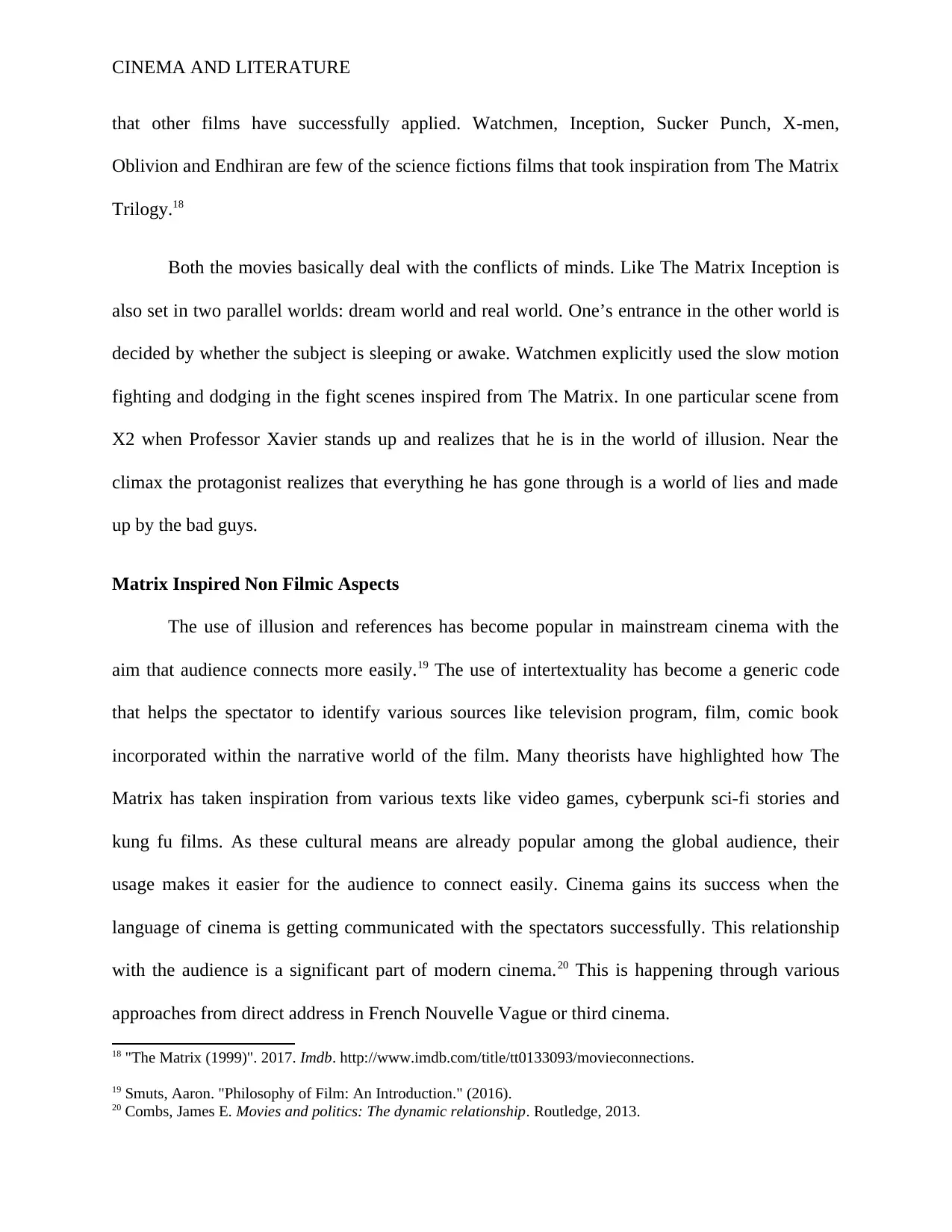
CINEMA AND LITERATURE
that other films have successfully applied. Watchmen, Inception, Sucker Punch, X-men,
Oblivion and Endhiran are few of the science fictions films that took inspiration from The Matrix
Trilogy.18
Both the movies basically deal with the conflicts of minds. Like The Matrix Inception is
also set in two parallel worlds: dream world and real world. One’s entrance in the other world is
decided by whether the subject is sleeping or awake. Watchmen explicitly used the slow motion
fighting and dodging in the fight scenes inspired from The Matrix. In one particular scene from
X2 when Professor Xavier stands up and realizes that he is in the world of illusion. Near the
climax the protagonist realizes that everything he has gone through is a world of lies and made
up by the bad guys.
Matrix Inspired Non Filmic Aspects
The use of illusion and references has become popular in mainstream cinema with the
aim that audience connects more easily.19 The use of intertextuality has become a generic code
that helps the spectator to identify various sources like television program, film, comic book
incorporated within the narrative world of the film. Many theorists have highlighted how The
Matrix has taken inspiration from various texts like video games, cyberpunk sci-fi stories and
kung fu films. As these cultural means are already popular among the global audience, their
usage makes it easier for the audience to connect easily. Cinema gains its success when the
language of cinema is getting communicated with the spectators successfully. This relationship
with the audience is a significant part of modern cinema.20 This is happening through various
approaches from direct address in French Nouvelle Vague or third cinema.
18 "The Matrix (1999)". 2017. Imdb. http://www.imdb.com/title/tt0133093/movieconnections.
19 Smuts, Aaron. "Philosophy of Film: An Introduction." (2016).
20 Combs, James E. Movies and politics: The dynamic relationship. Routledge, 2013.
that other films have successfully applied. Watchmen, Inception, Sucker Punch, X-men,
Oblivion and Endhiran are few of the science fictions films that took inspiration from The Matrix
Trilogy.18
Both the movies basically deal with the conflicts of minds. Like The Matrix Inception is
also set in two parallel worlds: dream world and real world. One’s entrance in the other world is
decided by whether the subject is sleeping or awake. Watchmen explicitly used the slow motion
fighting and dodging in the fight scenes inspired from The Matrix. In one particular scene from
X2 when Professor Xavier stands up and realizes that he is in the world of illusion. Near the
climax the protagonist realizes that everything he has gone through is a world of lies and made
up by the bad guys.
Matrix Inspired Non Filmic Aspects
The use of illusion and references has become popular in mainstream cinema with the
aim that audience connects more easily.19 The use of intertextuality has become a generic code
that helps the spectator to identify various sources like television program, film, comic book
incorporated within the narrative world of the film. Many theorists have highlighted how The
Matrix has taken inspiration from various texts like video games, cyberpunk sci-fi stories and
kung fu films. As these cultural means are already popular among the global audience, their
usage makes it easier for the audience to connect easily. Cinema gains its success when the
language of cinema is getting communicated with the spectators successfully. This relationship
with the audience is a significant part of modern cinema.20 This is happening through various
approaches from direct address in French Nouvelle Vague or third cinema.
18 "The Matrix (1999)". 2017. Imdb. http://www.imdb.com/title/tt0133093/movieconnections.
19 Smuts, Aaron. "Philosophy of Film: An Introduction." (2016).
20 Combs, James E. Movies and politics: The dynamic relationship. Routledge, 2013.
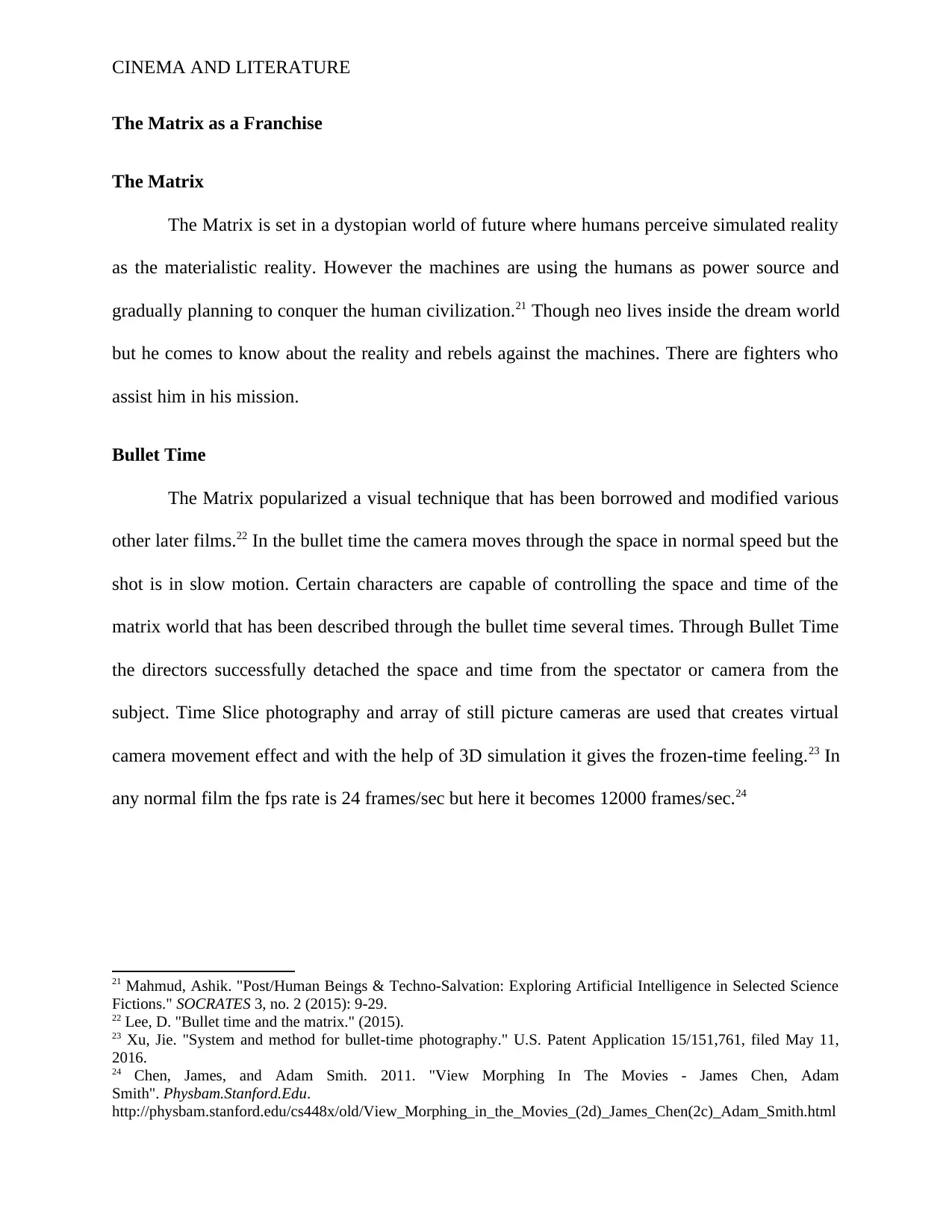
CINEMA AND LITERATURE
The Matrix as a Franchise
The Matrix
The Matrix is set in a dystopian world of future where humans perceive simulated reality
as the materialistic reality. However the machines are using the humans as power source and
gradually planning to conquer the human civilization.21 Though neo lives inside the dream world
but he comes to know about the reality and rebels against the machines. There are fighters who
assist him in his mission.
Bullet Time
The Matrix popularized a visual technique that has been borrowed and modified various
other later films.22 In the bullet time the camera moves through the space in normal speed but the
shot is in slow motion. Certain characters are capable of controlling the space and time of the
matrix world that has been described through the bullet time several times. Through Bullet Time
the directors successfully detached the space and time from the spectator or camera from the
subject. Time Slice photography and array of still picture cameras are used that creates virtual
camera movement effect and with the help of 3D simulation it gives the frozen-time feeling.23 In
any normal film the fps rate is 24 frames/sec but here it becomes 12000 frames/sec.24
21 Mahmud, Ashik. "Post/Human Beings & Techno-Salvation: Exploring Artificial Intelligence in Selected Science
Fictions." SOCRATES 3, no. 2 (2015): 9-29.
22 Lee, D. "Bullet time and the matrix." (2015).
23 Xu, Jie. "System and method for bullet-time photography." U.S. Patent Application 15/151,761, filed May 11,
2016.
24 Chen, James, and Adam Smith. 2011. "View Morphing In The Movies - James Chen, Adam
Smith". Physbam.Stanford.Edu.
http://physbam.stanford.edu/cs448x/old/View_Morphing_in_the_Movies_(2d)_James_Chen(2c)_Adam_Smith.html
The Matrix as a Franchise
The Matrix
The Matrix is set in a dystopian world of future where humans perceive simulated reality
as the materialistic reality. However the machines are using the humans as power source and
gradually planning to conquer the human civilization.21 Though neo lives inside the dream world
but he comes to know about the reality and rebels against the machines. There are fighters who
assist him in his mission.
Bullet Time
The Matrix popularized a visual technique that has been borrowed and modified various
other later films.22 In the bullet time the camera moves through the space in normal speed but the
shot is in slow motion. Certain characters are capable of controlling the space and time of the
matrix world that has been described through the bullet time several times. Through Bullet Time
the directors successfully detached the space and time from the spectator or camera from the
subject. Time Slice photography and array of still picture cameras are used that creates virtual
camera movement effect and with the help of 3D simulation it gives the frozen-time feeling.23 In
any normal film the fps rate is 24 frames/sec but here it becomes 12000 frames/sec.24
21 Mahmud, Ashik. "Post/Human Beings & Techno-Salvation: Exploring Artificial Intelligence in Selected Science
Fictions." SOCRATES 3, no. 2 (2015): 9-29.
22 Lee, D. "Bullet time and the matrix." (2015).
23 Xu, Jie. "System and method for bullet-time photography." U.S. Patent Application 15/151,761, filed May 11,
2016.
24 Chen, James, and Adam Smith. 2011. "View Morphing In The Movies - James Chen, Adam
Smith". Physbam.Stanford.Edu.
http://physbam.stanford.edu/cs448x/old/View_Morphing_in_the_Movies_(2d)_James_Chen(2c)_Adam_Smith.html
Secure Best Marks with AI Grader
Need help grading? Try our AI Grader for instant feedback on your assignments.
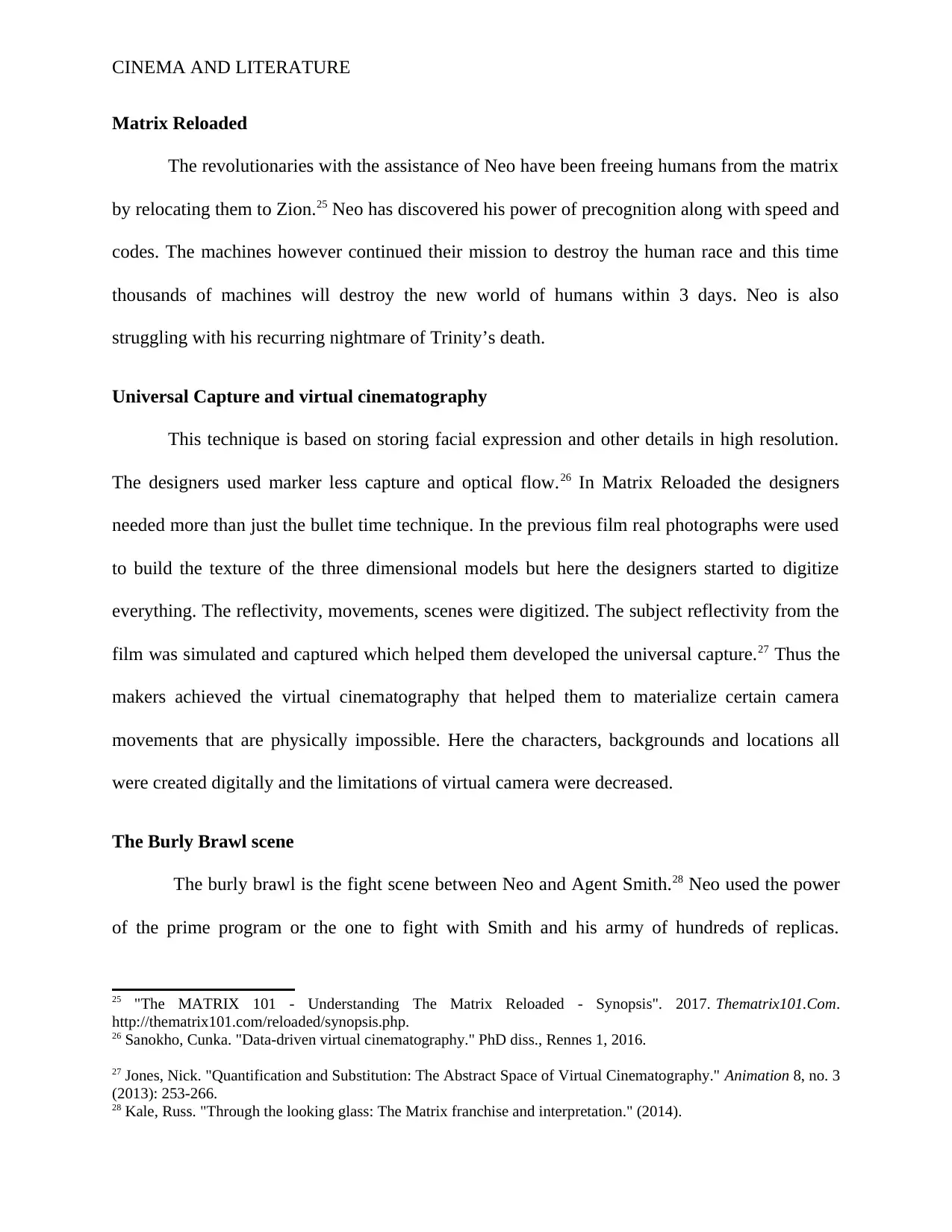
CINEMA AND LITERATURE
Matrix Reloaded
The revolutionaries with the assistance of Neo have been freeing humans from the matrix
by relocating them to Zion.25 Neo has discovered his power of precognition along with speed and
codes. The machines however continued their mission to destroy the human race and this time
thousands of machines will destroy the new world of humans within 3 days. Neo is also
struggling with his recurring nightmare of Trinity’s death.
Universal Capture and virtual cinematography
This technique is based on storing facial expression and other details in high resolution.
The designers used marker less capture and optical flow.26 In Matrix Reloaded the designers
needed more than just the bullet time technique. In the previous film real photographs were used
to build the texture of the three dimensional models but here the designers started to digitize
everything. The reflectivity, movements, scenes were digitized. The subject reflectivity from the
film was simulated and captured which helped them developed the universal capture.27 Thus the
makers achieved the virtual cinematography that helped them to materialize certain camera
movements that are physically impossible. Here the characters, backgrounds and locations all
were created digitally and the limitations of virtual camera were decreased.
The Burly Brawl scene
The burly brawl is the fight scene between Neo and Agent Smith.28 Neo used the power
of the prime program or the one to fight with Smith and his army of hundreds of replicas.
25 "The MATRIX 101 - Understanding The Matrix Reloaded - Synopsis". 2017. Thematrix101.Com.
http://thematrix101.com/reloaded/synopsis.php.
26 Sanokho, Cunka. "Data-driven virtual cinematography." PhD diss., Rennes 1, 2016.
27 Jones, Nick. "Quantification and Substitution: The Abstract Space of Virtual Cinematography." Animation 8, no. 3
(2013): 253-266.
28 Kale, Russ. "Through the looking glass: The Matrix franchise and interpretation." (2014).
Matrix Reloaded
The revolutionaries with the assistance of Neo have been freeing humans from the matrix
by relocating them to Zion.25 Neo has discovered his power of precognition along with speed and
codes. The machines however continued their mission to destroy the human race and this time
thousands of machines will destroy the new world of humans within 3 days. Neo is also
struggling with his recurring nightmare of Trinity’s death.
Universal Capture and virtual cinematography
This technique is based on storing facial expression and other details in high resolution.
The designers used marker less capture and optical flow.26 In Matrix Reloaded the designers
needed more than just the bullet time technique. In the previous film real photographs were used
to build the texture of the three dimensional models but here the designers started to digitize
everything. The reflectivity, movements, scenes were digitized. The subject reflectivity from the
film was simulated and captured which helped them developed the universal capture.27 Thus the
makers achieved the virtual cinematography that helped them to materialize certain camera
movements that are physically impossible. Here the characters, backgrounds and locations all
were created digitally and the limitations of virtual camera were decreased.
The Burly Brawl scene
The burly brawl is the fight scene between Neo and Agent Smith.28 Neo used the power
of the prime program or the one to fight with Smith and his army of hundreds of replicas.
25 "The MATRIX 101 - Understanding The Matrix Reloaded - Synopsis". 2017. Thematrix101.Com.
http://thematrix101.com/reloaded/synopsis.php.
26 Sanokho, Cunka. "Data-driven virtual cinematography." PhD diss., Rennes 1, 2016.
27 Jones, Nick. "Quantification and Substitution: The Abstract Space of Virtual Cinematography." Animation 8, no. 3
(2013): 253-266.
28 Kale, Russ. "Through the looking glass: The Matrix franchise and interpretation." (2014).
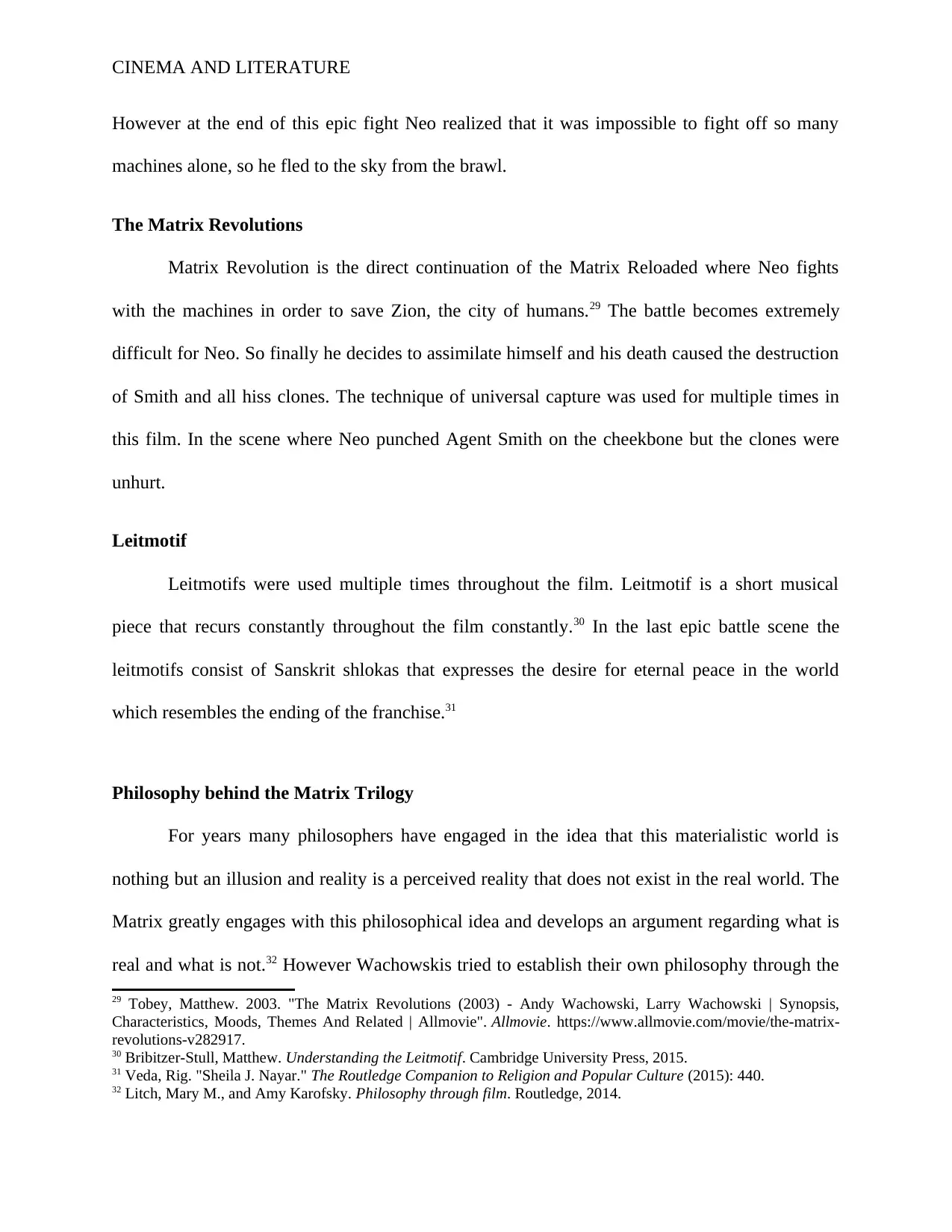
CINEMA AND LITERATURE
However at the end of this epic fight Neo realized that it was impossible to fight off so many
machines alone, so he fled to the sky from the brawl.
The Matrix Revolutions
Matrix Revolution is the direct continuation of the Matrix Reloaded where Neo fights
with the machines in order to save Zion, the city of humans.29 The battle becomes extremely
difficult for Neo. So finally he decides to assimilate himself and his death caused the destruction
of Smith and all hiss clones. The technique of universal capture was used for multiple times in
this film. In the scene where Neo punched Agent Smith on the cheekbone but the clones were
unhurt.
Leitmotif
Leitmotifs were used multiple times throughout the film. Leitmotif is a short musical
piece that recurs constantly throughout the film constantly.30 In the last epic battle scene the
leitmotifs consist of Sanskrit shlokas that expresses the desire for eternal peace in the world
which resembles the ending of the franchise.31
Philosophy behind the Matrix Trilogy
For years many philosophers have engaged in the idea that this materialistic world is
nothing but an illusion and reality is a perceived reality that does not exist in the real world. The
Matrix greatly engages with this philosophical idea and develops an argument regarding what is
real and what is not.32 However Wachowskis tried to establish their own philosophy through the
29 Tobey, Matthew. 2003. "The Matrix Revolutions (2003) - Andy Wachowski, Larry Wachowski | Synopsis,
Characteristics, Moods, Themes And Related | Allmovie". Allmovie. https://www.allmovie.com/movie/the-matrix-
revolutions-v282917.
30 Bribitzer-Stull, Matthew. Understanding the Leitmotif. Cambridge University Press, 2015.
31 Veda, Rig. "Sheila J. Nayar." The Routledge Companion to Religion and Popular Culture (2015): 440.
32 Litch, Mary M., and Amy Karofsky. Philosophy through film. Routledge, 2014.
However at the end of this epic fight Neo realized that it was impossible to fight off so many
machines alone, so he fled to the sky from the brawl.
The Matrix Revolutions
Matrix Revolution is the direct continuation of the Matrix Reloaded where Neo fights
with the machines in order to save Zion, the city of humans.29 The battle becomes extremely
difficult for Neo. So finally he decides to assimilate himself and his death caused the destruction
of Smith and all hiss clones. The technique of universal capture was used for multiple times in
this film. In the scene where Neo punched Agent Smith on the cheekbone but the clones were
unhurt.
Leitmotif
Leitmotifs were used multiple times throughout the film. Leitmotif is a short musical
piece that recurs constantly throughout the film constantly.30 In the last epic battle scene the
leitmotifs consist of Sanskrit shlokas that expresses the desire for eternal peace in the world
which resembles the ending of the franchise.31
Philosophy behind the Matrix Trilogy
For years many philosophers have engaged in the idea that this materialistic world is
nothing but an illusion and reality is a perceived reality that does not exist in the real world. The
Matrix greatly engages with this philosophical idea and develops an argument regarding what is
real and what is not.32 However Wachowskis tried to establish their own philosophy through the
29 Tobey, Matthew. 2003. "The Matrix Revolutions (2003) - Andy Wachowski, Larry Wachowski | Synopsis,
Characteristics, Moods, Themes And Related | Allmovie". Allmovie. https://www.allmovie.com/movie/the-matrix-
revolutions-v282917.
30 Bribitzer-Stull, Matthew. Understanding the Leitmotif. Cambridge University Press, 2015.
31 Veda, Rig. "Sheila J. Nayar." The Routledge Companion to Religion and Popular Culture (2015): 440.
32 Litch, Mary M., and Amy Karofsky. Philosophy through film. Routledge, 2014.
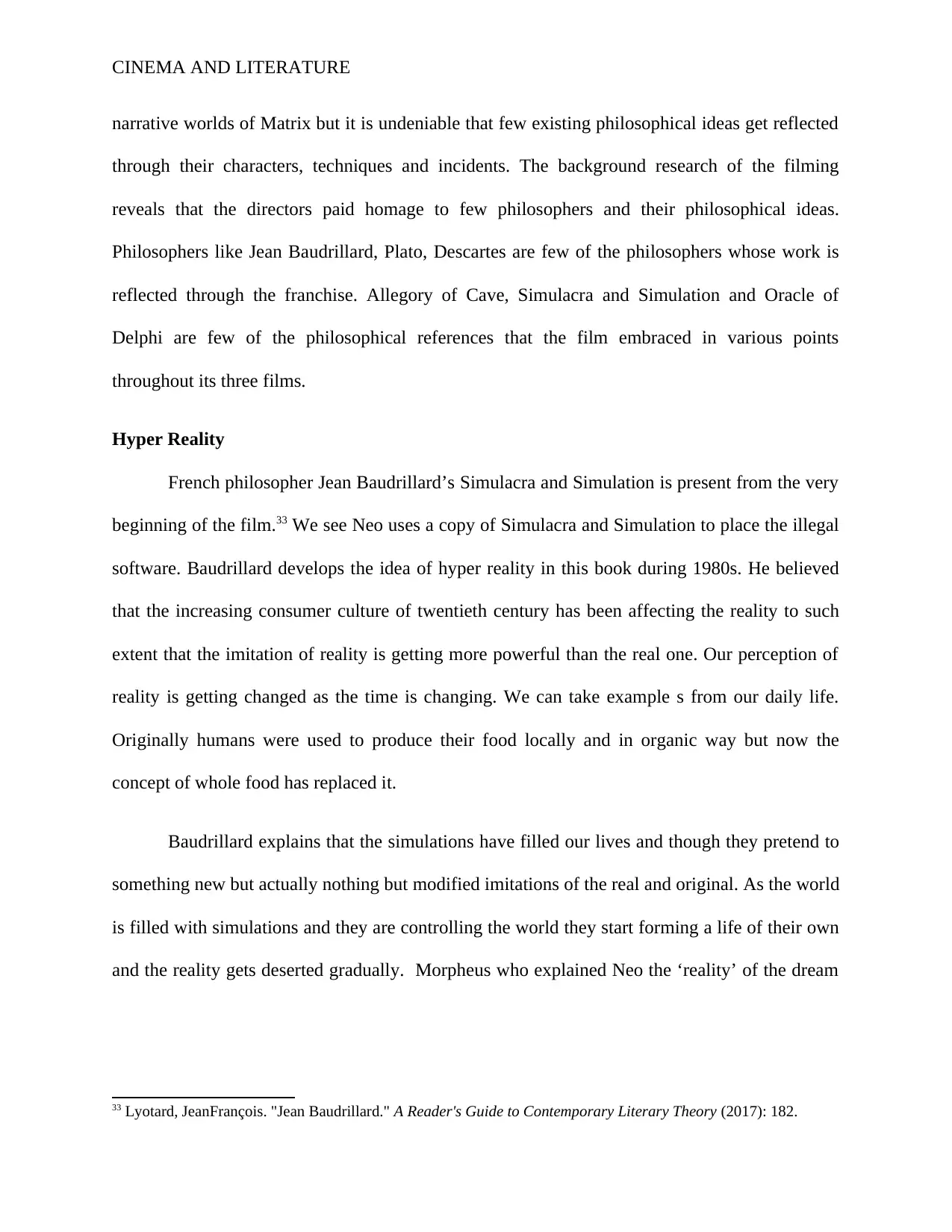
CINEMA AND LITERATURE
narrative worlds of Matrix but it is undeniable that few existing philosophical ideas get reflected
through their characters, techniques and incidents. The background research of the filming
reveals that the directors paid homage to few philosophers and their philosophical ideas.
Philosophers like Jean Baudrillard, Plato, Descartes are few of the philosophers whose work is
reflected through the franchise. Allegory of Cave, Simulacra and Simulation and Oracle of
Delphi are few of the philosophical references that the film embraced in various points
throughout its three films.
Hyper Reality
French philosopher Jean Baudrillard’s Simulacra and Simulation is present from the very
beginning of the film.33 We see Neo uses a copy of Simulacra and Simulation to place the illegal
software. Baudrillard develops the idea of hyper reality in this book during 1980s. He believed
that the increasing consumer culture of twentieth century has been affecting the reality to such
extent that the imitation of reality is getting more powerful than the real one. Our perception of
reality is getting changed as the time is changing. We can take example s from our daily life.
Originally humans were used to produce their food locally and in organic way but now the
concept of whole food has replaced it.
Baudrillard explains that the simulations have filled our lives and though they pretend to
something new but actually nothing but modified imitations of the real and original. As the world
is filled with simulations and they are controlling the world they start forming a life of their own
and the reality gets deserted gradually. Morpheus who explained Neo the ‘reality’ of the dream
33 Lyotard, JeanFrançois. "Jean Baudrillard." A Reader's Guide to Contemporary Literary Theory (2017): 182.
narrative worlds of Matrix but it is undeniable that few existing philosophical ideas get reflected
through their characters, techniques and incidents. The background research of the filming
reveals that the directors paid homage to few philosophers and their philosophical ideas.
Philosophers like Jean Baudrillard, Plato, Descartes are few of the philosophers whose work is
reflected through the franchise. Allegory of Cave, Simulacra and Simulation and Oracle of
Delphi are few of the philosophical references that the film embraced in various points
throughout its three films.
Hyper Reality
French philosopher Jean Baudrillard’s Simulacra and Simulation is present from the very
beginning of the film.33 We see Neo uses a copy of Simulacra and Simulation to place the illegal
software. Baudrillard develops the idea of hyper reality in this book during 1980s. He believed
that the increasing consumer culture of twentieth century has been affecting the reality to such
extent that the imitation of reality is getting more powerful than the real one. Our perception of
reality is getting changed as the time is changing. We can take example s from our daily life.
Originally humans were used to produce their food locally and in organic way but now the
concept of whole food has replaced it.
Baudrillard explains that the simulations have filled our lives and though they pretend to
something new but actually nothing but modified imitations of the real and original. As the world
is filled with simulations and they are controlling the world they start forming a life of their own
and the reality gets deserted gradually. Morpheus who explained Neo the ‘reality’ of the dream
33 Lyotard, JeanFrançois. "Jean Baudrillard." A Reader's Guide to Contemporary Literary Theory (2017): 182.
Paraphrase This Document
Need a fresh take? Get an instant paraphrase of this document with our AI Paraphraser
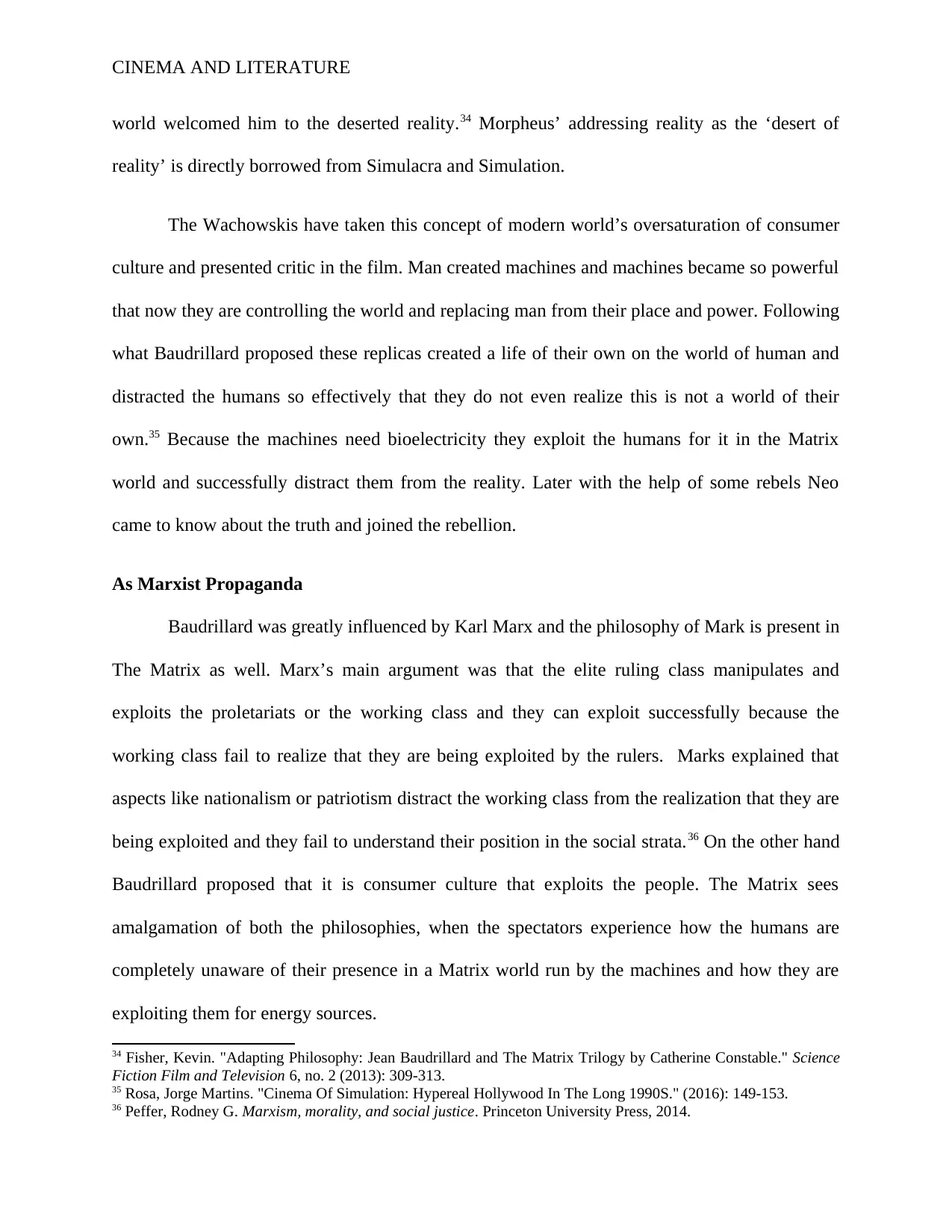
CINEMA AND LITERATURE
world welcomed him to the deserted reality.34 Morpheus’ addressing reality as the ‘desert of
reality’ is directly borrowed from Simulacra and Simulation.
The Wachowskis have taken this concept of modern world’s oversaturation of consumer
culture and presented critic in the film. Man created machines and machines became so powerful
that now they are controlling the world and replacing man from their place and power. Following
what Baudrillard proposed these replicas created a life of their own on the world of human and
distracted the humans so effectively that they do not even realize this is not a world of their
own.35 Because the machines need bioelectricity they exploit the humans for it in the Matrix
world and successfully distract them from the reality. Later with the help of some rebels Neo
came to know about the truth and joined the rebellion.
As Marxist Propaganda
Baudrillard was greatly influenced by Karl Marx and the philosophy of Mark is present in
The Matrix as well. Marx’s main argument was that the elite ruling class manipulates and
exploits the proletariats or the working class and they can exploit successfully because the
working class fail to realize that they are being exploited by the rulers. Marks explained that
aspects like nationalism or patriotism distract the working class from the realization that they are
being exploited and they fail to understand their position in the social strata.36 On the other hand
Baudrillard proposed that it is consumer culture that exploits the people. The Matrix sees
amalgamation of both the philosophies, when the spectators experience how the humans are
completely unaware of their presence in a Matrix world run by the machines and how they are
exploiting them for energy sources.
34 Fisher, Kevin. "Adapting Philosophy: Jean Baudrillard and The Matrix Trilogy by Catherine Constable." Science
Fiction Film and Television 6, no. 2 (2013): 309-313.
35 Rosa, Jorge Martins. "Cinema Of Simulation: Hypereal Hollywood In The Long 1990S." (2016): 149-153.
36 Peffer, Rodney G. Marxism, morality, and social justice. Princeton University Press, 2014.
world welcomed him to the deserted reality.34 Morpheus’ addressing reality as the ‘desert of
reality’ is directly borrowed from Simulacra and Simulation.
The Wachowskis have taken this concept of modern world’s oversaturation of consumer
culture and presented critic in the film. Man created machines and machines became so powerful
that now they are controlling the world and replacing man from their place and power. Following
what Baudrillard proposed these replicas created a life of their own on the world of human and
distracted the humans so effectively that they do not even realize this is not a world of their
own.35 Because the machines need bioelectricity they exploit the humans for it in the Matrix
world and successfully distract them from the reality. Later with the help of some rebels Neo
came to know about the truth and joined the rebellion.
As Marxist Propaganda
Baudrillard was greatly influenced by Karl Marx and the philosophy of Mark is present in
The Matrix as well. Marx’s main argument was that the elite ruling class manipulates and
exploits the proletariats or the working class and they can exploit successfully because the
working class fail to realize that they are being exploited by the rulers. Marks explained that
aspects like nationalism or patriotism distract the working class from the realization that they are
being exploited and they fail to understand their position in the social strata.36 On the other hand
Baudrillard proposed that it is consumer culture that exploits the people. The Matrix sees
amalgamation of both the philosophies, when the spectators experience how the humans are
completely unaware of their presence in a Matrix world run by the machines and how they are
exploiting them for energy sources.
34 Fisher, Kevin. "Adapting Philosophy: Jean Baudrillard and The Matrix Trilogy by Catherine Constable." Science
Fiction Film and Television 6, no. 2 (2013): 309-313.
35 Rosa, Jorge Martins. "Cinema Of Simulation: Hypereal Hollywood In The Long 1990S." (2016): 149-153.
36 Peffer, Rodney G. Marxism, morality, and social justice. Princeton University Press, 2014.
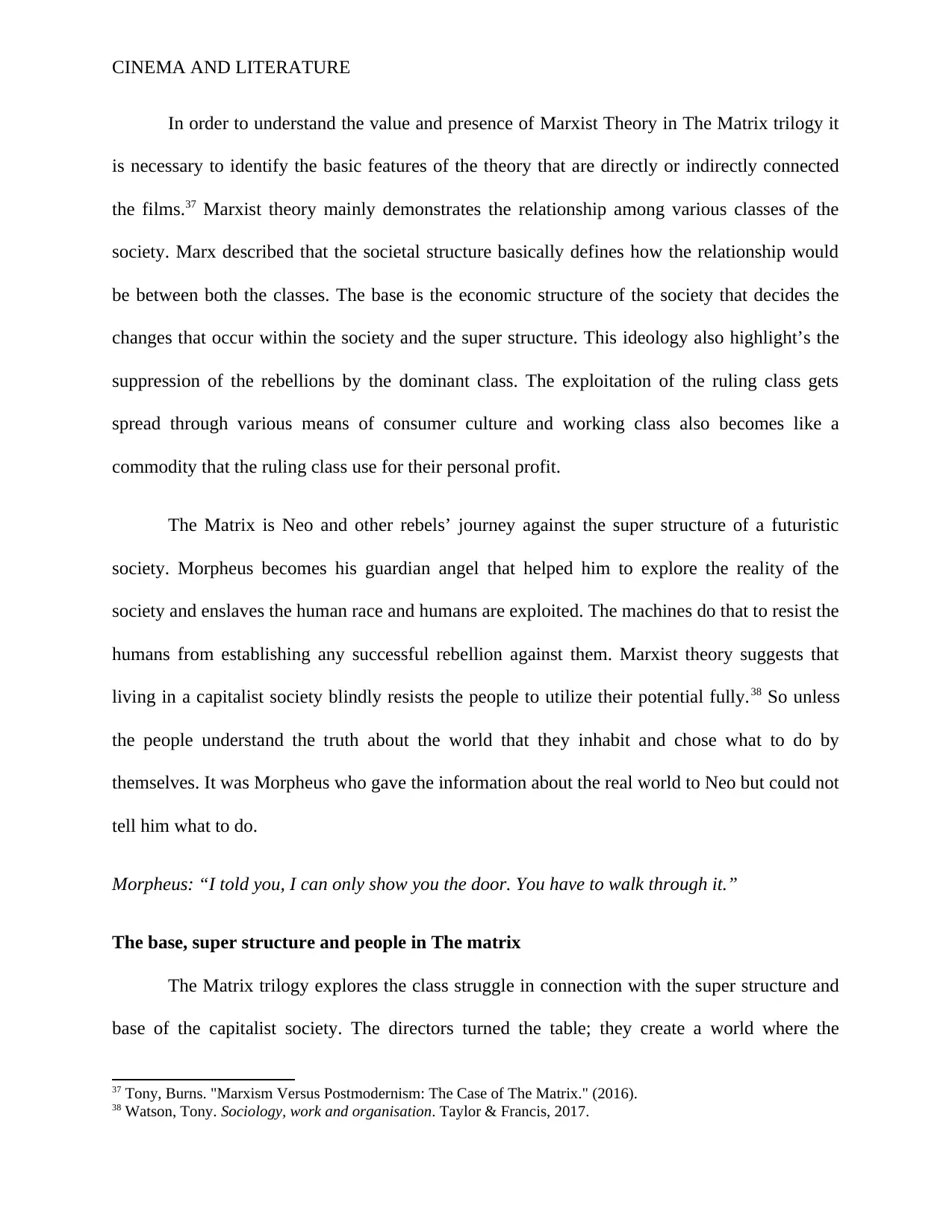
CINEMA AND LITERATURE
In order to understand the value and presence of Marxist Theory in The Matrix trilogy it
is necessary to identify the basic features of the theory that are directly or indirectly connected
the films.37 Marxist theory mainly demonstrates the relationship among various classes of the
society. Marx described that the societal structure basically defines how the relationship would
be between both the classes. The base is the economic structure of the society that decides the
changes that occur within the society and the super structure. This ideology also highlight’s the
suppression of the rebellions by the dominant class. The exploitation of the ruling class gets
spread through various means of consumer culture and working class also becomes like a
commodity that the ruling class use for their personal profit.
The Matrix is Neo and other rebels’ journey against the super structure of a futuristic
society. Morpheus becomes his guardian angel that helped him to explore the reality of the
society and enslaves the human race and humans are exploited. The machines do that to resist the
humans from establishing any successful rebellion against them. Marxist theory suggests that
living in a capitalist society blindly resists the people to utilize their potential fully.38 So unless
the people understand the truth about the world that they inhabit and chose what to do by
themselves. It was Morpheus who gave the information about the real world to Neo but could not
tell him what to do.
Morpheus: “I told you, I can only show you the door. You have to walk through it.”
The base, super structure and people in The matrix
The Matrix trilogy explores the class struggle in connection with the super structure and
base of the capitalist society. The directors turned the table; they create a world where the
37 Tony, Burns. "Marxism Versus Postmodernism: The Case of The Matrix." (2016).
38 Watson, Tony. Sociology, work and organisation. Taylor & Francis, 2017.
In order to understand the value and presence of Marxist Theory in The Matrix trilogy it
is necessary to identify the basic features of the theory that are directly or indirectly connected
the films.37 Marxist theory mainly demonstrates the relationship among various classes of the
society. Marx described that the societal structure basically defines how the relationship would
be between both the classes. The base is the economic structure of the society that decides the
changes that occur within the society and the super structure. This ideology also highlight’s the
suppression of the rebellions by the dominant class. The exploitation of the ruling class gets
spread through various means of consumer culture and working class also becomes like a
commodity that the ruling class use for their personal profit.
The Matrix is Neo and other rebels’ journey against the super structure of a futuristic
society. Morpheus becomes his guardian angel that helped him to explore the reality of the
society and enslaves the human race and humans are exploited. The machines do that to resist the
humans from establishing any successful rebellion against them. Marxist theory suggests that
living in a capitalist society blindly resists the people to utilize their potential fully.38 So unless
the people understand the truth about the world that they inhabit and chose what to do by
themselves. It was Morpheus who gave the information about the real world to Neo but could not
tell him what to do.
Morpheus: “I told you, I can only show you the door. You have to walk through it.”
The base, super structure and people in The matrix
The Matrix trilogy explores the class struggle in connection with the super structure and
base of the capitalist society. The directors turned the table; they create a world where the
37 Tony, Burns. "Marxism Versus Postmodernism: The Case of The Matrix." (2016).
38 Watson, Tony. Sociology, work and organisation. Taylor & Francis, 2017.
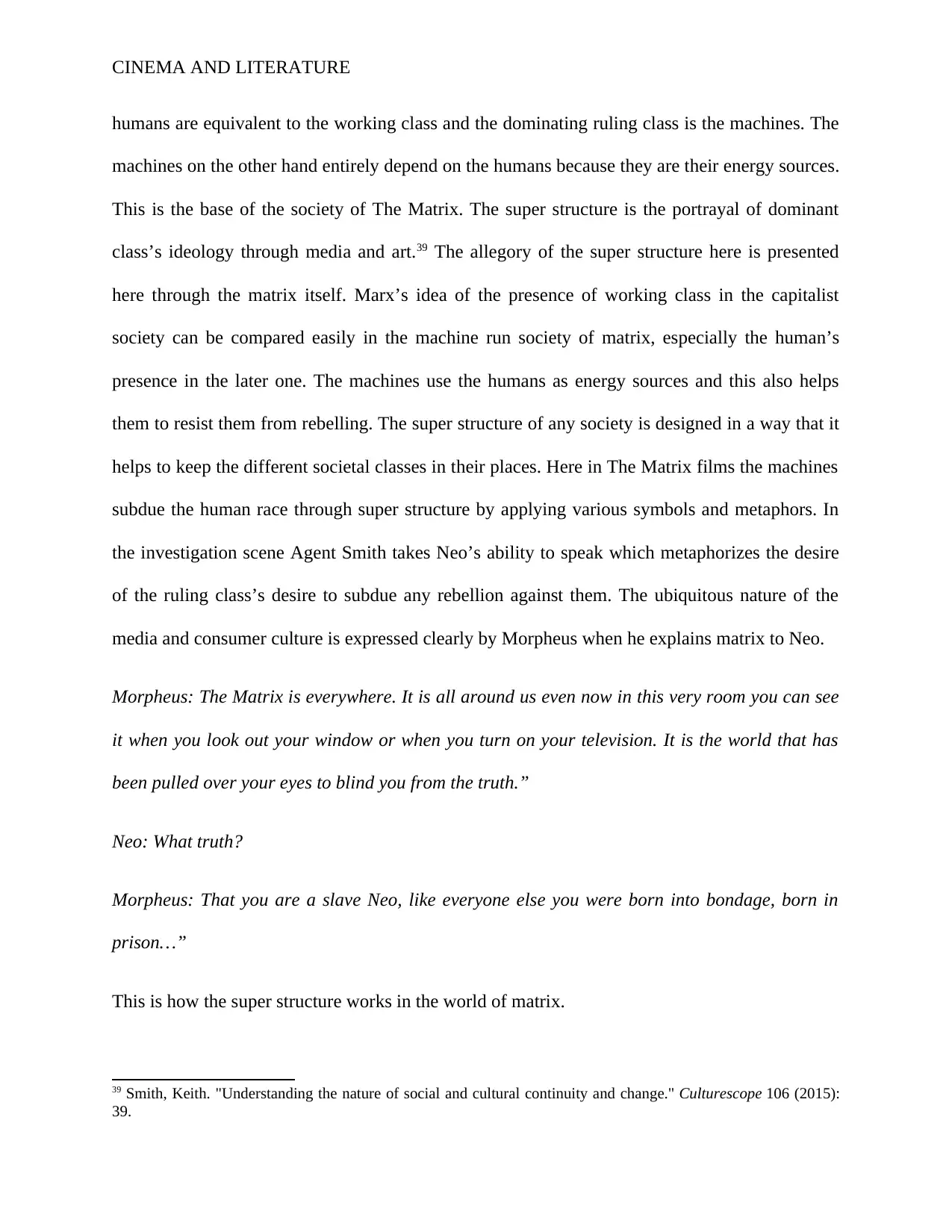
CINEMA AND LITERATURE
humans are equivalent to the working class and the dominating ruling class is the machines. The
machines on the other hand entirely depend on the humans because they are their energy sources.
This is the base of the society of The Matrix. The super structure is the portrayal of dominant
class’s ideology through media and art.39 The allegory of the super structure here is presented
here through the matrix itself. Marx’s idea of the presence of working class in the capitalist
society can be compared easily in the machine run society of matrix, especially the human’s
presence in the later one. The machines use the humans as energy sources and this also helps
them to resist them from rebelling. The super structure of any society is designed in a way that it
helps to keep the different societal classes in their places. Here in The Matrix films the machines
subdue the human race through super structure by applying various symbols and metaphors. In
the investigation scene Agent Smith takes Neo’s ability to speak which metaphorizes the desire
of the ruling class’s desire to subdue any rebellion against them. The ubiquitous nature of the
media and consumer culture is expressed clearly by Morpheus when he explains matrix to Neo.
Morpheus: The Matrix is everywhere. It is all around us even now in this very room you can see
it when you look out your window or when you turn on your television. It is the world that has
been pulled over your eyes to blind you from the truth.”
Neo: What truth?
Morpheus: That you are a slave Neo, like everyone else you were born into bondage, born in
prison…”
This is how the super structure works in the world of matrix.
39 Smith, Keith. "Understanding the nature of social and cultural continuity and change." Culturescope 106 (2015):
39.
humans are equivalent to the working class and the dominating ruling class is the machines. The
machines on the other hand entirely depend on the humans because they are their energy sources.
This is the base of the society of The Matrix. The super structure is the portrayal of dominant
class’s ideology through media and art.39 The allegory of the super structure here is presented
here through the matrix itself. Marx’s idea of the presence of working class in the capitalist
society can be compared easily in the machine run society of matrix, especially the human’s
presence in the later one. The machines use the humans as energy sources and this also helps
them to resist them from rebelling. The super structure of any society is designed in a way that it
helps to keep the different societal classes in their places. Here in The Matrix films the machines
subdue the human race through super structure by applying various symbols and metaphors. In
the investigation scene Agent Smith takes Neo’s ability to speak which metaphorizes the desire
of the ruling class’s desire to subdue any rebellion against them. The ubiquitous nature of the
media and consumer culture is expressed clearly by Morpheus when he explains matrix to Neo.
Morpheus: The Matrix is everywhere. It is all around us even now in this very room you can see
it when you look out your window or when you turn on your television. It is the world that has
been pulled over your eyes to blind you from the truth.”
Neo: What truth?
Morpheus: That you are a slave Neo, like everyone else you were born into bondage, born in
prison…”
This is how the super structure works in the world of matrix.
39 Smith, Keith. "Understanding the nature of social and cultural continuity and change." Culturescope 106 (2015):
39.
Secure Best Marks with AI Grader
Need help grading? Try our AI Grader for instant feedback on your assignments.
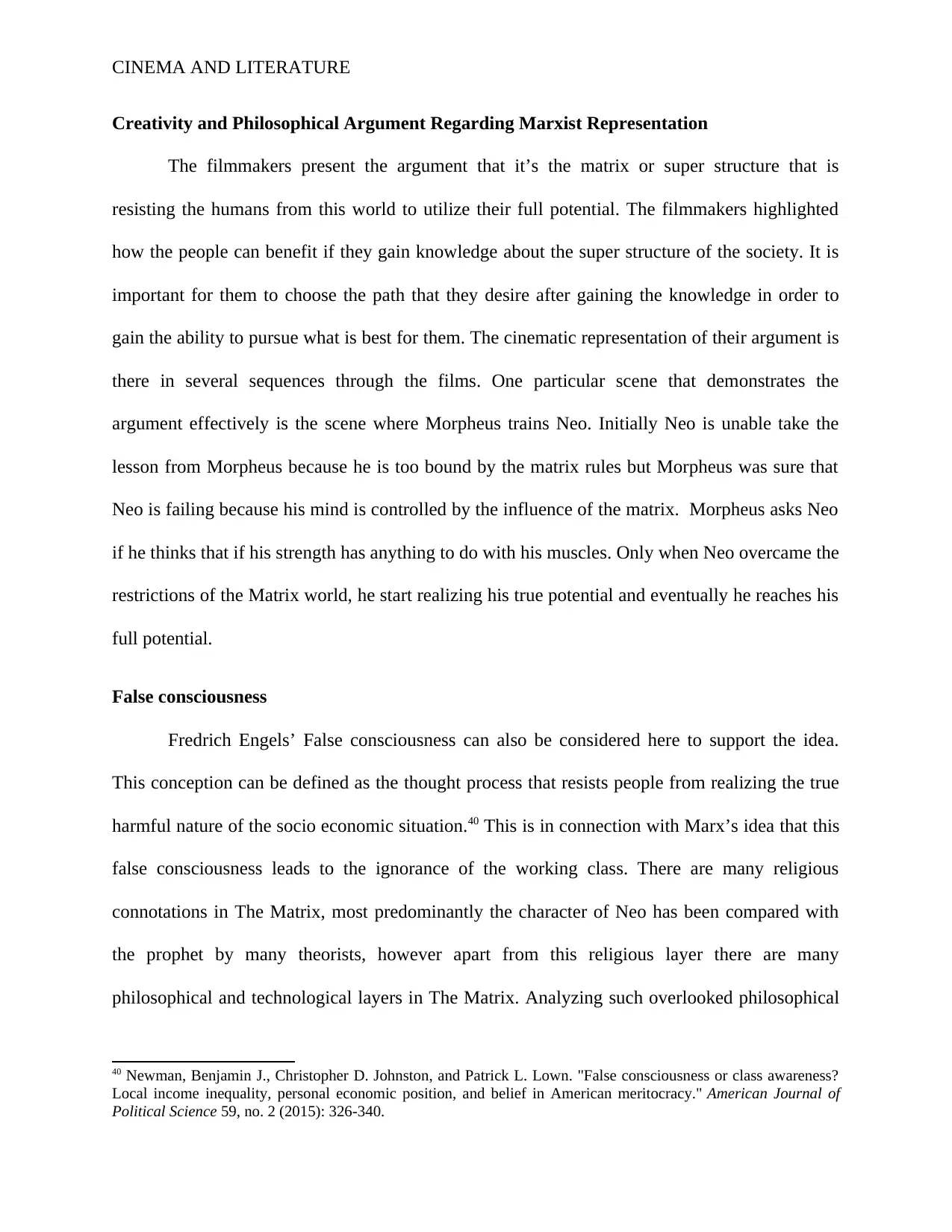
CINEMA AND LITERATURE
Creativity and Philosophical Argument Regarding Marxist Representation
The filmmakers present the argument that it’s the matrix or super structure that is
resisting the humans from this world to utilize their full potential. The filmmakers highlighted
how the people can benefit if they gain knowledge about the super structure of the society. It is
important for them to choose the path that they desire after gaining the knowledge in order to
gain the ability to pursue what is best for them. The cinematic representation of their argument is
there in several sequences through the films. One particular scene that demonstrates the
argument effectively is the scene where Morpheus trains Neo. Initially Neo is unable take the
lesson from Morpheus because he is too bound by the matrix rules but Morpheus was sure that
Neo is failing because his mind is controlled by the influence of the matrix. Morpheus asks Neo
if he thinks that if his strength has anything to do with his muscles. Only when Neo overcame the
restrictions of the Matrix world, he start realizing his true potential and eventually he reaches his
full potential.
False consciousness
Fredrich Engels’ False consciousness can also be considered here to support the idea.
This conception can be defined as the thought process that resists people from realizing the true
harmful nature of the socio economic situation.40 This is in connection with Marx’s idea that this
false consciousness leads to the ignorance of the working class. There are many religious
connotations in The Matrix, most predominantly the character of Neo has been compared with
the prophet by many theorists, however apart from this religious layer there are many
philosophical and technological layers in The Matrix. Analyzing such overlooked philosophical
40 Newman, Benjamin J., Christopher D. Johnston, and Patrick L. Lown. "False consciousness or class awareness?
Local income inequality, personal economic position, and belief in American meritocracy." American Journal of
Political Science 59, no. 2 (2015): 326-340.
Creativity and Philosophical Argument Regarding Marxist Representation
The filmmakers present the argument that it’s the matrix or super structure that is
resisting the humans from this world to utilize their full potential. The filmmakers highlighted
how the people can benefit if they gain knowledge about the super structure of the society. It is
important for them to choose the path that they desire after gaining the knowledge in order to
gain the ability to pursue what is best for them. The cinematic representation of their argument is
there in several sequences through the films. One particular scene that demonstrates the
argument effectively is the scene where Morpheus trains Neo. Initially Neo is unable take the
lesson from Morpheus because he is too bound by the matrix rules but Morpheus was sure that
Neo is failing because his mind is controlled by the influence of the matrix. Morpheus asks Neo
if he thinks that if his strength has anything to do with his muscles. Only when Neo overcame the
restrictions of the Matrix world, he start realizing his true potential and eventually he reaches his
full potential.
False consciousness
Fredrich Engels’ False consciousness can also be considered here to support the idea.
This conception can be defined as the thought process that resists people from realizing the true
harmful nature of the socio economic situation.40 This is in connection with Marx’s idea that this
false consciousness leads to the ignorance of the working class. There are many religious
connotations in The Matrix, most predominantly the character of Neo has been compared with
the prophet by many theorists, however apart from this religious layer there are many
philosophical and technological layers in The Matrix. Analyzing such overlooked philosophical
40 Newman, Benjamin J., Christopher D. Johnston, and Patrick L. Lown. "False consciousness or class awareness?
Local income inequality, personal economic position, and belief in American meritocracy." American Journal of
Political Science 59, no. 2 (2015): 326-340.
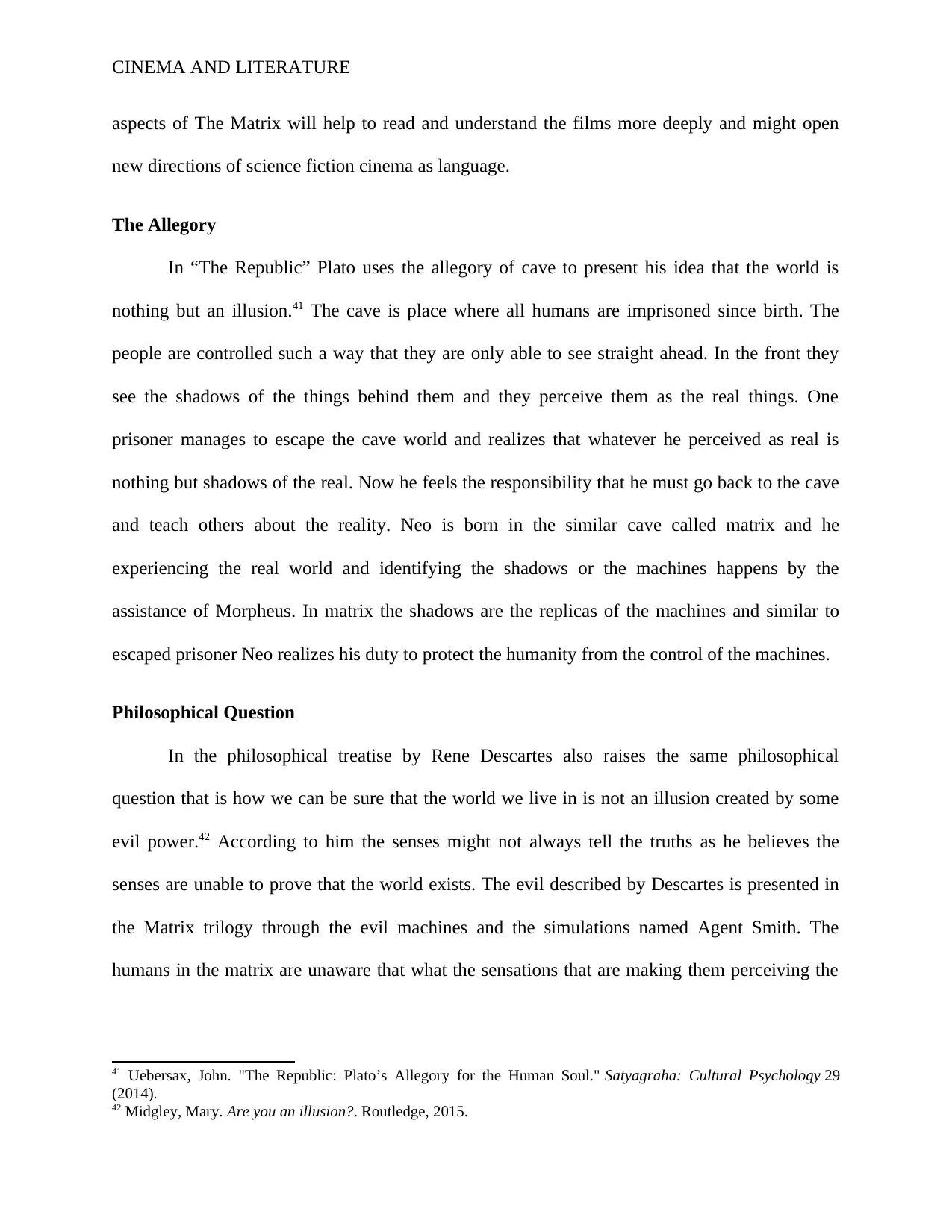
CINEMA AND LITERATURE
aspects of The Matrix will help to read and understand the films more deeply and might open
new directions of science fiction cinema as language.
The Allegory
In “The Republic” Plato uses the allegory of cave to present his idea that the world is
nothing but an illusion.41 The cave is place where all humans are imprisoned since birth. The
people are controlled such a way that they are only able to see straight ahead. In the front they
see the shadows of the things behind them and they perceive them as the real things. One
prisoner manages to escape the cave world and realizes that whatever he perceived as real is
nothing but shadows of the real. Now he feels the responsibility that he must go back to the cave
and teach others about the reality. Neo is born in the similar cave called matrix and he
experiencing the real world and identifying the shadows or the machines happens by the
assistance of Morpheus. In matrix the shadows are the replicas of the machines and similar to
escaped prisoner Neo realizes his duty to protect the humanity from the control of the machines.
Philosophical Question
In the philosophical treatise by Rene Descartes also raises the same philosophical
question that is how we can be sure that the world we live in is not an illusion created by some
evil power.42 According to him the senses might not always tell the truths as he believes the
senses are unable to prove that the world exists. The evil described by Descartes is presented in
the Matrix trilogy through the evil machines and the simulations named Agent Smith. The
humans in the matrix are unaware that what the sensations that are making them perceiving the
41 Uebersax, John. "The Republic: Plato’s Allegory for the Human Soul." Satyagraha: Cultural Psychology 29
(2014).
42 Midgley, Mary. Are you an illusion?. Routledge, 2015.
aspects of The Matrix will help to read and understand the films more deeply and might open
new directions of science fiction cinema as language.
The Allegory
In “The Republic” Plato uses the allegory of cave to present his idea that the world is
nothing but an illusion.41 The cave is place where all humans are imprisoned since birth. The
people are controlled such a way that they are only able to see straight ahead. In the front they
see the shadows of the things behind them and they perceive them as the real things. One
prisoner manages to escape the cave world and realizes that whatever he perceived as real is
nothing but shadows of the real. Now he feels the responsibility that he must go back to the cave
and teach others about the reality. Neo is born in the similar cave called matrix and he
experiencing the real world and identifying the shadows or the machines happens by the
assistance of Morpheus. In matrix the shadows are the replicas of the machines and similar to
escaped prisoner Neo realizes his duty to protect the humanity from the control of the machines.
Philosophical Question
In the philosophical treatise by Rene Descartes also raises the same philosophical
question that is how we can be sure that the world we live in is not an illusion created by some
evil power.42 According to him the senses might not always tell the truths as he believes the
senses are unable to prove that the world exists. The evil described by Descartes is presented in
the Matrix trilogy through the evil machines and the simulations named Agent Smith. The
humans in the matrix are unaware that what the sensations that are making them perceiving the
41 Uebersax, John. "The Republic: Plato’s Allegory for the Human Soul." Satyagraha: Cultural Psychology 29
(2014).
42 Midgley, Mary. Are you an illusion?. Routledge, 2015.
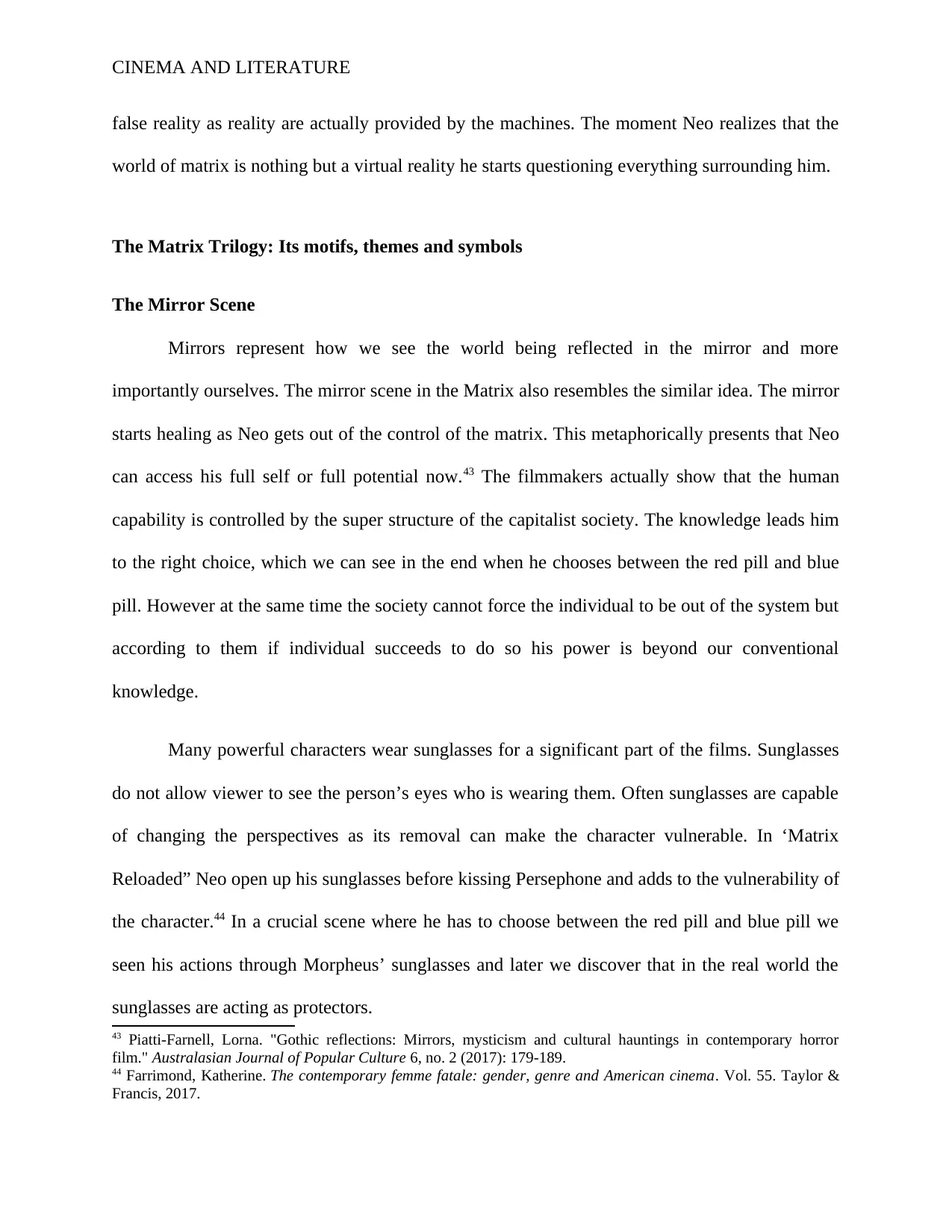
CINEMA AND LITERATURE
false reality as reality are actually provided by the machines. The moment Neo realizes that the
world of matrix is nothing but a virtual reality he starts questioning everything surrounding him.
The Matrix Trilogy: Its motifs, themes and symbols
The Mirror Scene
Mirrors represent how we see the world being reflected in the mirror and more
importantly ourselves. The mirror scene in the Matrix also resembles the similar idea. The mirror
starts healing as Neo gets out of the control of the matrix. This metaphorically presents that Neo
can access his full self or full potential now.43 The filmmakers actually show that the human
capability is controlled by the super structure of the capitalist society. The knowledge leads him
to the right choice, which we can see in the end when he chooses between the red pill and blue
pill. However at the same time the society cannot force the individual to be out of the system but
according to them if individual succeeds to do so his power is beyond our conventional
knowledge.
Many powerful characters wear sunglasses for a significant part of the films. Sunglasses
do not allow viewer to see the person’s eyes who is wearing them. Often sunglasses are capable
of changing the perspectives as its removal can make the character vulnerable. In ‘Matrix
Reloaded” Neo open up his sunglasses before kissing Persephone and adds to the vulnerability of
the character.44 In a crucial scene where he has to choose between the red pill and blue pill we
seen his actions through Morpheus’ sunglasses and later we discover that in the real world the
sunglasses are acting as protectors.
43 Piatti-Farnell, Lorna. "Gothic reflections: Mirrors, mysticism and cultural hauntings in contemporary horror
film." Australasian Journal of Popular Culture 6, no. 2 (2017): 179-189.
44 Farrimond, Katherine. The contemporary femme fatale: gender, genre and American cinema. Vol. 55. Taylor &
Francis, 2017.
false reality as reality are actually provided by the machines. The moment Neo realizes that the
world of matrix is nothing but a virtual reality he starts questioning everything surrounding him.
The Matrix Trilogy: Its motifs, themes and symbols
The Mirror Scene
Mirrors represent how we see the world being reflected in the mirror and more
importantly ourselves. The mirror scene in the Matrix also resembles the similar idea. The mirror
starts healing as Neo gets out of the control of the matrix. This metaphorically presents that Neo
can access his full self or full potential now.43 The filmmakers actually show that the human
capability is controlled by the super structure of the capitalist society. The knowledge leads him
to the right choice, which we can see in the end when he chooses between the red pill and blue
pill. However at the same time the society cannot force the individual to be out of the system but
according to them if individual succeeds to do so his power is beyond our conventional
knowledge.
Many powerful characters wear sunglasses for a significant part of the films. Sunglasses
do not allow viewer to see the person’s eyes who is wearing them. Often sunglasses are capable
of changing the perspectives as its removal can make the character vulnerable. In ‘Matrix
Reloaded” Neo open up his sunglasses before kissing Persephone and adds to the vulnerability of
the character.44 In a crucial scene where he has to choose between the red pill and blue pill we
seen his actions through Morpheus’ sunglasses and later we discover that in the real world the
sunglasses are acting as protectors.
43 Piatti-Farnell, Lorna. "Gothic reflections: Mirrors, mysticism and cultural hauntings in contemporary horror
film." Australasian Journal of Popular Culture 6, no. 2 (2017): 179-189.
44 Farrimond, Katherine. The contemporary femme fatale: gender, genre and American cinema. Vol. 55. Taylor &
Francis, 2017.
Paraphrase This Document
Need a fresh take? Get an instant paraphrase of this document with our AI Paraphraser
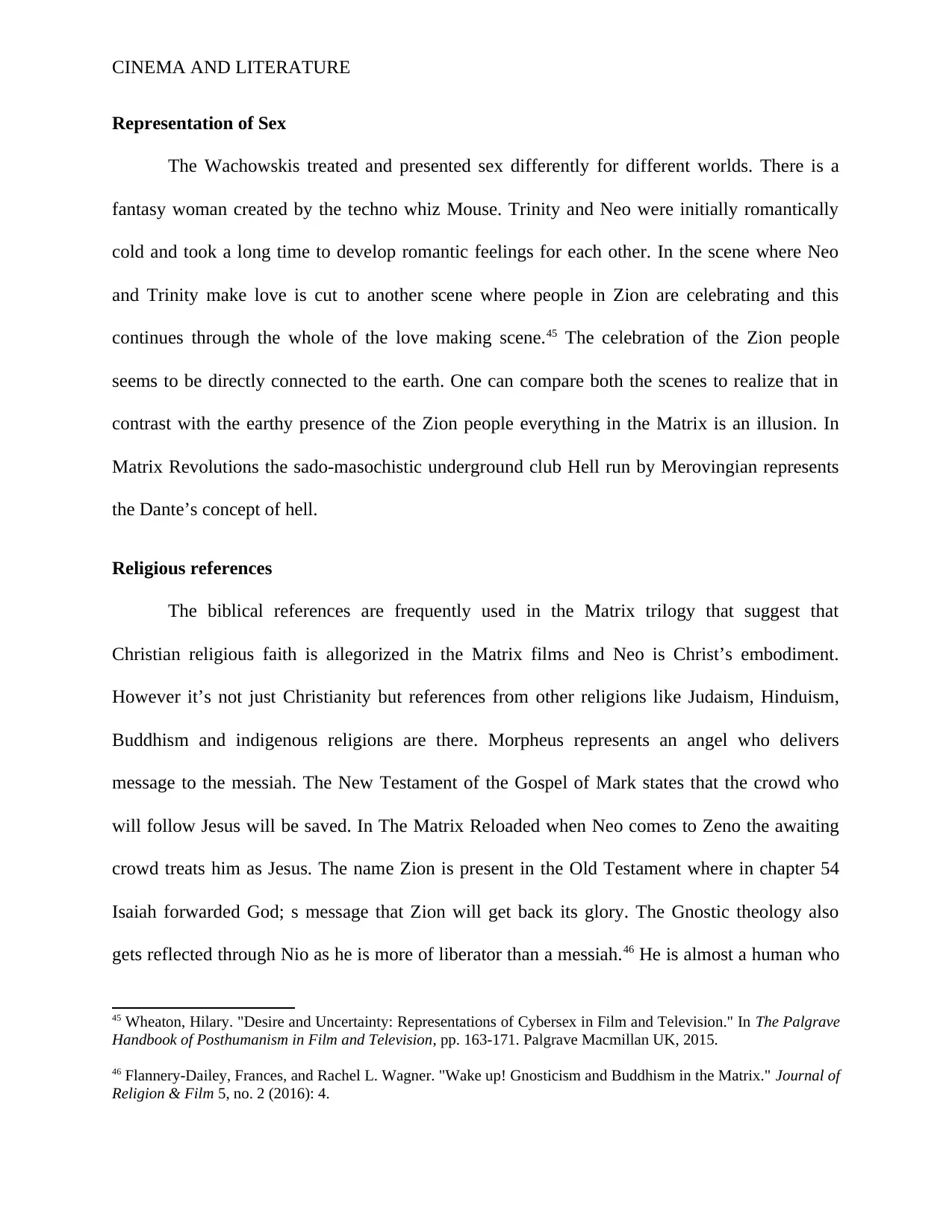
CINEMA AND LITERATURE
Representation of Sex
The Wachowskis treated and presented sex differently for different worlds. There is a
fantasy woman created by the techno whiz Mouse. Trinity and Neo were initially romantically
cold and took a long time to develop romantic feelings for each other. In the scene where Neo
and Trinity make love is cut to another scene where people in Zion are celebrating and this
continues through the whole of the love making scene.45 The celebration of the Zion people
seems to be directly connected to the earth. One can compare both the scenes to realize that in
contrast with the earthy presence of the Zion people everything in the Matrix is an illusion. In
Matrix Revolutions the sado-masochistic underground club Hell run by Merovingian represents
the Dante’s concept of hell.
Religious references
The biblical references are frequently used in the Matrix trilogy that suggest that
Christian religious faith is allegorized in the Matrix films and Neo is Christ’s embodiment.
However it’s not just Christianity but references from other religions like Judaism, Hinduism,
Buddhism and indigenous religions are there. Morpheus represents an angel who delivers
message to the messiah. The New Testament of the Gospel of Mark states that the crowd who
will follow Jesus will be saved. In The Matrix Reloaded when Neo comes to Zeno the awaiting
crowd treats him as Jesus. The name Zion is present in the Old Testament where in chapter 54
Isaiah forwarded God; s message that Zion will get back its glory. The Gnostic theology also
gets reflected through Nio as he is more of liberator than a messiah.46 He is almost a human who
45 Wheaton, Hilary. "Desire and Uncertainty: Representations of Cybersex in Film and Television." In The Palgrave
Handbook of Posthumanism in Film and Television, pp. 163-171. Palgrave Macmillan UK, 2015.
46 Flannery-Dailey, Frances, and Rachel L. Wagner. "Wake up! Gnosticism and Buddhism in the Matrix." Journal of
Religion & Film 5, no. 2 (2016): 4.
Representation of Sex
The Wachowskis treated and presented sex differently for different worlds. There is a
fantasy woman created by the techno whiz Mouse. Trinity and Neo were initially romantically
cold and took a long time to develop romantic feelings for each other. In the scene where Neo
and Trinity make love is cut to another scene where people in Zion are celebrating and this
continues through the whole of the love making scene.45 The celebration of the Zion people
seems to be directly connected to the earth. One can compare both the scenes to realize that in
contrast with the earthy presence of the Zion people everything in the Matrix is an illusion. In
Matrix Revolutions the sado-masochistic underground club Hell run by Merovingian represents
the Dante’s concept of hell.
Religious references
The biblical references are frequently used in the Matrix trilogy that suggest that
Christian religious faith is allegorized in the Matrix films and Neo is Christ’s embodiment.
However it’s not just Christianity but references from other religions like Judaism, Hinduism,
Buddhism and indigenous religions are there. Morpheus represents an angel who delivers
message to the messiah. The New Testament of the Gospel of Mark states that the crowd who
will follow Jesus will be saved. In The Matrix Reloaded when Neo comes to Zeno the awaiting
crowd treats him as Jesus. The name Zion is present in the Old Testament where in chapter 54
Isaiah forwarded God; s message that Zion will get back its glory. The Gnostic theology also
gets reflected through Nio as he is more of liberator than a messiah.46 He is almost a human who
45 Wheaton, Hilary. "Desire and Uncertainty: Representations of Cybersex in Film and Television." In The Palgrave
Handbook of Posthumanism in Film and Television, pp. 163-171. Palgrave Macmillan UK, 2015.
46 Flannery-Dailey, Frances, and Rachel L. Wagner. "Wake up! Gnosticism and Buddhism in the Matrix." Journal of
Religion & Film 5, no. 2 (2016): 4.
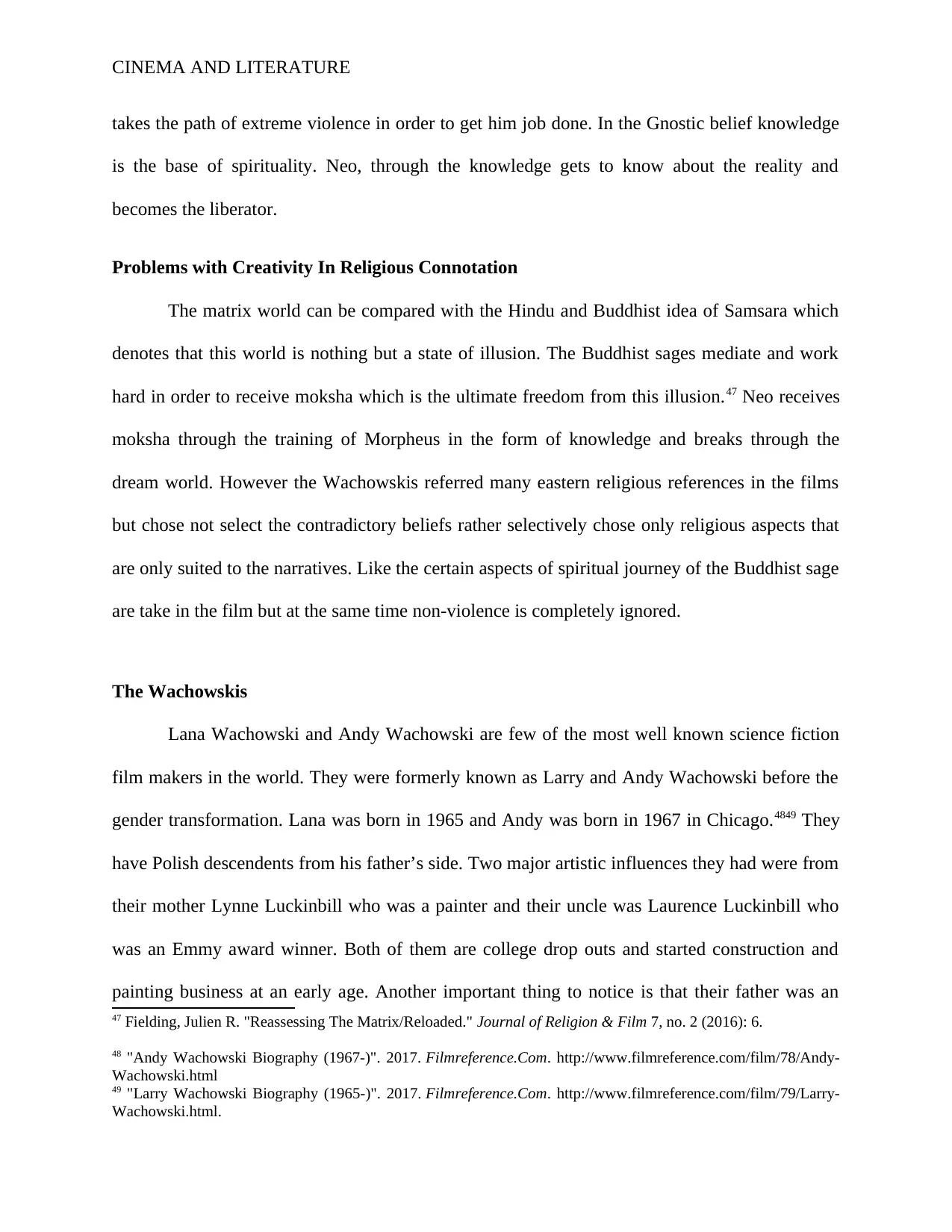
CINEMA AND LITERATURE
takes the path of extreme violence in order to get him job done. In the Gnostic belief knowledge
is the base of spirituality. Neo, through the knowledge gets to know about the reality and
becomes the liberator.
Problems with Creativity In Religious Connotation
The matrix world can be compared with the Hindu and Buddhist idea of Samsara which
denotes that this world is nothing but a state of illusion. The Buddhist sages mediate and work
hard in order to receive moksha which is the ultimate freedom from this illusion.47 Neo receives
moksha through the training of Morpheus in the form of knowledge and breaks through the
dream world. However the Wachowskis referred many eastern religious references in the films
but chose not select the contradictory beliefs rather selectively chose only religious aspects that
are only suited to the narratives. Like the certain aspects of spiritual journey of the Buddhist sage
are take in the film but at the same time non-violence is completely ignored.
The Wachowskis
Lana Wachowski and Andy Wachowski are few of the most well known science fiction
film makers in the world. They were formerly known as Larry and Andy Wachowski before the
gender transformation. Lana was born in 1965 and Andy was born in 1967 in Chicago.4849 They
have Polish descendents from his father’s side. Two major artistic influences they had were from
their mother Lynne Luckinbill who was a painter and their uncle was Laurence Luckinbill who
was an Emmy award winner. Both of them are college drop outs and started construction and
painting business at an early age. Another important thing to notice is that their father was an
47 Fielding, Julien R. "Reassessing The Matrix/Reloaded." Journal of Religion & Film 7, no. 2 (2016): 6.
48 "Andy Wachowski Biography (1967-)". 2017. Filmreference.Com. http://www.filmreference.com/film/78/Andy-
Wachowski.html
49 "Larry Wachowski Biography (1965-)". 2017. Filmreference.Com. http://www.filmreference.com/film/79/Larry-
Wachowski.html.
takes the path of extreme violence in order to get him job done. In the Gnostic belief knowledge
is the base of spirituality. Neo, through the knowledge gets to know about the reality and
becomes the liberator.
Problems with Creativity In Religious Connotation
The matrix world can be compared with the Hindu and Buddhist idea of Samsara which
denotes that this world is nothing but a state of illusion. The Buddhist sages mediate and work
hard in order to receive moksha which is the ultimate freedom from this illusion.47 Neo receives
moksha through the training of Morpheus in the form of knowledge and breaks through the
dream world. However the Wachowskis referred many eastern religious references in the films
but chose not select the contradictory beliefs rather selectively chose only religious aspects that
are only suited to the narratives. Like the certain aspects of spiritual journey of the Buddhist sage
are take in the film but at the same time non-violence is completely ignored.
The Wachowskis
Lana Wachowski and Andy Wachowski are few of the most well known science fiction
film makers in the world. They were formerly known as Larry and Andy Wachowski before the
gender transformation. Lana was born in 1965 and Andy was born in 1967 in Chicago.4849 They
have Polish descendents from his father’s side. Two major artistic influences they had were from
their mother Lynne Luckinbill who was a painter and their uncle was Laurence Luckinbill who
was an Emmy award winner. Both of them are college drop outs and started construction and
painting business at an early age. Another important thing to notice is that their father was an
47 Fielding, Julien R. "Reassessing The Matrix/Reloaded." Journal of Religion & Film 7, no. 2 (2016): 6.
48 "Andy Wachowski Biography (1967-)". 2017. Filmreference.Com. http://www.filmreference.com/film/78/Andy-
Wachowski.html
49 "Larry Wachowski Biography (1965-)". 2017. Filmreference.Com. http://www.filmreference.com/film/79/Larry-
Wachowski.html.
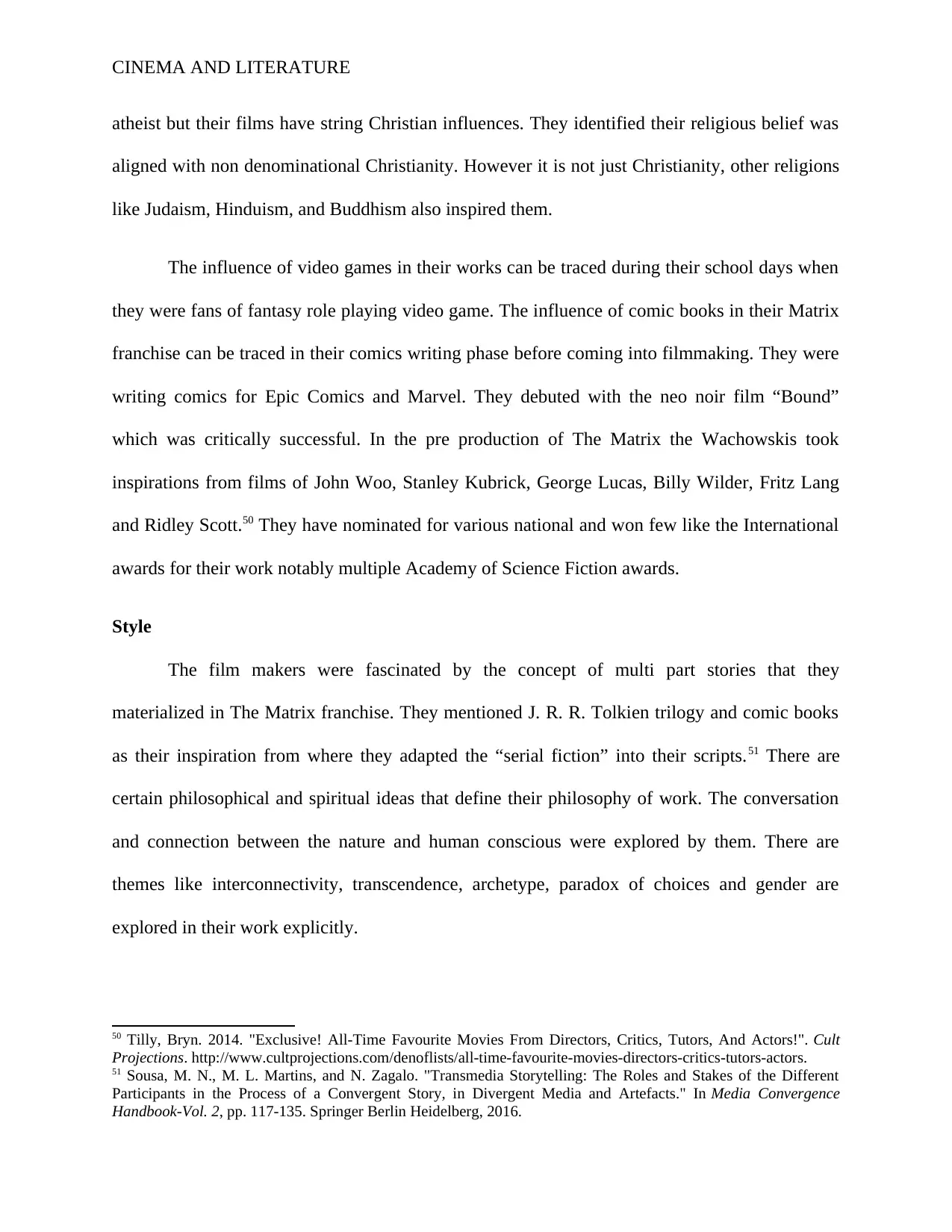
CINEMA AND LITERATURE
atheist but their films have string Christian influences. They identified their religious belief was
aligned with non denominational Christianity. However it is not just Christianity, other religions
like Judaism, Hinduism, and Buddhism also inspired them.
The influence of video games in their works can be traced during their school days when
they were fans of fantasy role playing video game. The influence of comic books in their Matrix
franchise can be traced in their comics writing phase before coming into filmmaking. They were
writing comics for Epic Comics and Marvel. They debuted with the neo noir film “Bound”
which was critically successful. In the pre production of The Matrix the Wachowskis took
inspirations from films of John Woo, Stanley Kubrick, George Lucas, Billy Wilder, Fritz Lang
and Ridley Scott.50 They have nominated for various national and won few like the International
awards for their work notably multiple Academy of Science Fiction awards.
Style
The film makers were fascinated by the concept of multi part stories that they
materialized in The Matrix franchise. They mentioned J. R. R. Tolkien trilogy and comic books
as their inspiration from where they adapted the “serial fiction” into their scripts.51 There are
certain philosophical and spiritual ideas that define their philosophy of work. The conversation
and connection between the nature and human conscious were explored by them. There are
themes like interconnectivity, transcendence, archetype, paradox of choices and gender are
explored in their work explicitly.
50 Tilly, Bryn. 2014. "Exclusive! All-Time Favourite Movies From Directors, Critics, Tutors, And Actors!". Cult
Projections. http://www.cultprojections.com/denoflists/all-time-favourite-movies-directors-critics-tutors-actors.
51 Sousa, M. N., M. L. Martins, and N. Zagalo. "Transmedia Storytelling: The Roles and Stakes of the Different
Participants in the Process of a Convergent Story, in Divergent Media and Artefacts." In Media Convergence
Handbook-Vol. 2, pp. 117-135. Springer Berlin Heidelberg, 2016.
atheist but their films have string Christian influences. They identified their religious belief was
aligned with non denominational Christianity. However it is not just Christianity, other religions
like Judaism, Hinduism, and Buddhism also inspired them.
The influence of video games in their works can be traced during their school days when
they were fans of fantasy role playing video game. The influence of comic books in their Matrix
franchise can be traced in their comics writing phase before coming into filmmaking. They were
writing comics for Epic Comics and Marvel. They debuted with the neo noir film “Bound”
which was critically successful. In the pre production of The Matrix the Wachowskis took
inspirations from films of John Woo, Stanley Kubrick, George Lucas, Billy Wilder, Fritz Lang
and Ridley Scott.50 They have nominated for various national and won few like the International
awards for their work notably multiple Academy of Science Fiction awards.
Style
The film makers were fascinated by the concept of multi part stories that they
materialized in The Matrix franchise. They mentioned J. R. R. Tolkien trilogy and comic books
as their inspiration from where they adapted the “serial fiction” into their scripts.51 There are
certain philosophical and spiritual ideas that define their philosophy of work. The conversation
and connection between the nature and human conscious were explored by them. There are
themes like interconnectivity, transcendence, archetype, paradox of choices and gender are
explored in their work explicitly.
50 Tilly, Bryn. 2014. "Exclusive! All-Time Favourite Movies From Directors, Critics, Tutors, And Actors!". Cult
Projections. http://www.cultprojections.com/denoflists/all-time-favourite-movies-directors-critics-tutors-actors.
51 Sousa, M. N., M. L. Martins, and N. Zagalo. "Transmedia Storytelling: The Roles and Stakes of the Different
Participants in the Process of a Convergent Story, in Divergent Media and Artefacts." In Media Convergence
Handbook-Vol. 2, pp. 117-135. Springer Berlin Heidelberg, 2016.
Secure Best Marks with AI Grader
Need help grading? Try our AI Grader for instant feedback on your assignments.
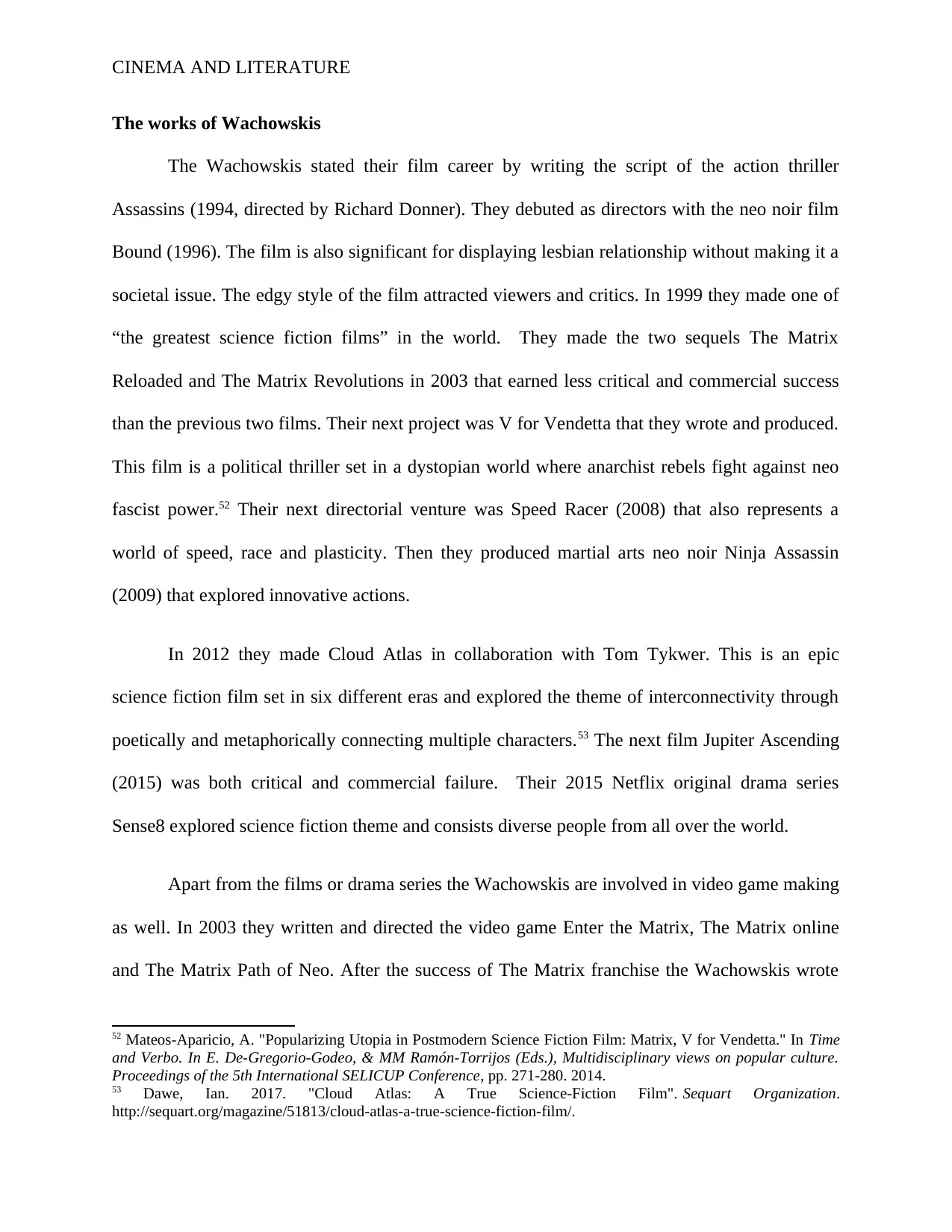
CINEMA AND LITERATURE
The works of Wachowskis
The Wachowskis stated their film career by writing the script of the action thriller
Assassins (1994, directed by Richard Donner). They debuted as directors with the neo noir film
Bound (1996). The film is also significant for displaying lesbian relationship without making it a
societal issue. The edgy style of the film attracted viewers and critics. In 1999 they made one of
“the greatest science fiction films” in the world. They made the two sequels The Matrix
Reloaded and The Matrix Revolutions in 2003 that earned less critical and commercial success
than the previous two films. Their next project was V for Vendetta that they wrote and produced.
This film is a political thriller set in a dystopian world where anarchist rebels fight against neo
fascist power.52 Their next directorial venture was Speed Racer (2008) that also represents a
world of speed, race and plasticity. Then they produced martial arts neo noir Ninja Assassin
(2009) that explored innovative actions.
In 2012 they made Cloud Atlas in collaboration with Tom Tykwer. This is an epic
science fiction film set in six different eras and explored the theme of interconnectivity through
poetically and metaphorically connecting multiple characters.53 The next film Jupiter Ascending
(2015) was both critical and commercial failure. Their 2015 Netflix original drama series
Sense8 explored science fiction theme and consists diverse people from all over the world.
Apart from the films or drama series the Wachowskis are involved in video game making
as well. In 2003 they written and directed the video game Enter the Matrix, The Matrix online
and The Matrix Path of Neo. After the success of The Matrix franchise the Wachowskis wrote
52 Mateos-Aparicio, A. "Popularizing Utopia in Postmodern Science Fiction Film: Matrix, V for Vendetta." In Time
and Verbo. In E. De-Gregorio-Godeo, & MM Ramón-Torrijos (Eds.), Multidisciplinary views on popular culture.
Proceedings of the 5th International SELICUP Conference, pp. 271-280. 2014.
53 Dawe, Ian. 2017. "Cloud Atlas: A True Science-Fiction Film". Sequart Organization.
http://sequart.org/magazine/51813/cloud-atlas-a-true-science-fiction-film/.
The works of Wachowskis
The Wachowskis stated their film career by writing the script of the action thriller
Assassins (1994, directed by Richard Donner). They debuted as directors with the neo noir film
Bound (1996). The film is also significant for displaying lesbian relationship without making it a
societal issue. The edgy style of the film attracted viewers and critics. In 1999 they made one of
“the greatest science fiction films” in the world. They made the two sequels The Matrix
Reloaded and The Matrix Revolutions in 2003 that earned less critical and commercial success
than the previous two films. Their next project was V for Vendetta that they wrote and produced.
This film is a political thriller set in a dystopian world where anarchist rebels fight against neo
fascist power.52 Their next directorial venture was Speed Racer (2008) that also represents a
world of speed, race and plasticity. Then they produced martial arts neo noir Ninja Assassin
(2009) that explored innovative actions.
In 2012 they made Cloud Atlas in collaboration with Tom Tykwer. This is an epic
science fiction film set in six different eras and explored the theme of interconnectivity through
poetically and metaphorically connecting multiple characters.53 The next film Jupiter Ascending
(2015) was both critical and commercial failure. Their 2015 Netflix original drama series
Sense8 explored science fiction theme and consists diverse people from all over the world.
Apart from the films or drama series the Wachowskis are involved in video game making
as well. In 2003 they written and directed the video game Enter the Matrix, The Matrix online
and The Matrix Path of Neo. After the success of The Matrix franchise the Wachowskis wrote
52 Mateos-Aparicio, A. "Popularizing Utopia in Postmodern Science Fiction Film: Matrix, V for Vendetta." In Time
and Verbo. In E. De-Gregorio-Godeo, & MM Ramón-Torrijos (Eds.), Multidisciplinary views on popular culture.
Proceedings of the 5th International SELICUP Conference, pp. 271-280. 2014.
53 Dawe, Ian. 2017. "Cloud Atlas: A True Science-Fiction Film". Sequart Organization.
http://sequart.org/magazine/51813/cloud-atlas-a-true-science-fiction-film/.
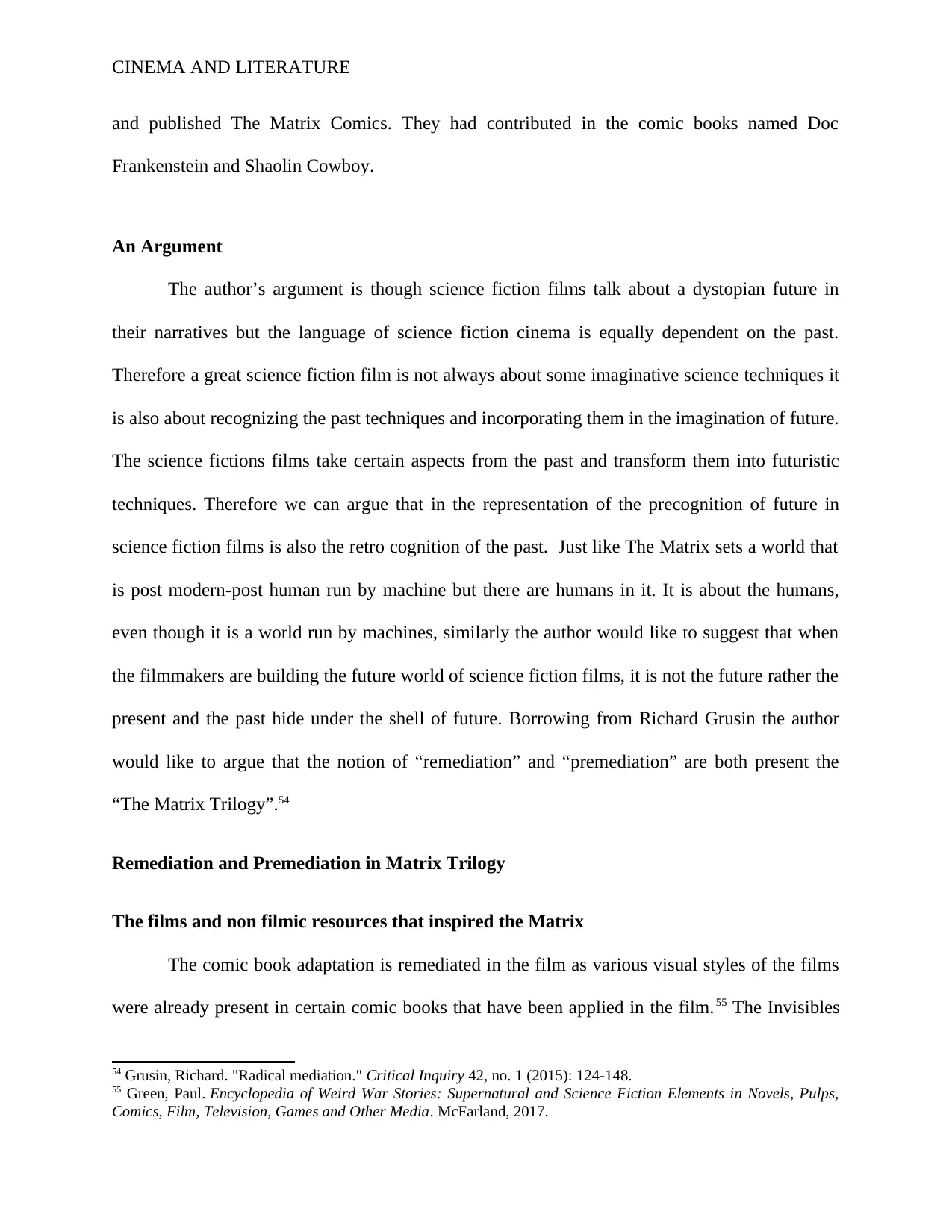
CINEMA AND LITERATURE
and published The Matrix Comics. They had contributed in the comic books named Doc
Frankenstein and Shaolin Cowboy.
An Argument
The author’s argument is though science fiction films talk about a dystopian future in
their narratives but the language of science fiction cinema is equally dependent on the past.
Therefore a great science fiction film is not always about some imaginative science techniques it
is also about recognizing the past techniques and incorporating them in the imagination of future.
The science fictions films take certain aspects from the past and transform them into futuristic
techniques. Therefore we can argue that in the representation of the precognition of future in
science fiction films is also the retro cognition of the past. Just like The Matrix sets a world that
is post modern-post human run by machine but there are humans in it. It is about the humans,
even though it is a world run by machines, similarly the author would like to suggest that when
the filmmakers are building the future world of science fiction films, it is not the future rather the
present and the past hide under the shell of future. Borrowing from Richard Grusin the author
would like to argue that the notion of “remediation” and “premediation” are both present the
“The Matrix Trilogy”.54
Remediation and Premediation in Matrix Trilogy
The films and non filmic resources that inspired the Matrix
The comic book adaptation is remediated in the film as various visual styles of the films
were already present in certain comic books that have been applied in the film.55 The Invisibles
54 Grusin, Richard. "Radical mediation." Critical Inquiry 42, no. 1 (2015): 124-148.
55 Green, Paul. Encyclopedia of Weird War Stories: Supernatural and Science Fiction Elements in Novels, Pulps,
Comics, Film, Television, Games and Other Media. McFarland, 2017.
and published The Matrix Comics. They had contributed in the comic books named Doc
Frankenstein and Shaolin Cowboy.
An Argument
The author’s argument is though science fiction films talk about a dystopian future in
their narratives but the language of science fiction cinema is equally dependent on the past.
Therefore a great science fiction film is not always about some imaginative science techniques it
is also about recognizing the past techniques and incorporating them in the imagination of future.
The science fictions films take certain aspects from the past and transform them into futuristic
techniques. Therefore we can argue that in the representation of the precognition of future in
science fiction films is also the retro cognition of the past. Just like The Matrix sets a world that
is post modern-post human run by machine but there are humans in it. It is about the humans,
even though it is a world run by machines, similarly the author would like to suggest that when
the filmmakers are building the future world of science fiction films, it is not the future rather the
present and the past hide under the shell of future. Borrowing from Richard Grusin the author
would like to argue that the notion of “remediation” and “premediation” are both present the
“The Matrix Trilogy”.54
Remediation and Premediation in Matrix Trilogy
The films and non filmic resources that inspired the Matrix
The comic book adaptation is remediated in the film as various visual styles of the films
were already present in certain comic books that have been applied in the film.55 The Invisibles
54 Grusin, Richard. "Radical mediation." Critical Inquiry 42, no. 1 (2015): 124-148.
55 Green, Paul. Encyclopedia of Weird War Stories: Supernatural and Science Fiction Elements in Novels, Pulps,
Comics, Film, Television, Games and Other Media. McFarland, 2017.
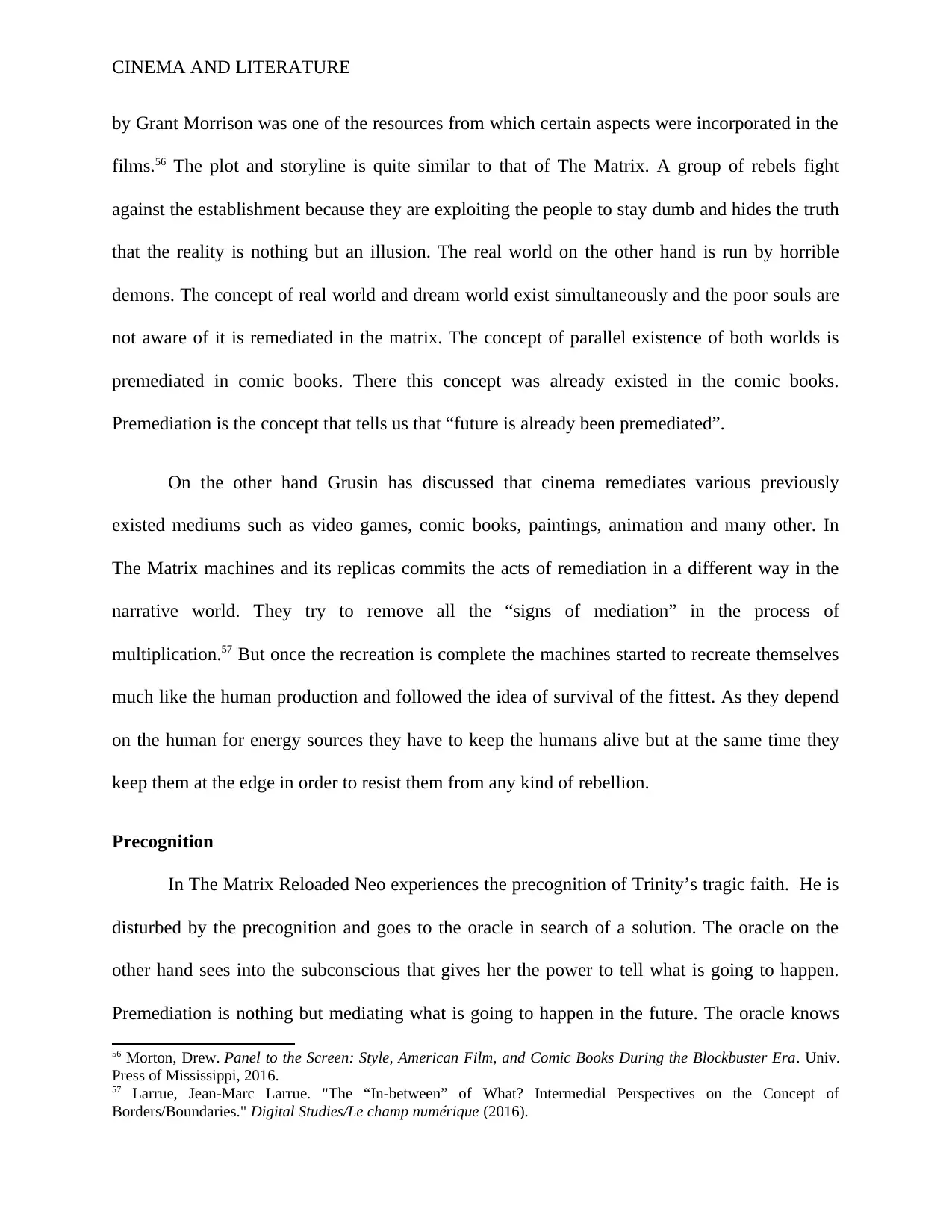
CINEMA AND LITERATURE
by Grant Morrison was one of the resources from which certain aspects were incorporated in the
films.56 The plot and storyline is quite similar to that of The Matrix. A group of rebels fight
against the establishment because they are exploiting the people to stay dumb and hides the truth
that the reality is nothing but an illusion. The real world on the other hand is run by horrible
demons. The concept of real world and dream world exist simultaneously and the poor souls are
not aware of it is remediated in the matrix. The concept of parallel existence of both worlds is
premediated in comic books. There this concept was already existed in the comic books.
Premediation is the concept that tells us that “future is already been premediated”.
On the other hand Grusin has discussed that cinema remediates various previously
existed mediums such as video games, comic books, paintings, animation and many other. In
The Matrix machines and its replicas commits the acts of remediation in a different way in the
narrative world. They try to remove all the “signs of mediation” in the process of
multiplication.57 But once the recreation is complete the machines started to recreate themselves
much like the human production and followed the idea of survival of the fittest. As they depend
on the human for energy sources they have to keep the humans alive but at the same time they
keep them at the edge in order to resist them from any kind of rebellion.
Precognition
In The Matrix Reloaded Neo experiences the precognition of Trinity’s tragic faith. He is
disturbed by the precognition and goes to the oracle in search of a solution. The oracle on the
other hand sees into the subconscious that gives her the power to tell what is going to happen.
Premediation is nothing but mediating what is going to happen in the future. The oracle knows
56 Morton, Drew. Panel to the Screen: Style, American Film, and Comic Books During the Blockbuster Era. Univ.
Press of Mississippi, 2016.
57 Larrue, Jean-Marc Larrue. "The “In-between” of What? Intermedial Perspectives on the Concept of
Borders/Boundaries." Digital Studies/Le champ numérique (2016).
by Grant Morrison was one of the resources from which certain aspects were incorporated in the
films.56 The plot and storyline is quite similar to that of The Matrix. A group of rebels fight
against the establishment because they are exploiting the people to stay dumb and hides the truth
that the reality is nothing but an illusion. The real world on the other hand is run by horrible
demons. The concept of real world and dream world exist simultaneously and the poor souls are
not aware of it is remediated in the matrix. The concept of parallel existence of both worlds is
premediated in comic books. There this concept was already existed in the comic books.
Premediation is the concept that tells us that “future is already been premediated”.
On the other hand Grusin has discussed that cinema remediates various previously
existed mediums such as video games, comic books, paintings, animation and many other. In
The Matrix machines and its replicas commits the acts of remediation in a different way in the
narrative world. They try to remove all the “signs of mediation” in the process of
multiplication.57 But once the recreation is complete the machines started to recreate themselves
much like the human production and followed the idea of survival of the fittest. As they depend
on the human for energy sources they have to keep the humans alive but at the same time they
keep them at the edge in order to resist them from any kind of rebellion.
Precognition
In The Matrix Reloaded Neo experiences the precognition of Trinity’s tragic faith. He is
disturbed by the precognition and goes to the oracle in search of a solution. The oracle on the
other hand sees into the subconscious that gives her the power to tell what is going to happen.
Premediation is nothing but mediating what is going to happen in the future. The oracle knows
56 Morton, Drew. Panel to the Screen: Style, American Film, and Comic Books During the Blockbuster Era. Univ.
Press of Mississippi, 2016.
57 Larrue, Jean-Marc Larrue. "The “In-between” of What? Intermedial Perspectives on the Concept of
Borders/Boundaries." Digital Studies/Le champ numérique (2016).
Paraphrase This Document
Need a fresh take? Get an instant paraphrase of this document with our AI Paraphraser
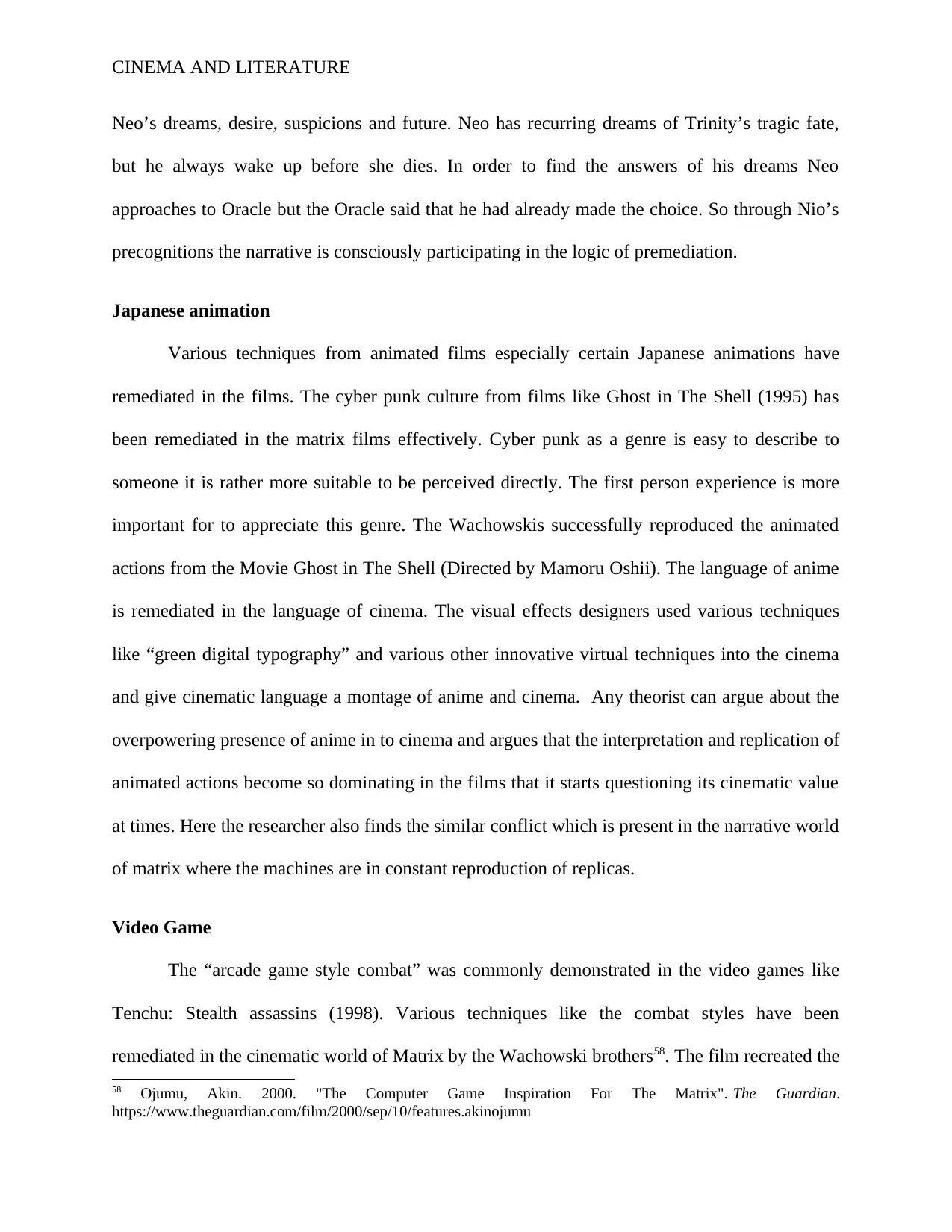
CINEMA AND LITERATURE
Neo’s dreams, desire, suspicions and future. Neo has recurring dreams of Trinity’s tragic fate,
but he always wake up before she dies. In order to find the answers of his dreams Neo
approaches to Oracle but the Oracle said that he had already made the choice. So through Nio’s
precognitions the narrative is consciously participating in the logic of premediation.
Japanese animation
Various techniques from animated films especially certain Japanese animations have
remediated in the films. The cyber punk culture from films like Ghost in The Shell (1995) has
been remediated in the matrix films effectively. Cyber punk as a genre is easy to describe to
someone it is rather more suitable to be perceived directly. The first person experience is more
important for to appreciate this genre. The Wachowskis successfully reproduced the animated
actions from the Movie Ghost in The Shell (Directed by Mamoru Oshii). The language of anime
is remediated in the language of cinema. The visual effects designers used various techniques
like “green digital typography” and various other innovative virtual techniques into the cinema
and give cinematic language a montage of anime and cinema. Any theorist can argue about the
overpowering presence of anime in to cinema and argues that the interpretation and replication of
animated actions become so dominating in the films that it starts questioning its cinematic value
at times. Here the researcher also finds the similar conflict which is present in the narrative world
of matrix where the machines are in constant reproduction of replicas.
Video Game
The “arcade game style combat” was commonly demonstrated in the video games like
Tenchu: Stealth assassins (1998). Various techniques like the combat styles have been
remediated in the cinematic world of Matrix by the Wachowski brothers58. The film recreated the
58 Ojumu, Akin. 2000. "The Computer Game Inspiration For The Matrix". The Guardian.
https://www.theguardian.com/film/2000/sep/10/features.akinojumu
Neo’s dreams, desire, suspicions and future. Neo has recurring dreams of Trinity’s tragic fate,
but he always wake up before she dies. In order to find the answers of his dreams Neo
approaches to Oracle but the Oracle said that he had already made the choice. So through Nio’s
precognitions the narrative is consciously participating in the logic of premediation.
Japanese animation
Various techniques from animated films especially certain Japanese animations have
remediated in the films. The cyber punk culture from films like Ghost in The Shell (1995) has
been remediated in the matrix films effectively. Cyber punk as a genre is easy to describe to
someone it is rather more suitable to be perceived directly. The first person experience is more
important for to appreciate this genre. The Wachowskis successfully reproduced the animated
actions from the Movie Ghost in The Shell (Directed by Mamoru Oshii). The language of anime
is remediated in the language of cinema. The visual effects designers used various techniques
like “green digital typography” and various other innovative virtual techniques into the cinema
and give cinematic language a montage of anime and cinema. Any theorist can argue about the
overpowering presence of anime in to cinema and argues that the interpretation and replication of
animated actions become so dominating in the films that it starts questioning its cinematic value
at times. Here the researcher also finds the similar conflict which is present in the narrative world
of matrix where the machines are in constant reproduction of replicas.
Video Game
The “arcade game style combat” was commonly demonstrated in the video games like
Tenchu: Stealth assassins (1998). Various techniques like the combat styles have been
remediated in the cinematic world of Matrix by the Wachowski brothers58. The film recreated the
58 Ojumu, Akin. 2000. "The Computer Game Inspiration For The Matrix". The Guardian.
https://www.theguardian.com/film/2000/sep/10/features.akinojumu
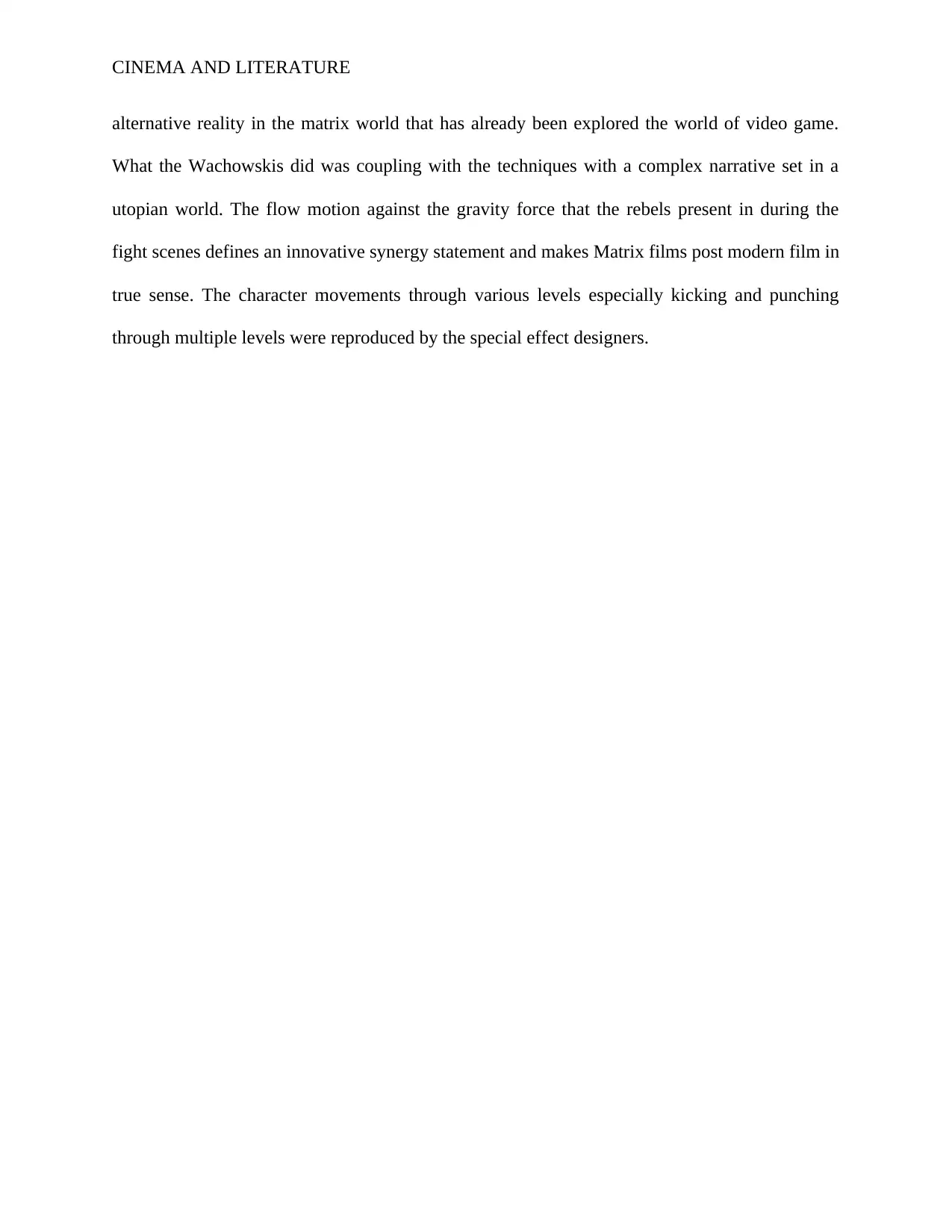
CINEMA AND LITERATURE
alternative reality in the matrix world that has already been explored the world of video game.
What the Wachowskis did was coupling with the techniques with a complex narrative set in a
utopian world. The flow motion against the gravity force that the rebels present in during the
fight scenes defines an innovative synergy statement and makes Matrix films post modern film in
true sense. The character movements through various levels especially kicking and punching
through multiple levels were reproduced by the special effect designers.
alternative reality in the matrix world that has already been explored the world of video game.
What the Wachowskis did was coupling with the techniques with a complex narrative set in a
utopian world. The flow motion against the gravity force that the rebels present in during the
fight scenes defines an innovative synergy statement and makes Matrix films post modern film in
true sense. The character movements through various levels especially kicking and punching
through multiple levels were reproduced by the special effect designers.
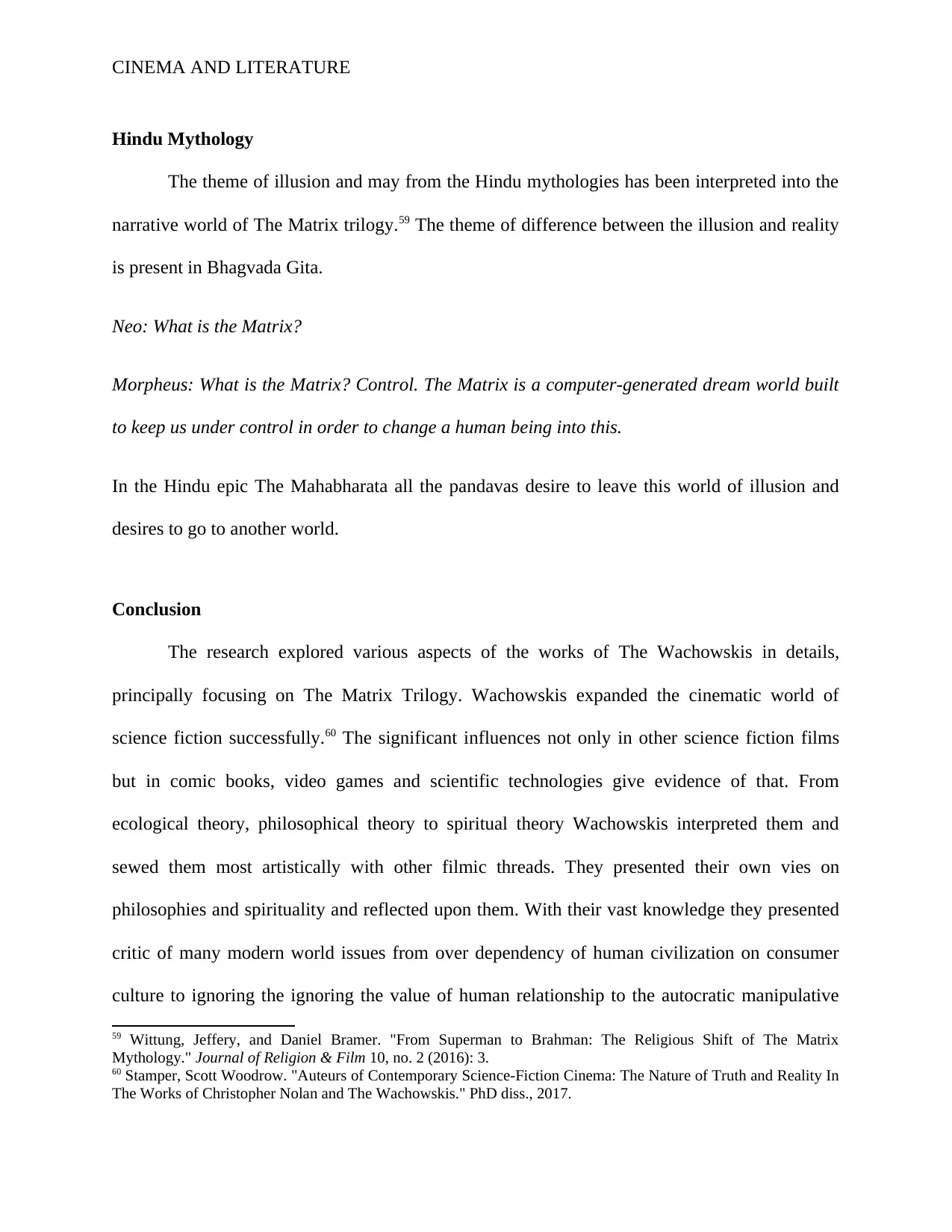
CINEMA AND LITERATURE
Hindu Mythology
The theme of illusion and may from the Hindu mythologies has been interpreted into the
narrative world of The Matrix trilogy.59 The theme of difference between the illusion and reality
is present in Bhagvada Gita.
Neo: What is the Matrix?
Morpheus: What is the Matrix? Control. The Matrix is a computer-generated dream world built
to keep us under control in order to change a human being into this.
In the Hindu epic The Mahabharata all the pandavas desire to leave this world of illusion and
desires to go to another world.
Conclusion
The research explored various aspects of the works of The Wachowskis in details,
principally focusing on The Matrix Trilogy. Wachowskis expanded the cinematic world of
science fiction successfully.60 The significant influences not only in other science fiction films
but in comic books, video games and scientific technologies give evidence of that. From
ecological theory, philosophical theory to spiritual theory Wachowskis interpreted them and
sewed them most artistically with other filmic threads. They presented their own vies on
philosophies and spirituality and reflected upon them. With their vast knowledge they presented
critic of many modern world issues from over dependency of human civilization on consumer
culture to ignoring the ignoring the value of human relationship to the autocratic manipulative
59 Wittung, Jeffery, and Daniel Bramer. "From Superman to Brahman: The Religious Shift of The Matrix
Mythology." Journal of Religion & Film 10, no. 2 (2016): 3.
60 Stamper, Scott Woodrow. "Auteurs of Contemporary Science-Fiction Cinema: The Nature of Truth and Reality In
The Works of Christopher Nolan and The Wachowskis." PhD diss., 2017.
Hindu Mythology
The theme of illusion and may from the Hindu mythologies has been interpreted into the
narrative world of The Matrix trilogy.59 The theme of difference between the illusion and reality
is present in Bhagvada Gita.
Neo: What is the Matrix?
Morpheus: What is the Matrix? Control. The Matrix is a computer-generated dream world built
to keep us under control in order to change a human being into this.
In the Hindu epic The Mahabharata all the pandavas desire to leave this world of illusion and
desires to go to another world.
Conclusion
The research explored various aspects of the works of The Wachowskis in details,
principally focusing on The Matrix Trilogy. Wachowskis expanded the cinematic world of
science fiction successfully.60 The significant influences not only in other science fiction films
but in comic books, video games and scientific technologies give evidence of that. From
ecological theory, philosophical theory to spiritual theory Wachowskis interpreted them and
sewed them most artistically with other filmic threads. They presented their own vies on
philosophies and spirituality and reflected upon them. With their vast knowledge they presented
critic of many modern world issues from over dependency of human civilization on consumer
culture to ignoring the ignoring the value of human relationship to the autocratic manipulative
59 Wittung, Jeffery, and Daniel Bramer. "From Superman to Brahman: The Religious Shift of The Matrix
Mythology." Journal of Religion & Film 10, no. 2 (2016): 3.
60 Stamper, Scott Woodrow. "Auteurs of Contemporary Science-Fiction Cinema: The Nature of Truth and Reality In
The Works of Christopher Nolan and The Wachowskis." PhD diss., 2017.
Secure Best Marks with AI Grader
Need help grading? Try our AI Grader for instant feedback on your assignments.
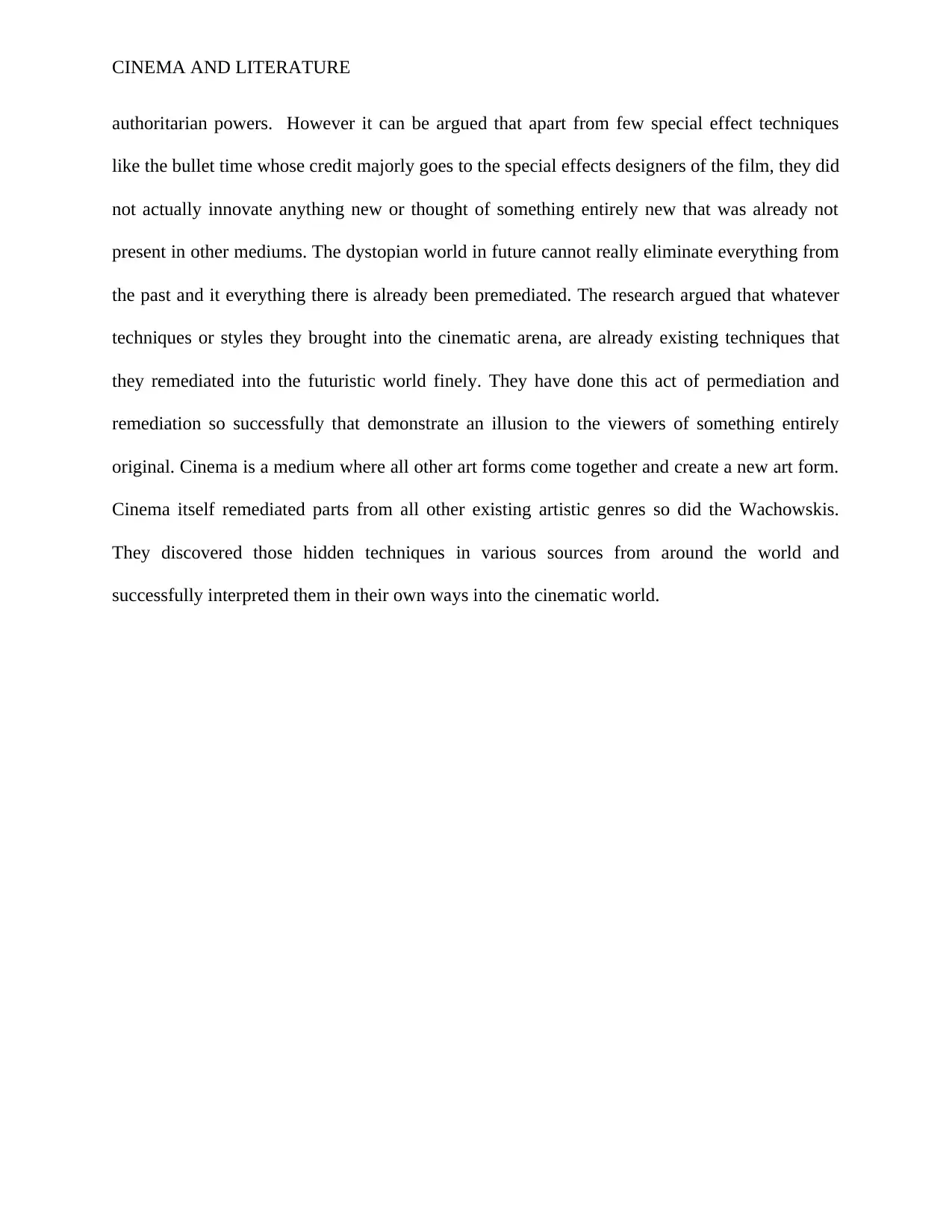
CINEMA AND LITERATURE
authoritarian powers. However it can be argued that apart from few special effect techniques
like the bullet time whose credit majorly goes to the special effects designers of the film, they did
not actually innovate anything new or thought of something entirely new that was already not
present in other mediums. The dystopian world in future cannot really eliminate everything from
the past and it everything there is already been premediated. The research argued that whatever
techniques or styles they brought into the cinematic arena, are already existing techniques that
they remediated into the futuristic world finely. They have done this act of permediation and
remediation so successfully that demonstrate an illusion to the viewers of something entirely
original. Cinema is a medium where all other art forms come together and create a new art form.
Cinema itself remediated parts from all other existing artistic genres so did the Wachowskis.
They discovered those hidden techniques in various sources from around the world and
successfully interpreted them in their own ways into the cinematic world.
authoritarian powers. However it can be argued that apart from few special effect techniques
like the bullet time whose credit majorly goes to the special effects designers of the film, they did
not actually innovate anything new or thought of something entirely new that was already not
present in other mediums. The dystopian world in future cannot really eliminate everything from
the past and it everything there is already been premediated. The research argued that whatever
techniques or styles they brought into the cinematic arena, are already existing techniques that
they remediated into the futuristic world finely. They have done this act of permediation and
remediation so successfully that demonstrate an illusion to the viewers of something entirely
original. Cinema is a medium where all other art forms come together and create a new art form.
Cinema itself remediated parts from all other existing artistic genres so did the Wachowskis.
They discovered those hidden techniques in various sources from around the world and
successfully interpreted them in their own ways into the cinematic world.
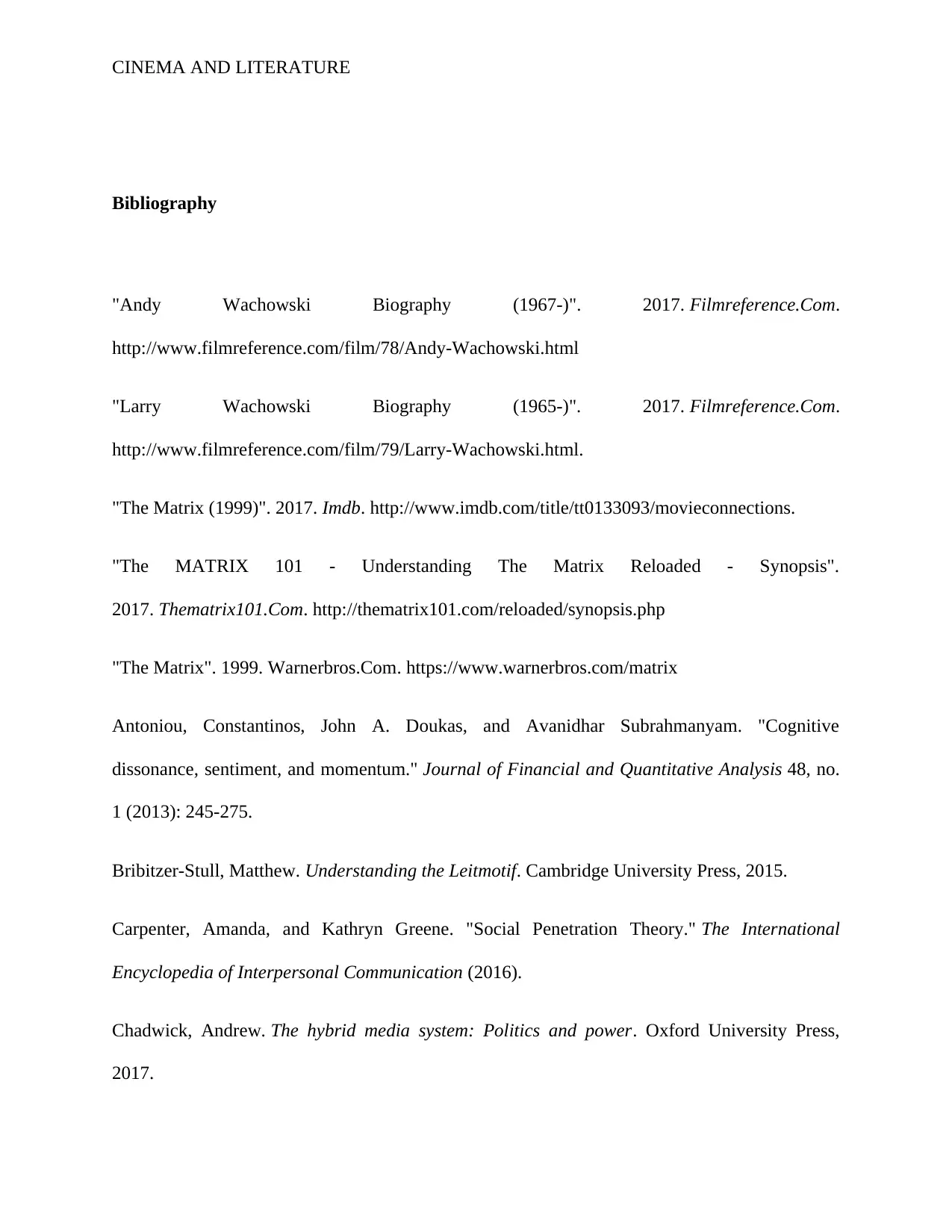
CINEMA AND LITERATURE
Bibliography
"Andy Wachowski Biography (1967-)". 2017. Filmreference.Com.
http://www.filmreference.com/film/78/Andy-Wachowski.html
"Larry Wachowski Biography (1965-)". 2017. Filmreference.Com.
http://www.filmreference.com/film/79/Larry-Wachowski.html.
"The Matrix (1999)". 2017. Imdb. http://www.imdb.com/title/tt0133093/movieconnections.
"The MATRIX 101 - Understanding The Matrix Reloaded - Synopsis".
2017. Thematrix101.Com. http://thematrix101.com/reloaded/synopsis.php
"The Matrix". 1999. Warnerbros.Com. https://www.warnerbros.com/matrix
Antoniou, Constantinos, John A. Doukas, and Avanidhar Subrahmanyam. "Cognitive
dissonance, sentiment, and momentum." Journal of Financial and Quantitative Analysis 48, no.
1 (2013): 245-275.
Bribitzer-Stull, Matthew. Understanding the Leitmotif. Cambridge University Press, 2015.
Carpenter, Amanda, and Kathryn Greene. "Social Penetration Theory." The International
Encyclopedia of Interpersonal Communication (2016).
Chadwick, Andrew. The hybrid media system: Politics and power. Oxford University Press,
2017.
Bibliography
"Andy Wachowski Biography (1967-)". 2017. Filmreference.Com.
http://www.filmreference.com/film/78/Andy-Wachowski.html
"Larry Wachowski Biography (1965-)". 2017. Filmreference.Com.
http://www.filmreference.com/film/79/Larry-Wachowski.html.
"The Matrix (1999)". 2017. Imdb. http://www.imdb.com/title/tt0133093/movieconnections.
"The MATRIX 101 - Understanding The Matrix Reloaded - Synopsis".
2017. Thematrix101.Com. http://thematrix101.com/reloaded/synopsis.php
"The Matrix". 1999. Warnerbros.Com. https://www.warnerbros.com/matrix
Antoniou, Constantinos, John A. Doukas, and Avanidhar Subrahmanyam. "Cognitive
dissonance, sentiment, and momentum." Journal of Financial and Quantitative Analysis 48, no.
1 (2013): 245-275.
Bribitzer-Stull, Matthew. Understanding the Leitmotif. Cambridge University Press, 2015.
Carpenter, Amanda, and Kathryn Greene. "Social Penetration Theory." The International
Encyclopedia of Interpersonal Communication (2016).
Chadwick, Andrew. The hybrid media system: Politics and power. Oxford University Press,
2017.
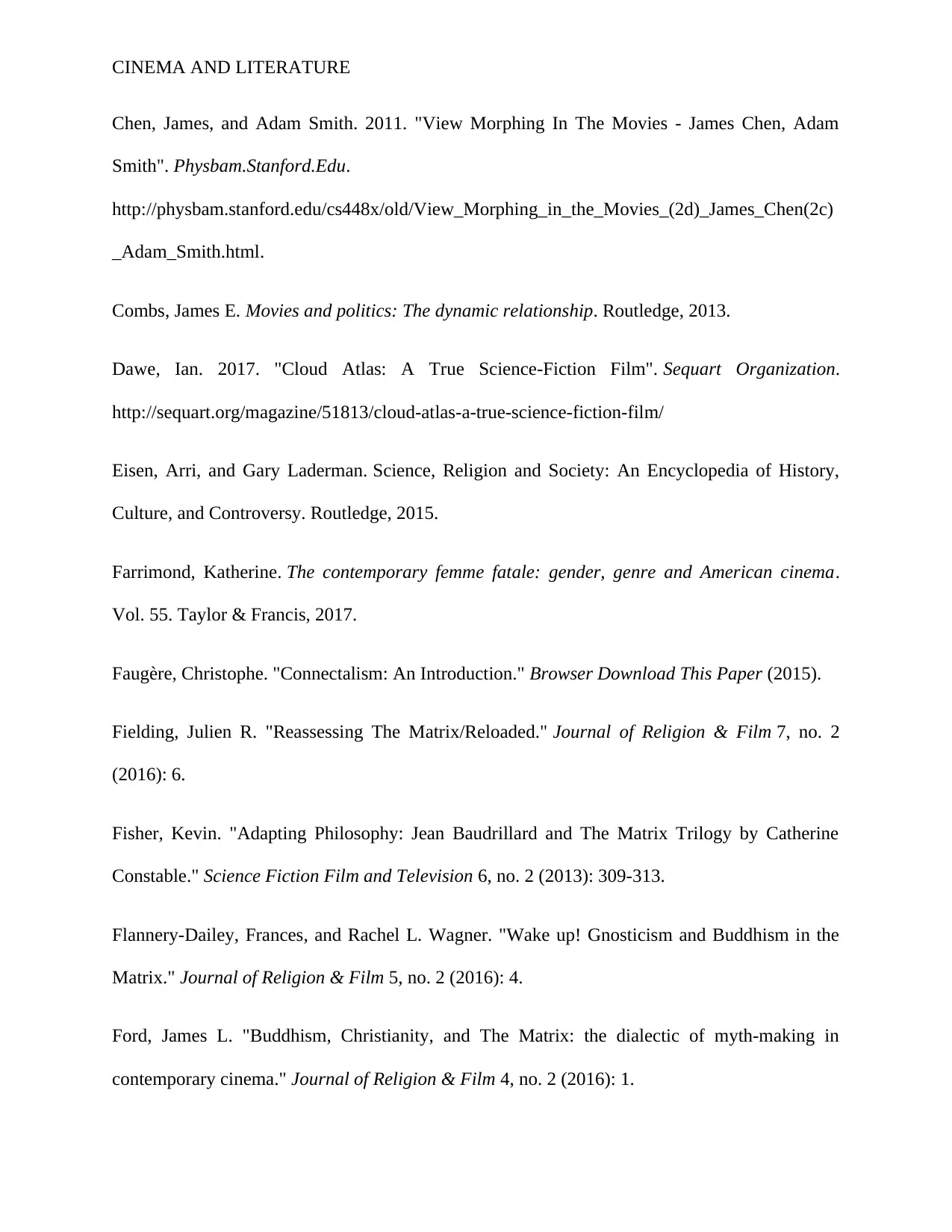
CINEMA AND LITERATURE
Chen, James, and Adam Smith. 2011. "View Morphing In The Movies - James Chen, Adam
Smith". Physbam.Stanford.Edu.
http://physbam.stanford.edu/cs448x/old/View_Morphing_in_the_Movies_(2d)_James_Chen(2c)
_Adam_Smith.html.
Combs, James E. Movies and politics: The dynamic relationship. Routledge, 2013.
Dawe, Ian. 2017. "Cloud Atlas: A True Science-Fiction Film". Sequart Organization.
http://sequart.org/magazine/51813/cloud-atlas-a-true-science-fiction-film/
Eisen, Arri, and Gary Laderman. Science, Religion and Society: An Encyclopedia of History,
Culture, and Controversy. Routledge, 2015.
Farrimond, Katherine. The contemporary femme fatale: gender, genre and American cinema.
Vol. 55. Taylor & Francis, 2017.
Faugère, Christophe. "Connectalism: An Introduction." Browser Download This Paper (2015).
Fielding, Julien R. "Reassessing The Matrix/Reloaded." Journal of Religion & Film 7, no. 2
(2016): 6.
Fisher, Kevin. "Adapting Philosophy: Jean Baudrillard and The Matrix Trilogy by Catherine
Constable." Science Fiction Film and Television 6, no. 2 (2013): 309-313.
Flannery-Dailey, Frances, and Rachel L. Wagner. "Wake up! Gnosticism and Buddhism in the
Matrix." Journal of Religion & Film 5, no. 2 (2016): 4.
Ford, James L. "Buddhism, Christianity, and The Matrix: the dialectic of myth-making in
contemporary cinema." Journal of Religion & Film 4, no. 2 (2016): 1.
Chen, James, and Adam Smith. 2011. "View Morphing In The Movies - James Chen, Adam
Smith". Physbam.Stanford.Edu.
http://physbam.stanford.edu/cs448x/old/View_Morphing_in_the_Movies_(2d)_James_Chen(2c)
_Adam_Smith.html.
Combs, James E. Movies and politics: The dynamic relationship. Routledge, 2013.
Dawe, Ian. 2017. "Cloud Atlas: A True Science-Fiction Film". Sequart Organization.
http://sequart.org/magazine/51813/cloud-atlas-a-true-science-fiction-film/
Eisen, Arri, and Gary Laderman. Science, Religion and Society: An Encyclopedia of History,
Culture, and Controversy. Routledge, 2015.
Farrimond, Katherine. The contemporary femme fatale: gender, genre and American cinema.
Vol. 55. Taylor & Francis, 2017.
Faugère, Christophe. "Connectalism: An Introduction." Browser Download This Paper (2015).
Fielding, Julien R. "Reassessing The Matrix/Reloaded." Journal of Religion & Film 7, no. 2
(2016): 6.
Fisher, Kevin. "Adapting Philosophy: Jean Baudrillard and The Matrix Trilogy by Catherine
Constable." Science Fiction Film and Television 6, no. 2 (2013): 309-313.
Flannery-Dailey, Frances, and Rachel L. Wagner. "Wake up! Gnosticism and Buddhism in the
Matrix." Journal of Religion & Film 5, no. 2 (2016): 4.
Ford, James L. "Buddhism, Christianity, and The Matrix: the dialectic of myth-making in
contemporary cinema." Journal of Religion & Film 4, no. 2 (2016): 1.
Paraphrase This Document
Need a fresh take? Get an instant paraphrase of this document with our AI Paraphraser
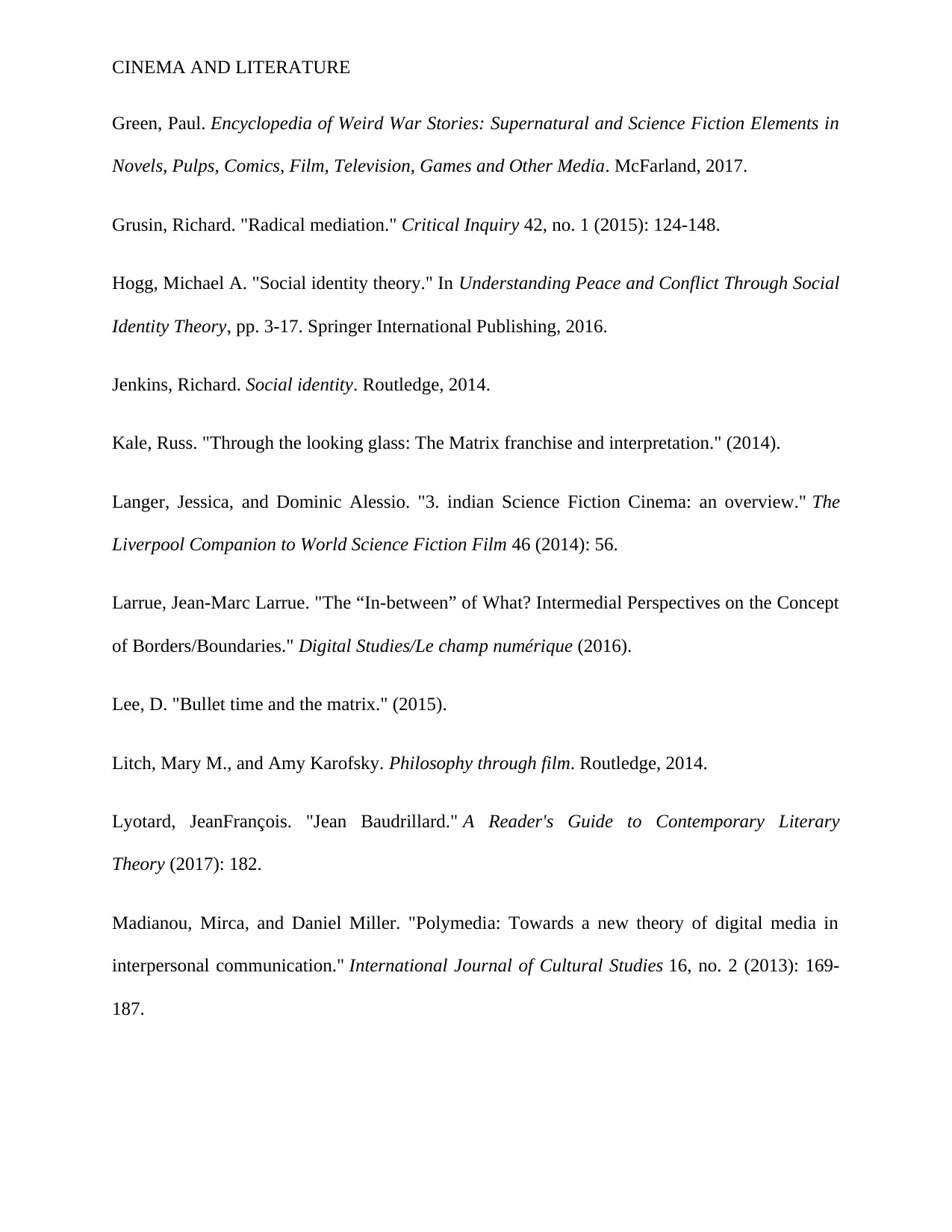
CINEMA AND LITERATURE
Green, Paul. Encyclopedia of Weird War Stories: Supernatural and Science Fiction Elements in
Novels, Pulps, Comics, Film, Television, Games and Other Media. McFarland, 2017.
Grusin, Richard. "Radical mediation." Critical Inquiry 42, no. 1 (2015): 124-148.
Hogg, Michael A. "Social identity theory." In Understanding Peace and Conflict Through Social
Identity Theory, pp. 3-17. Springer International Publishing, 2016.
Jenkins, Richard. Social identity. Routledge, 2014.
Kale, Russ. "Through the looking glass: The Matrix franchise and interpretation." (2014).
Langer, Jessica, and Dominic Alessio. "3. indian Science Fiction Cinema: an overview." The
Liverpool Companion to World Science Fiction Film 46 (2014): 56.
Larrue, Jean-Marc Larrue. "The “In-between” of What? Intermedial Perspectives on the Concept
of Borders/Boundaries." Digital Studies/Le champ numérique (2016).
Lee, D. "Bullet time and the matrix." (2015).
Litch, Mary M., and Amy Karofsky. Philosophy through film. Routledge, 2014.
Lyotard, JeanFrançois. "Jean Baudrillard." A Reader's Guide to Contemporary Literary
Theory (2017): 182.
Madianou, Mirca, and Daniel Miller. "Polymedia: Towards a new theory of digital media in
interpersonal communication." International Journal of Cultural Studies 16, no. 2 (2013): 169-
187.
Green, Paul. Encyclopedia of Weird War Stories: Supernatural and Science Fiction Elements in
Novels, Pulps, Comics, Film, Television, Games and Other Media. McFarland, 2017.
Grusin, Richard. "Radical mediation." Critical Inquiry 42, no. 1 (2015): 124-148.
Hogg, Michael A. "Social identity theory." In Understanding Peace and Conflict Through Social
Identity Theory, pp. 3-17. Springer International Publishing, 2016.
Jenkins, Richard. Social identity. Routledge, 2014.
Kale, Russ. "Through the looking glass: The Matrix franchise and interpretation." (2014).
Langer, Jessica, and Dominic Alessio. "3. indian Science Fiction Cinema: an overview." The
Liverpool Companion to World Science Fiction Film 46 (2014): 56.
Larrue, Jean-Marc Larrue. "The “In-between” of What? Intermedial Perspectives on the Concept
of Borders/Boundaries." Digital Studies/Le champ numérique (2016).
Lee, D. "Bullet time and the matrix." (2015).
Litch, Mary M., and Amy Karofsky. Philosophy through film. Routledge, 2014.
Lyotard, JeanFrançois. "Jean Baudrillard." A Reader's Guide to Contemporary Literary
Theory (2017): 182.
Madianou, Mirca, and Daniel Miller. "Polymedia: Towards a new theory of digital media in
interpersonal communication." International Journal of Cultural Studies 16, no. 2 (2013): 169-
187.
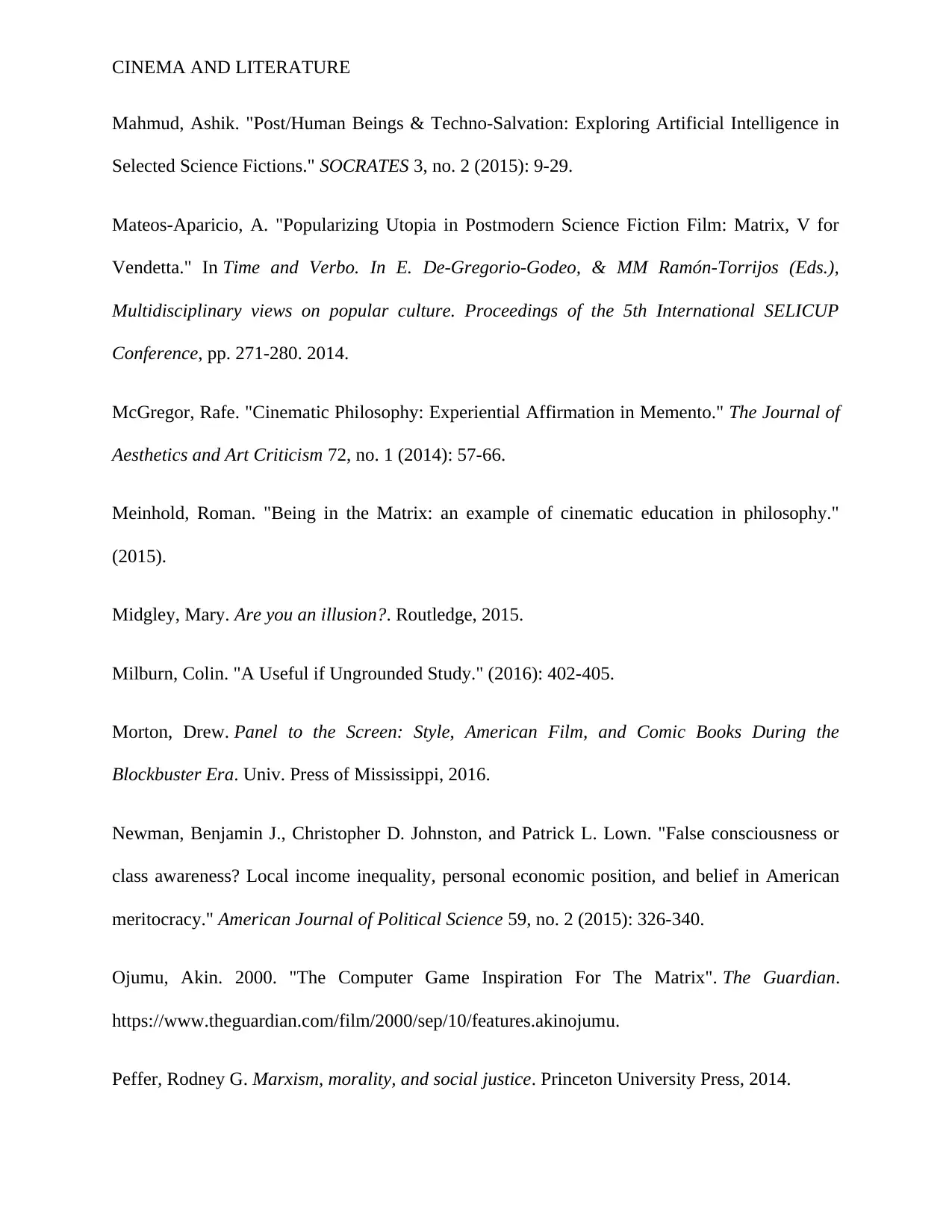
CINEMA AND LITERATURE
Mahmud, Ashik. "Post/Human Beings & Techno-Salvation: Exploring Artificial Intelligence in
Selected Science Fictions." SOCRATES 3, no. 2 (2015): 9-29.
Mateos-Aparicio, A. "Popularizing Utopia in Postmodern Science Fiction Film: Matrix, V for
Vendetta." In Time and Verbo. In E. De-Gregorio-Godeo, & MM Ramón-Torrijos (Eds.),
Multidisciplinary views on popular culture. Proceedings of the 5th International SELICUP
Conference, pp. 271-280. 2014.
McGregor, Rafe. "Cinematic Philosophy: Experiential Affirmation in Memento." The Journal of
Aesthetics and Art Criticism 72, no. 1 (2014): 57-66.
Meinhold, Roman. "Being in the Matrix: an example of cinematic education in philosophy."
(2015).
Midgley, Mary. Are you an illusion?. Routledge, 2015.
Milburn, Colin. "A Useful if Ungrounded Study." (2016): 402-405.
Morton, Drew. Panel to the Screen: Style, American Film, and Comic Books During the
Blockbuster Era. Univ. Press of Mississippi, 2016.
Newman, Benjamin J., Christopher D. Johnston, and Patrick L. Lown. "False consciousness or
class awareness? Local income inequality, personal economic position, and belief in American
meritocracy." American Journal of Political Science 59, no. 2 (2015): 326-340.
Ojumu, Akin. 2000. "The Computer Game Inspiration For The Matrix". The Guardian.
https://www.theguardian.com/film/2000/sep/10/features.akinojumu.
Peffer, Rodney G. Marxism, morality, and social justice. Princeton University Press, 2014.
Mahmud, Ashik. "Post/Human Beings & Techno-Salvation: Exploring Artificial Intelligence in
Selected Science Fictions." SOCRATES 3, no. 2 (2015): 9-29.
Mateos-Aparicio, A. "Popularizing Utopia in Postmodern Science Fiction Film: Matrix, V for
Vendetta." In Time and Verbo. In E. De-Gregorio-Godeo, & MM Ramón-Torrijos (Eds.),
Multidisciplinary views on popular culture. Proceedings of the 5th International SELICUP
Conference, pp. 271-280. 2014.
McGregor, Rafe. "Cinematic Philosophy: Experiential Affirmation in Memento." The Journal of
Aesthetics and Art Criticism 72, no. 1 (2014): 57-66.
Meinhold, Roman. "Being in the Matrix: an example of cinematic education in philosophy."
(2015).
Midgley, Mary. Are you an illusion?. Routledge, 2015.
Milburn, Colin. "A Useful if Ungrounded Study." (2016): 402-405.
Morton, Drew. Panel to the Screen: Style, American Film, and Comic Books During the
Blockbuster Era. Univ. Press of Mississippi, 2016.
Newman, Benjamin J., Christopher D. Johnston, and Patrick L. Lown. "False consciousness or
class awareness? Local income inequality, personal economic position, and belief in American
meritocracy." American Journal of Political Science 59, no. 2 (2015): 326-340.
Ojumu, Akin. 2000. "The Computer Game Inspiration For The Matrix". The Guardian.
https://www.theguardian.com/film/2000/sep/10/features.akinojumu.
Peffer, Rodney G. Marxism, morality, and social justice. Princeton University Press, 2014.
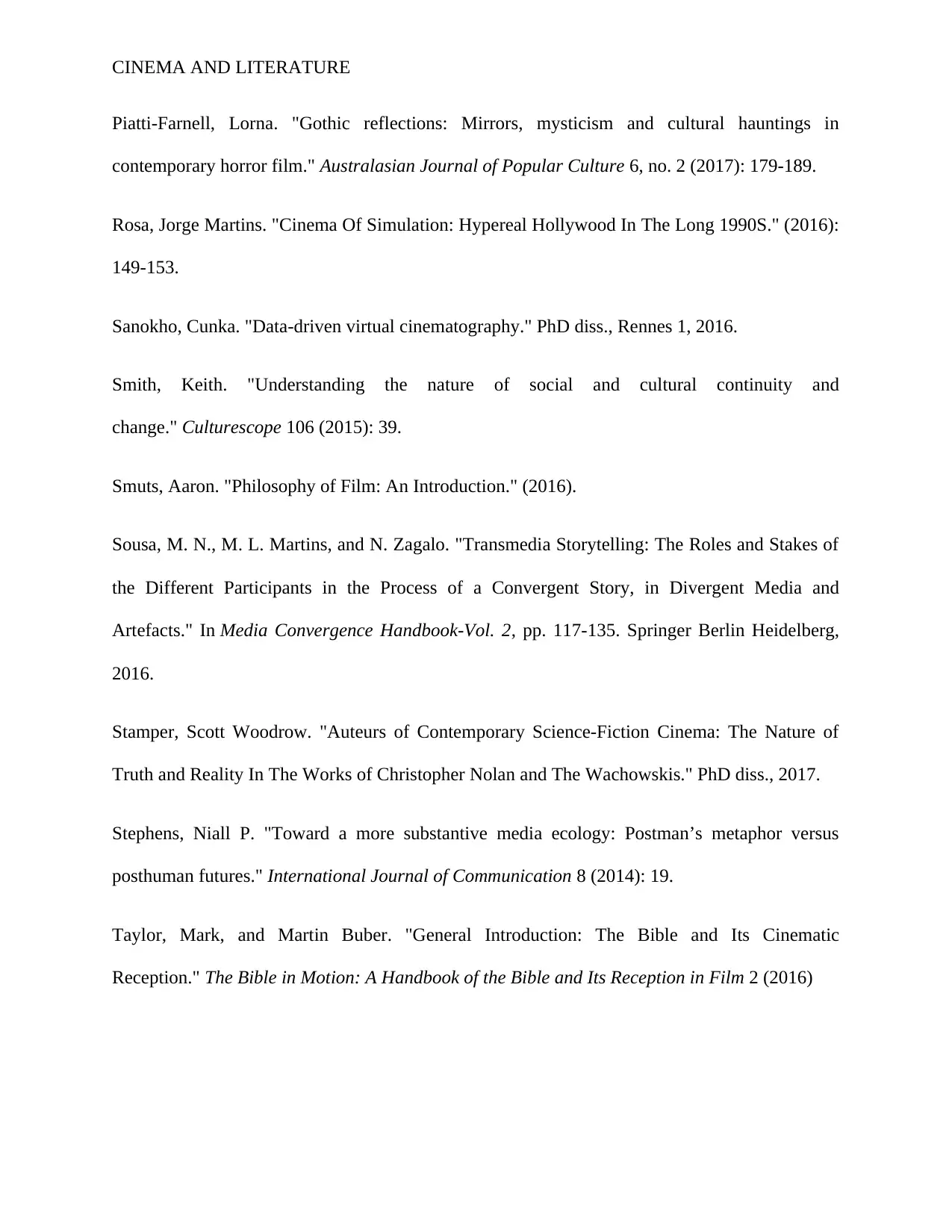
CINEMA AND LITERATURE
Piatti-Farnell, Lorna. "Gothic reflections: Mirrors, mysticism and cultural hauntings in
contemporary horror film." Australasian Journal of Popular Culture 6, no. 2 (2017): 179-189.
Rosa, Jorge Martins. "Cinema Of Simulation: Hypereal Hollywood In The Long 1990S." (2016):
149-153.
Sanokho, Cunka. "Data-driven virtual cinematography." PhD diss., Rennes 1, 2016.
Smith, Keith. "Understanding the nature of social and cultural continuity and
change." Culturescope 106 (2015): 39.
Smuts, Aaron. "Philosophy of Film: An Introduction." (2016).
Sousa, M. N., M. L. Martins, and N. Zagalo. "Transmedia Storytelling: The Roles and Stakes of
the Different Participants in the Process of a Convergent Story, in Divergent Media and
Artefacts." In Media Convergence Handbook-Vol. 2, pp. 117-135. Springer Berlin Heidelberg,
2016.
Stamper, Scott Woodrow. "Auteurs of Contemporary Science-Fiction Cinema: The Nature of
Truth and Reality In The Works of Christopher Nolan and The Wachowskis." PhD diss., 2017.
Stephens, Niall P. "Toward a more substantive media ecology: Postman’s metaphor versus
posthuman futures." International Journal of Communication 8 (2014): 19.
Taylor, Mark, and Martin Buber. "General Introduction: The Bible and Its Cinematic
Reception." The Bible in Motion: A Handbook of the Bible and Its Reception in Film 2 (2016)
Piatti-Farnell, Lorna. "Gothic reflections: Mirrors, mysticism and cultural hauntings in
contemporary horror film." Australasian Journal of Popular Culture 6, no. 2 (2017): 179-189.
Rosa, Jorge Martins. "Cinema Of Simulation: Hypereal Hollywood In The Long 1990S." (2016):
149-153.
Sanokho, Cunka. "Data-driven virtual cinematography." PhD diss., Rennes 1, 2016.
Smith, Keith. "Understanding the nature of social and cultural continuity and
change." Culturescope 106 (2015): 39.
Smuts, Aaron. "Philosophy of Film: An Introduction." (2016).
Sousa, M. N., M. L. Martins, and N. Zagalo. "Transmedia Storytelling: The Roles and Stakes of
the Different Participants in the Process of a Convergent Story, in Divergent Media and
Artefacts." In Media Convergence Handbook-Vol. 2, pp. 117-135. Springer Berlin Heidelberg,
2016.
Stamper, Scott Woodrow. "Auteurs of Contemporary Science-Fiction Cinema: The Nature of
Truth and Reality In The Works of Christopher Nolan and The Wachowskis." PhD diss., 2017.
Stephens, Niall P. "Toward a more substantive media ecology: Postman’s metaphor versus
posthuman futures." International Journal of Communication 8 (2014): 19.
Taylor, Mark, and Martin Buber. "General Introduction: The Bible and Its Cinematic
Reception." The Bible in Motion: A Handbook of the Bible and Its Reception in Film 2 (2016)
Secure Best Marks with AI Grader
Need help grading? Try our AI Grader for instant feedback on your assignments.
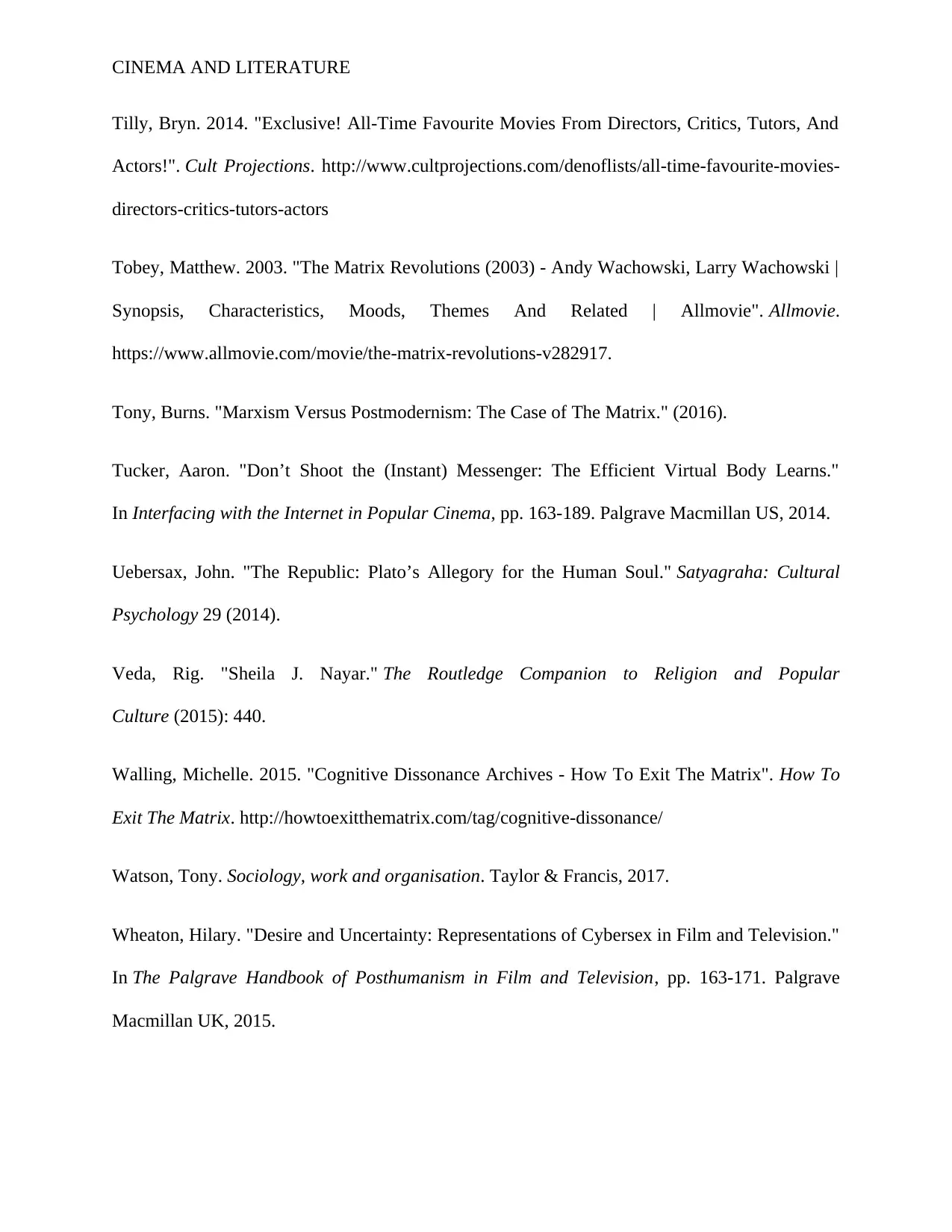
CINEMA AND LITERATURE
Tilly, Bryn. 2014. "Exclusive! All-Time Favourite Movies From Directors, Critics, Tutors, And
Actors!". Cult Projections. http://www.cultprojections.com/denoflists/all-time-favourite-movies-
directors-critics-tutors-actors
Tobey, Matthew. 2003. "The Matrix Revolutions (2003) - Andy Wachowski, Larry Wachowski |
Synopsis, Characteristics, Moods, Themes And Related | Allmovie". Allmovie.
https://www.allmovie.com/movie/the-matrix-revolutions-v282917.
Tony, Burns. "Marxism Versus Postmodernism: The Case of The Matrix." (2016).
Tucker, Aaron. "Don’t Shoot the (Instant) Messenger: The Efficient Virtual Body Learns."
In Interfacing with the Internet in Popular Cinema, pp. 163-189. Palgrave Macmillan US, 2014.
Uebersax, John. "The Republic: Plato’s Allegory for the Human Soul." Satyagraha: Cultural
Psychology 29 (2014).
Veda, Rig. "Sheila J. Nayar." The Routledge Companion to Religion and Popular
Culture (2015): 440.
Walling, Michelle. 2015. "Cognitive Dissonance Archives - How To Exit The Matrix". How To
Exit The Matrix. http://howtoexitthematrix.com/tag/cognitive-dissonance/
Watson, Tony. Sociology, work and organisation. Taylor & Francis, 2017.
Wheaton, Hilary. "Desire and Uncertainty: Representations of Cybersex in Film and Television."
In The Palgrave Handbook of Posthumanism in Film and Television, pp. 163-171. Palgrave
Macmillan UK, 2015.
Tilly, Bryn. 2014. "Exclusive! All-Time Favourite Movies From Directors, Critics, Tutors, And
Actors!". Cult Projections. http://www.cultprojections.com/denoflists/all-time-favourite-movies-
directors-critics-tutors-actors
Tobey, Matthew. 2003. "The Matrix Revolutions (2003) - Andy Wachowski, Larry Wachowski |
Synopsis, Characteristics, Moods, Themes And Related | Allmovie". Allmovie.
https://www.allmovie.com/movie/the-matrix-revolutions-v282917.
Tony, Burns. "Marxism Versus Postmodernism: The Case of The Matrix." (2016).
Tucker, Aaron. "Don’t Shoot the (Instant) Messenger: The Efficient Virtual Body Learns."
In Interfacing with the Internet in Popular Cinema, pp. 163-189. Palgrave Macmillan US, 2014.
Uebersax, John. "The Republic: Plato’s Allegory for the Human Soul." Satyagraha: Cultural
Psychology 29 (2014).
Veda, Rig. "Sheila J. Nayar." The Routledge Companion to Religion and Popular
Culture (2015): 440.
Walling, Michelle. 2015. "Cognitive Dissonance Archives - How To Exit The Matrix". How To
Exit The Matrix. http://howtoexitthematrix.com/tag/cognitive-dissonance/
Watson, Tony. Sociology, work and organisation. Taylor & Francis, 2017.
Wheaton, Hilary. "Desire and Uncertainty: Representations of Cybersex in Film and Television."
In The Palgrave Handbook of Posthumanism in Film and Television, pp. 163-171. Palgrave
Macmillan UK, 2015.
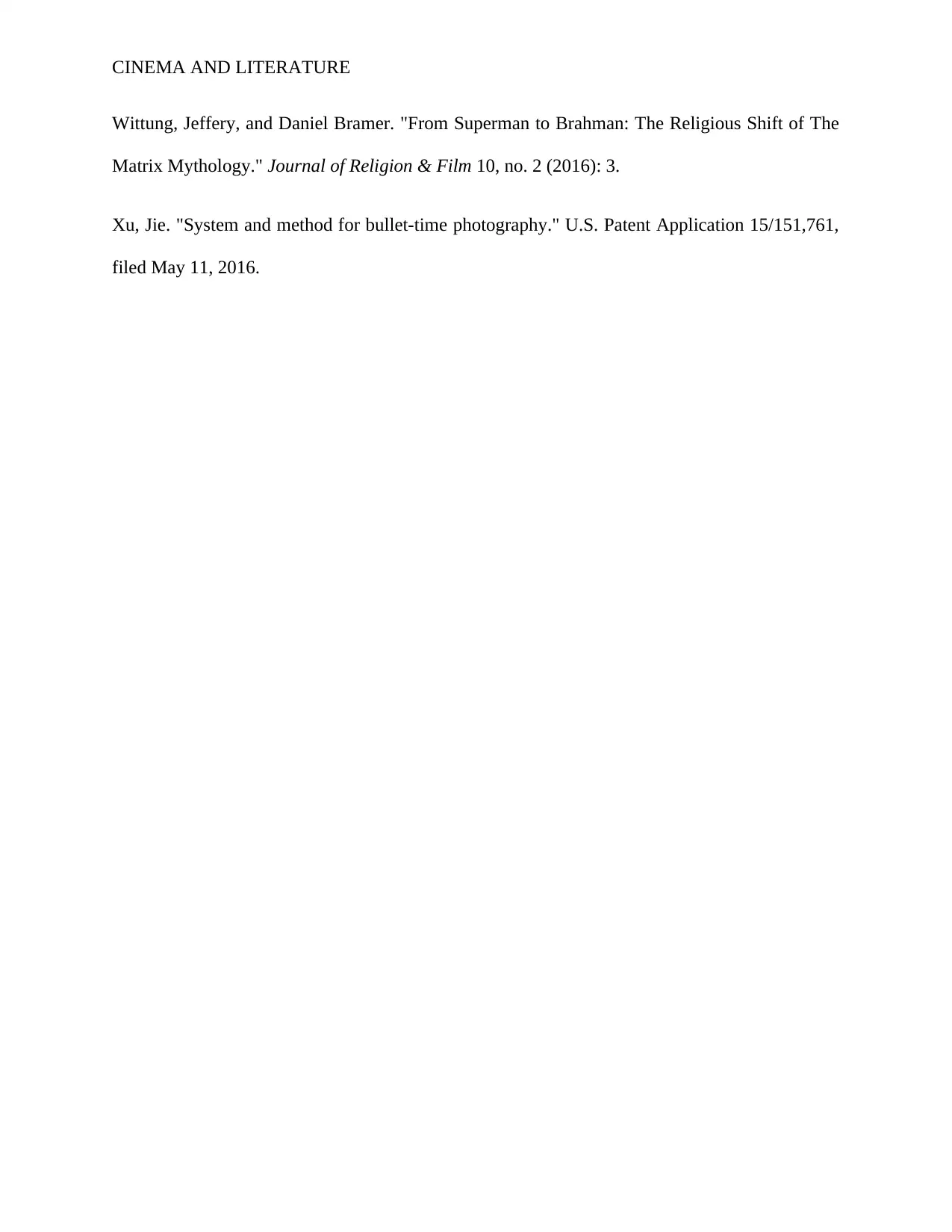
CINEMA AND LITERATURE
Wittung, Jeffery, and Daniel Bramer. "From Superman to Brahman: The Religious Shift of The
Matrix Mythology." Journal of Religion & Film 10, no. 2 (2016): 3.
Xu, Jie. "System and method for bullet-time photography." U.S. Patent Application 15/151,761,
filed May 11, 2016.
Wittung, Jeffery, and Daniel Bramer. "From Superman to Brahman: The Religious Shift of The
Matrix Mythology." Journal of Religion & Film 10, no. 2 (2016): 3.
Xu, Jie. "System and method for bullet-time photography." U.S. Patent Application 15/151,761,
filed May 11, 2016.
1 out of 39
Related Documents
Your All-in-One AI-Powered Toolkit for Academic Success.
+13062052269
info@desklib.com
Available 24*7 on WhatsApp / Email
![[object Object]](/_next/static/media/star-bottom.7253800d.svg)
Unlock your academic potential
© 2024 | Zucol Services PVT LTD | All rights reserved.